CurtainCall

Riva Helfond, Curtain Factory (1939)
"My purpose sleeps in the basement or beneath the neighbor's bushes."
I woke in the middle of my short night to crawl under the covers. Two hours later, I was crawling out into my morning, knowing I was crawling into an ending. I swear that I dread almost everything now, especially the inevitable. My Summer slips over a horizon foreshortened by low clouds and an utterly alien rain. The painting suspended for a day; I built my first fire of the season just to see that I hadn't lost that ability through the unrelenting Summer heat. When the turn comes, it shocks even the best-prepared, most anticipatory person, even the one who'd been counting down, even the one focused upon Honing.
It must not matter what topic I choose.
WritingSummary For The Week Ending 09/21/2023

Ryūryūkyo Shinsai:
Boy Writing (Edo period, 1615-1868)
Stumble Into An Ownership
Experience doesn't very deeply influence some things. This week, I almost finished my twenty-fifth series, Honing, but nothing I'd ever experienced before properly prepared me for this almost event. I should have become accustomed to nearly finishing by now, but it remains a shocking and unsettling experience, not even the same way once. I started this series thirteen weeks ago and struggled, as I always do, to feel as though it belonged to me. I created the first stories as an imposter, holding my breath while hoping not to be discovered. I grew into their author, only recently feeling as though they might somehow come from and belong to me. It was never different. I crawl before walking and walk before I fly. I finally fly only to discover that I've run out of sky. The allotted time for this series is over, and I dare not linger over the carcass. This is how this writer experiences accomplishment. I finally stumble into an ownership, only to forfeit it to start my mystery anew.
ExitStageLeft
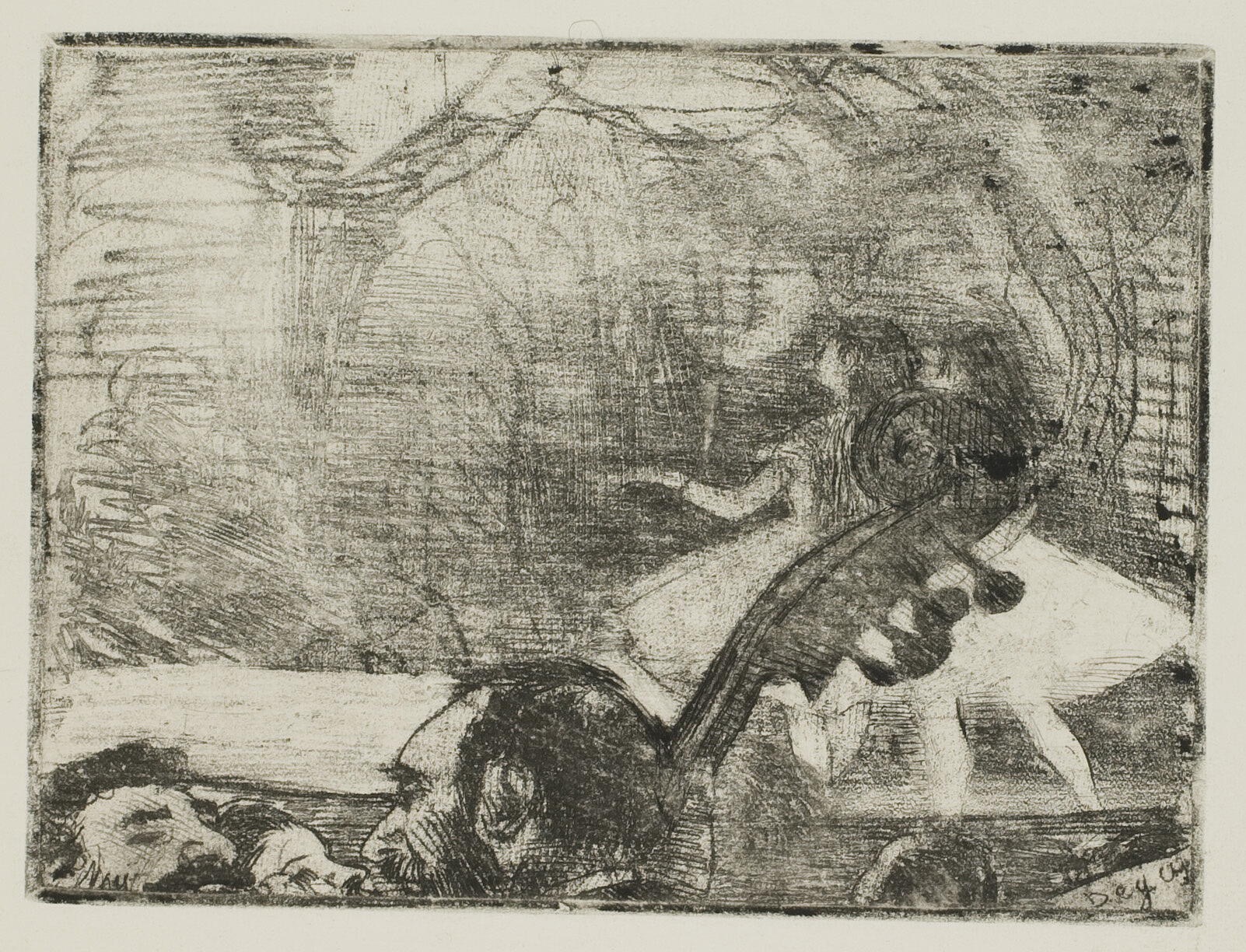
Edgar Degas: On Stage I (1876)
"All the world’s a stage,
And all the men and women merely players;
They have their exits and their entrances;
And one man in his time plays many parts,
His acts being seven ages."
—William Shakespeare
(from As You Like It, spoken by Jaques)
" … one final curtain call for this production that never actually was."
Contrary to popular misconception, all the world never was a stage, and all the men and women were always much more than "merely players." Yes, they might have their exits and entrances, but they do much more than just play parts in several acts. That's all analogies, and the one thing one must understand about analogies should always be that they do not describe actual anything. The fact that Shakespeare employed this analogy means precisely that all the world is not now, nor was it ever a stage. To think otherwise violates the first rule of analogy, which insists that they never be taken literally. We see the terrible result of mistaking analogy for description played out in the world's great religions, each of which seems to possess a widely misinterpreted guidebook. While it's undoubtedly true that misinterpreting makes miracles much easier to manifest, they also materially mislead. Misinterpreting brings glorious suggestions into the realm of misleading definitions where an analogous savior somehow manages to feed a multitude with a single small can of tuna.
How much richer our lives might become if we could steadfastly refuse to take anything literally, anything at its unavoidably misleading face value.
UsedTos

Rembrandt van Rijn:
The Sampling Officials of the Amsterdam Drapers’ Guild,
Known as ‘The Syndics’ (1662)
"I UsedTo be an innocent, but now I'm more experienced."
I possess a long and ever-growing list of UsedTos: things I used to do, beliefs I once held but outgrew, foods I once treasured but now consider illegal, and assorted discarded habits, vices, attractions, loves, and hates. I like to think that my tastes have moderated over time, that my sophistication has been steadily climbing some evolutionary ladder, but that's probably idle chatter, my monkey mind keeping me distracted and entertained. I still declare several of my UsedTos as remaining on my list of current skills, though I'm surely out of practice on many. I was once successful, for instance, but it's been ages since my successes or failures have influenced my choices. I no longer strive after achievement. I put down my head and continue onward instead.
The purposeful life isn't all it was once cracked up to be.
Estrangement
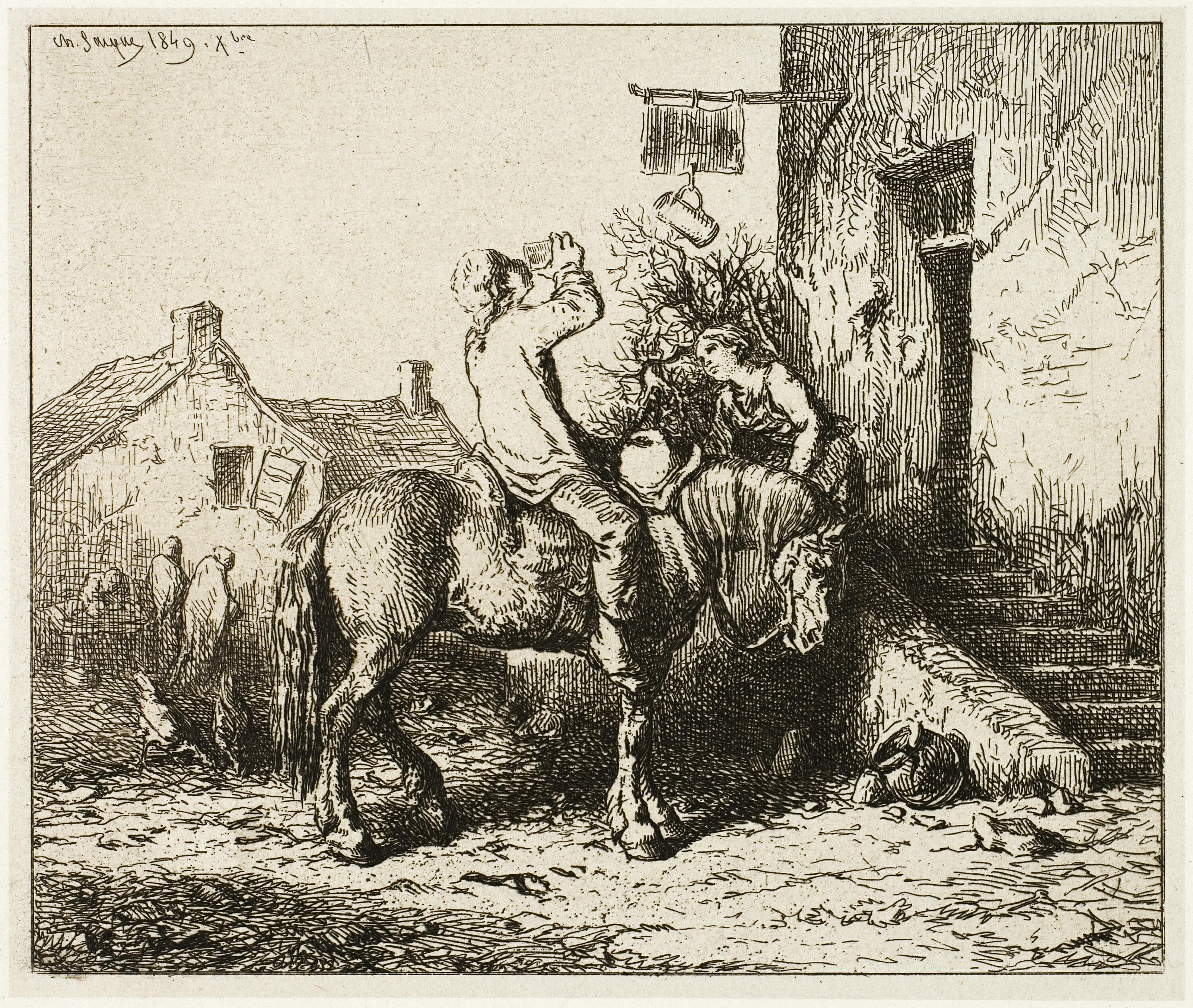
Charles Émile Jacque:
Entrance to an Inn, with Peasant Drinking (1849)
"We remain related regardless …"
What can I say about Estrangement? It seems the strangest form of human engagement, for it can only exist between people who were once rather tightly connected. Strangers can never become estranged; only friends and family can. Usually, something happens or was said to occur before becoming a legend, a defining event, or a Rubicon crossed. The memory might have never captured the offense, but it will never forget the occurrence. Over time, the relationship will seem irreparable, and the principles involved accept this and move on. "On to where?" might be the operant question. It might have seemed slight to one of the parties, but the effect will become tectonic for both. An absence appears by mutual consent, and people move on with their lives, disappointed with how that one point turned out, yet powerless to make it different. The experience gets filed under Regrets but will never be understood in the same way or entirely forgotten by either party.
We read of Prodigal Sons and more distant relatives reconnecting after lengthy separations.
Reading

Édouard Manet: Woman Reading (1880/81)
" … successful distraction might disrupt anything, even distraction itself."
I am a cog in an enormous machine every bit as threatening as the much-feared Military-Industrial Complex. I might label mine The Non-Military Conscientious-Objector Complex because of my background with the military draft, though my complex has little to do with military matters. Mine's all about conscience, conscientiousness, and consciousness, three similar words with enormously different meanings. These three terms share at least one thing in common, which might be, without stretching their native definitions or attempting to create controversy or conspiracy, Reading. I read because it's always the right thing to do. I can never go astray if I'm reading. I also read so that I might live well. I believe it's impossible to live well unless surrounded by books. I also read to achieve the awareness required to comprehend this life. I consider it my moral and civil duty to at least try to remain literarily current.
My occupation feeds this machine.
Betterment
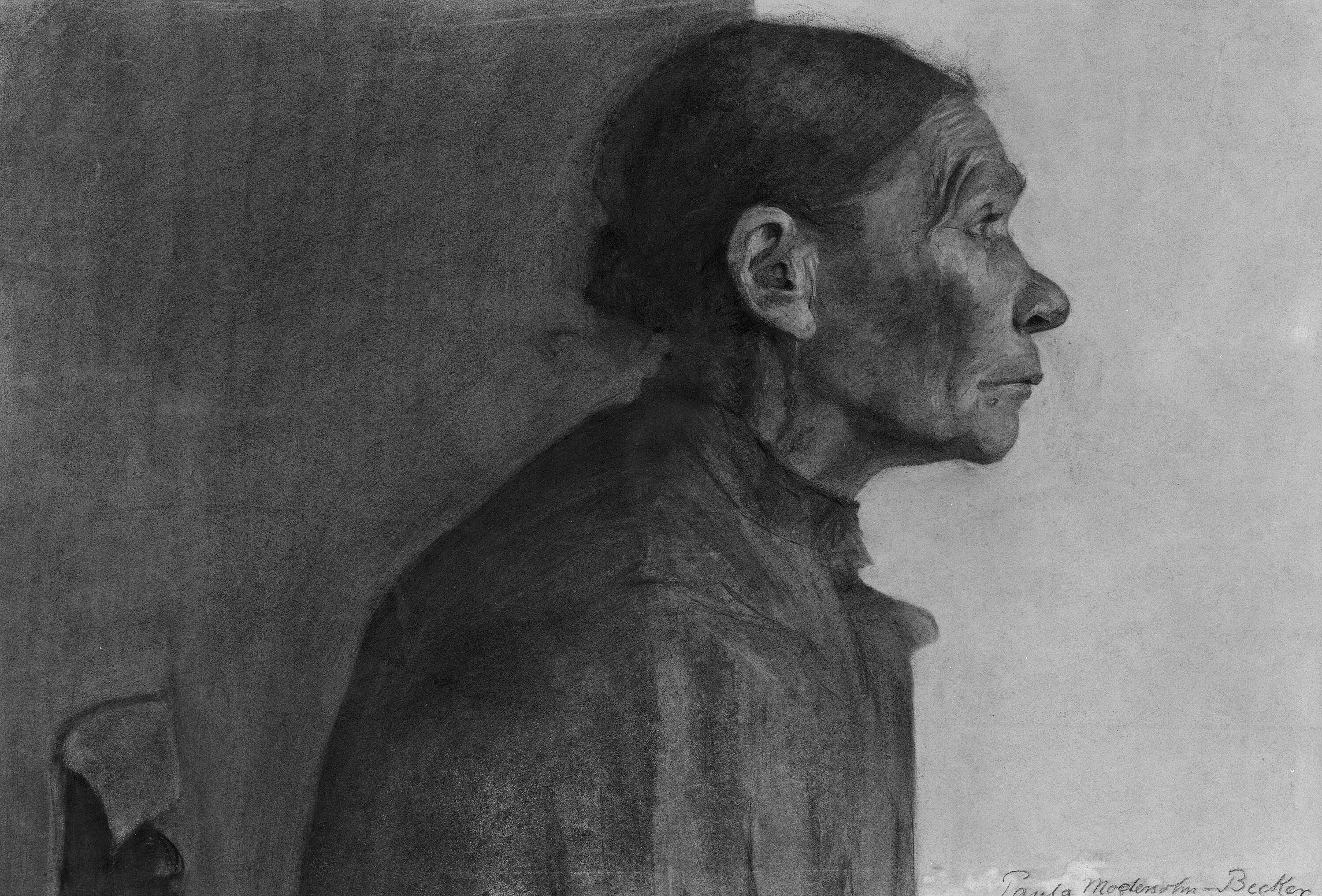
Paula Modersohn-Becker:
Portrait of a Peasant Woman (1898/99)
"I've written plenty, but that only matters if I'm still writing."
I began writing these stories to prove something to myself. I intended them to serve as a dedication test, proof that I was, as I believed myself to be, a writer because writers don't just declare their profession; they write. If they pursue commercial success, writers must also publish; indeed, those might well budget more time for promotion than production. Most writers were never published, for they created for purposes other than publication. We believe that the system set up to identify and distribute the best writing succeeds in achieving that end. Still, we have no way to verify that this is or ever was the case, for the stuff the system failed to identify was never included in the assessment and couldn't have been. In Dicken's time, for instance, it seems entirely possible that a few dozen scribblers produced novels immeasurably better than anything he ever imagined. However, for one reason or another, they never found a publisher or any means of distribution. Their neighbors might have seen those authors as eccentrics, perhaps even hermits; they maybe even became the butt of ungenerous stories about how they only thought of themselves as writers. Only the writers themselves ever knew the truth. If they wrote, they were writers.
I long ago proved the point of my experiment.
ReConsidering Reconsidering Again

studio of Rembrandt van Rijn:
A Bearded Man Wearing a Hat (c. 1655–1660)
" … without any meaningful answer."
Each quarter, at more or less precisely this time, as the final writing week of a series begins, I face a reconsidering again. After twenty-six repetitions, the reconsidering must have at least become a tradition. It seems necessary, though, to slow down in the face of completing to solemnly consider whether this pattern continues to be worth continuing. The question seems more significant than any answer it might inspire, for by now, I might just as well presume I know the answer heading into the pattern. I do not ask my question to produce a novel response, but to attain reassurance that my answer still holds relevance, that it remains capable of motivating, of promising to satisfy if not every day prove satisfying. I play a longer game than I can ever sense, so I must engage with belief each morning that the long run will still take care of itself.
I am ending my twenty-sixth series since I started producing daily stories.
BetterStory
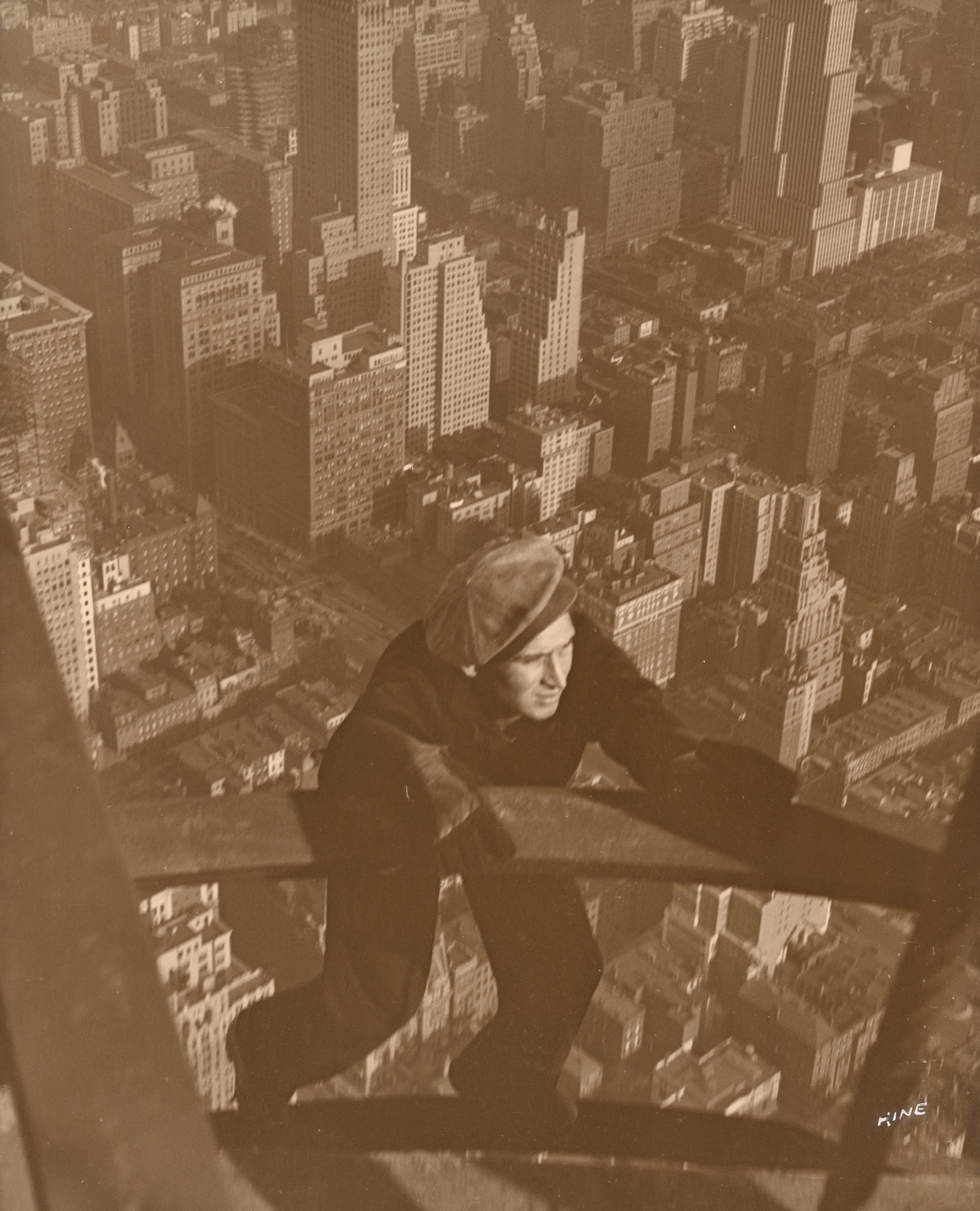
Lewis Wickes Hine: Climbing up the Beams on the Empire State-100 Stories Up (1931)
" … it will only be my legacy."
I have lately encountered several people who seem to be living disappointing stories. They serve as complainants in their own lives, disgruntled by their plotlines. I wonder why they chose to feature those stories, ones which seemed especially designed to disappoint them when they might have chosen any of a nearly infinite array of more satisfying ones. I didn't ask any of them that question, and I suspect, without testing my suspicion, that few of them would offer an easy or appreciative response.
What about reality?
WritingSummary For The Week Ending 09/14/2023
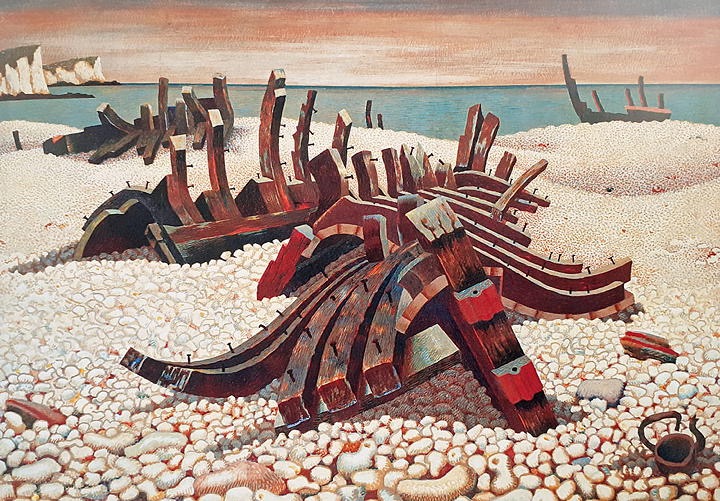
Edward Wadsworth: Requiescat (1940)
After The Physical Experience Ends
My weekly writing summaries serve as both reminiscence and discovery. I inevitably discover insights that hadn't connected through the week before I paused to reflect. This might be the highest best purpose of reflection, that it sometimes elevates experience into insight. We move through our lives as innocents—ignorants—only understanding later, often after it's too late to make any difference. We sit, then, wondering how our experience might have felt different had we understood before we stumbled into the associated insight. Experience never ends at the apparent end of the experience. The ending lags at least a few beats beyond where the incoming ceases. Without reflection, the sensory experiences, even the lived experiences, make little sense. The meaning emerges shortly (or longly) after the physical experience ends. Better, probably, when we can acknowledge this difference.
Weekly Writing Summary
I began my writing week by reprising a posting from July, 2022 about Sleep "I realize I'm a lousy sleeper. I never aspired to become any better at it than I've become. Indeed, my current lack of skill represents a lifetime of focused practice, the payoff, not an absence."
—
I admitted to an introvertion preference and described the effect of too much extroversion as ExtroversionPoisoning. This story proved the most popular this period. "I sometimes feel after over-extended exposure that I'm suffocating and can hardly continue breathing. These times alarm me most, for the weight of the world presses down upon my chest, and I simply must find respite. I will decline your invitations then and avoid promising to attend. I will not attempt to be anybody's friend, for I must befriend myself again before I can be anybody else's credible companion."
—
I wondered if I overthink as much as I think I overthink in OverThinking. "It seems a genuine wonder to me when I successfully complete anything. After working my way through a hazy half-dozen scenarios, each demonstrating how I could not possibly succeed, the most unlikely result always, always, always shocks and surprises me. I wonder then if I really do overthink as much as I think I do or if the accompanying rigamarole might just be necessary for me to get begun and then get through anything to done."
—
I experienced a familiar scenario this week so I wrote a story about its substance, Idiot-Making. "We seem to be, as a species, very skilled at Idiot-Making. We can transform virtually anyone into an idiot by merely less than generously interpreting their performance."
—
I posted a curious story about the DangerousPlaces I inhabit. "Cynicism happens when life wounds an optimist, innocence disappoints, and a certain kind of ignorance takes preference. Cynicism produces self-inflicted first-degree knife wounds that seem to be the devil's own work to heal."
—
I reported on a delightful rediscovery, that my life's work apparently resides in weeding and manuscriopt-making in SafeHavens. "I felt surrounded by so much familiar that I lost that sense of alienation my wildly fecund prior month had induced. I felt fully re-immersed in my most treasured SafeHavens, writing and weeding. The world could go to Hell, though I'd miss it terribly. I was temporarily suspended in the space intended for me, manuscript-making and weeding, two seasonal rewards there for the taking."
—
I ended my writing week trying to describe an alien form of organization and operation, one I quietly envied when I encounter it in IndustrialCivility. "They do not possess a prestigious address, nor do they ever care to. They know what they do, and they do that well. There's no identity crisis or search for deeper meaning. The operation is just what it seems to be, no questions asked. "
—
This writing week felt like a roller-coaster ride. I began by reprising something I'd written fourteen months before. This felt like both an abrogation—what? Nothing original this morning?—and an acknowledgment and recognition that I needn't necessarily reinvent what I've already adequately considered. I honored my past by making it present again. I acknowledged the cost of fulfilling obligations and over-extending myself with ExtroversionPoisoning. I wondered if I really was that guilty of OverThinking. This question, of course, needed no answering. I encountered some vehement Idiot-Making where I was the idiot again. I admitted to living in proximity to DangerousPlaces, which doesn't make me even a little bit different or unique. I then described my protective SafeHavens. I ended this writing week admitting a tinge of jealousy for a subculture I've never personally experienced, but to which I still feel an attraction. Thank you for following along. It looks like we're finally entering the final week of Honing Stories.
©2023 by David A. Schmaltz - all rights reserved
IndustrialCivility
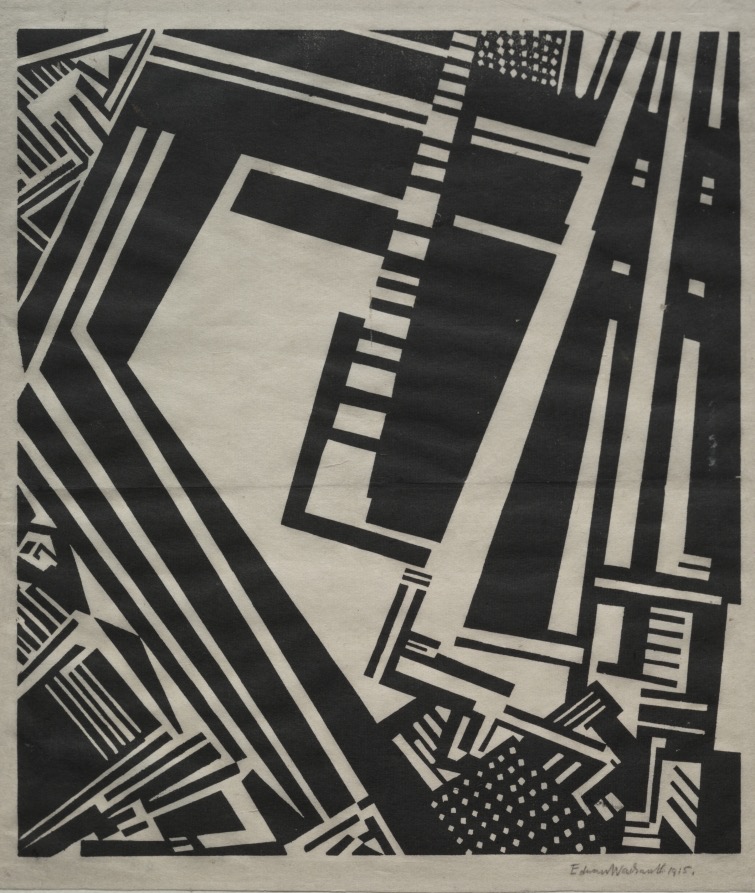
Edward Alexander Wadsworth: Illustration (Typhoon) (1914–1915)
" … people like me can only ever be a visitor. "
We inhabit a culture comprised of innumerable subcultures, each with unique rules and protocols. These subcultures might be the many we claim to come out of, E Pluribus Unum. Encountering any subculture can make anyone more aware of their own, which ordinarily exists like a fish's water, present but not accounted for. We receive little more than glimpses of other's subcultures, often through cues that seem somehow alien, different. I recently encountered one that I found enduring, heartwarming. I labeled it IndustrialCivility because it appeared to me, in my experience, most prevalent in industrial settings, a standard set of protocols common to those enterprises. These seem starkly different than the practices I've experienced in offices, for instance, or in clinics.
IndustrialCivility first appears orderly with almost a military discipline.
SafeHavens
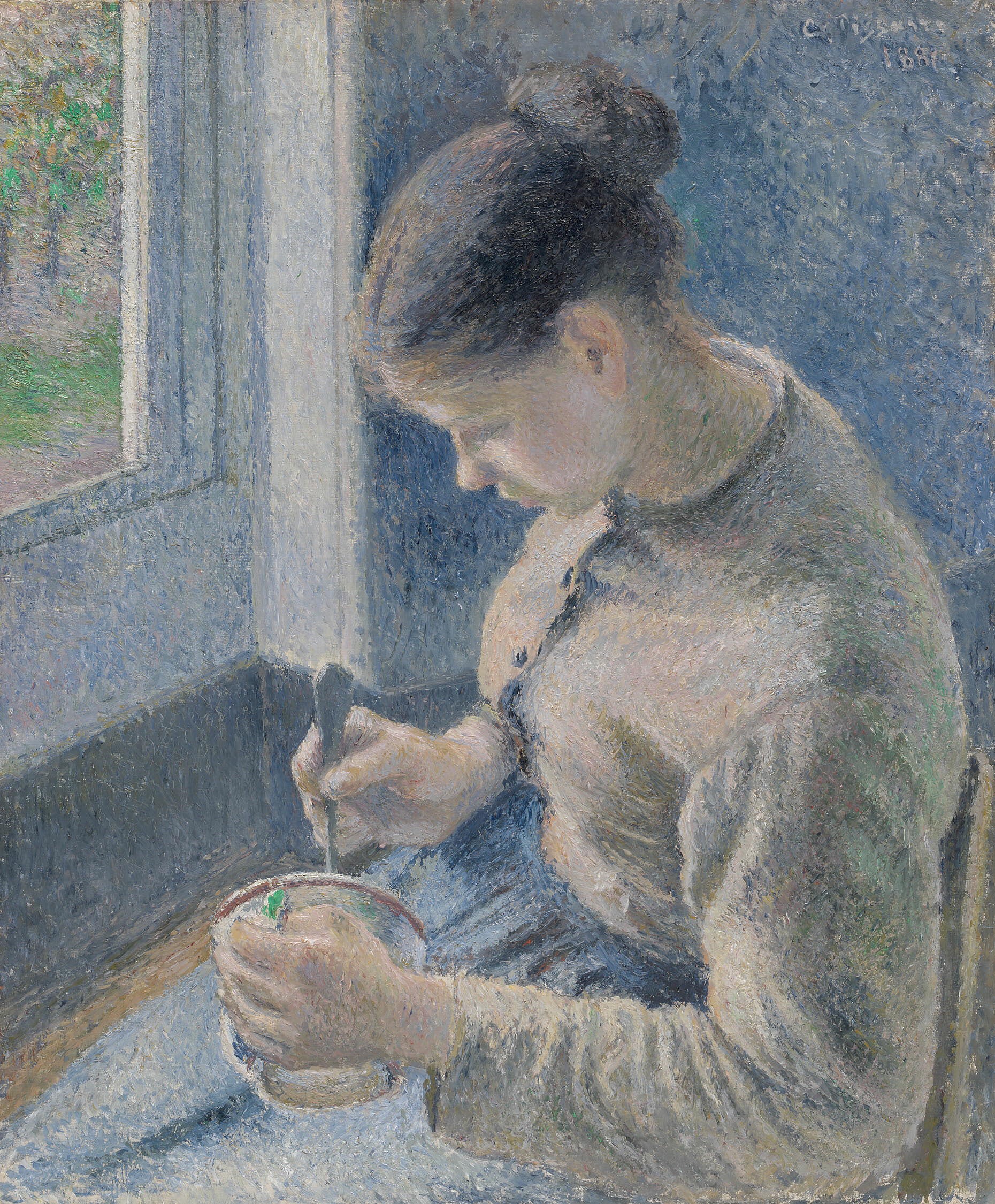
Camille Pissarro: Young Peasant Having Her Coffee (1881)
"… rewards there for the taking."
The hapless homeowner faces a fecund entropy through the month following mid-August. The garden's finally producing and achieving exponential returns. The Eurasian Stinkbugs find their prey, too, and threaten to spoil The Muse's long-awaited tomato party as well as the rhubarb. Weeds take full advantage of the often frantic watering as humidity levels plummet to the lowest of the year while solar radiation threatens to burn everything in place. It's usually a frenetic pace, a plate-juggling class of fruitless efforts. Self-esteem plummets in the face of overwhelming opposition to the regular rules of order. Fertility leads to pregnancy and pregnancy to a disruptive addition to the family. I struggle to fulfill my resulting unintended obligations.
I think of our Villa Vatta Schmaltz as one of our SafeHavens, a secure spot within the chaos.
DangerousPlaces
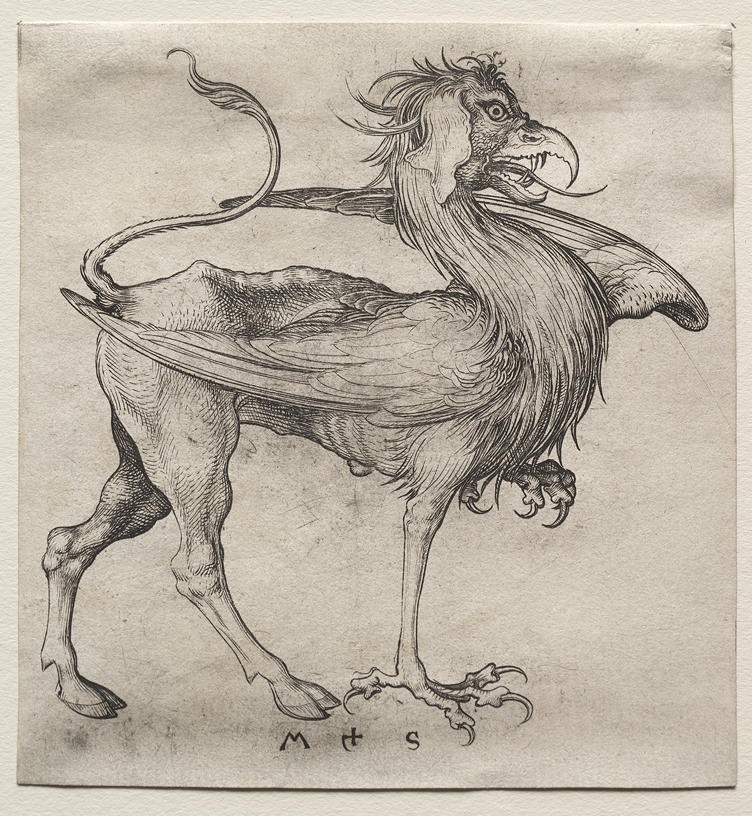
Martin Schongauer: The Griffin (c. 1480–90)
" … some days seem to need almost the whole day to recover …"
I often forget about the DangerousPlaces my work compels me into. I engage almost blithely, innocently exploring when I might more thoughtfully engage. I consider my manner of engaging anything but calloused, for I firmly believe that one must never become cynical. I hold myself to knowing enough to justify cynicism but choosing not to become cynical as my way to get even or stay balanced. This sometimes works. Cynicism happens when life wounds an optimist, innocence disappoints, and a certain kind of ignorance takes preference. Cynicism produces self-inflicted first-degree knife wounds that seem to be the devil's own work to heal. Better to become a Griffin's dinner than to live a cynical existence.
These DangerousPlaces sometimes deeply wound me.
Idiot-Making
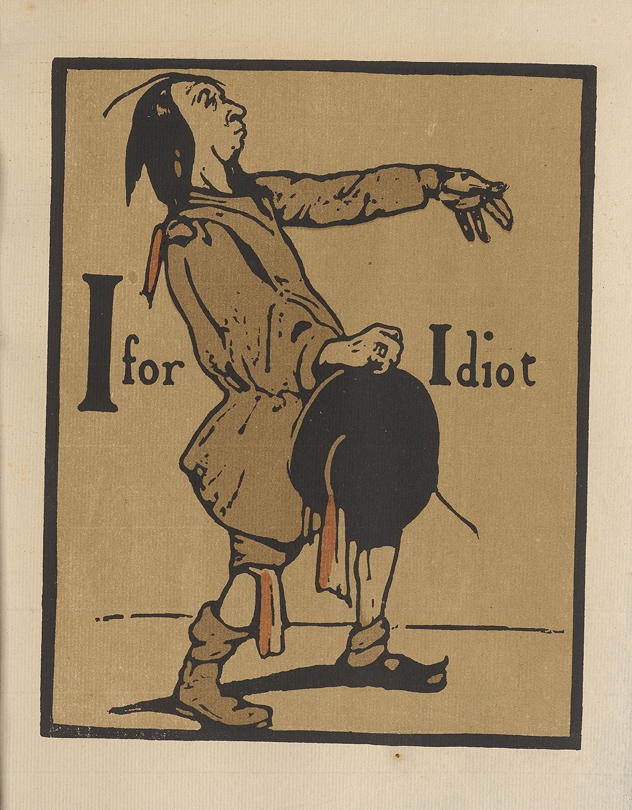
William Nicholson: I for Idiot (1898)
"What I choose to do in that moment always defines the outcome of my effort."
When contracting for consulting work, I'd usually confide to my prospective client that if we agreed to terms, at some point during the following engagement, he would find himself convinced that he had hired a complete idiot as a consultant. I suggested that what we chose to do then would define the effort's success. This prediction usually came true, not because I possess any particular foresight but because it was in the nature of the sort of work I contracted to perform that I would usually appear to be an idiot if I performed well. I would not always seem capable of foreseeing because what I would be doing could not be foreseen but always needed to be prized out, discovered in stream, and not usually beforehand. It was more hunt-and-peck work that the less experienced invariably attempted to manage utilizing prior specification, a sure and certain recipe for the appearance of idiocy at some time during the proceedings.
We seem to be, as a species, very skilled at Idiot-Making.
ExtroversionPoisoning
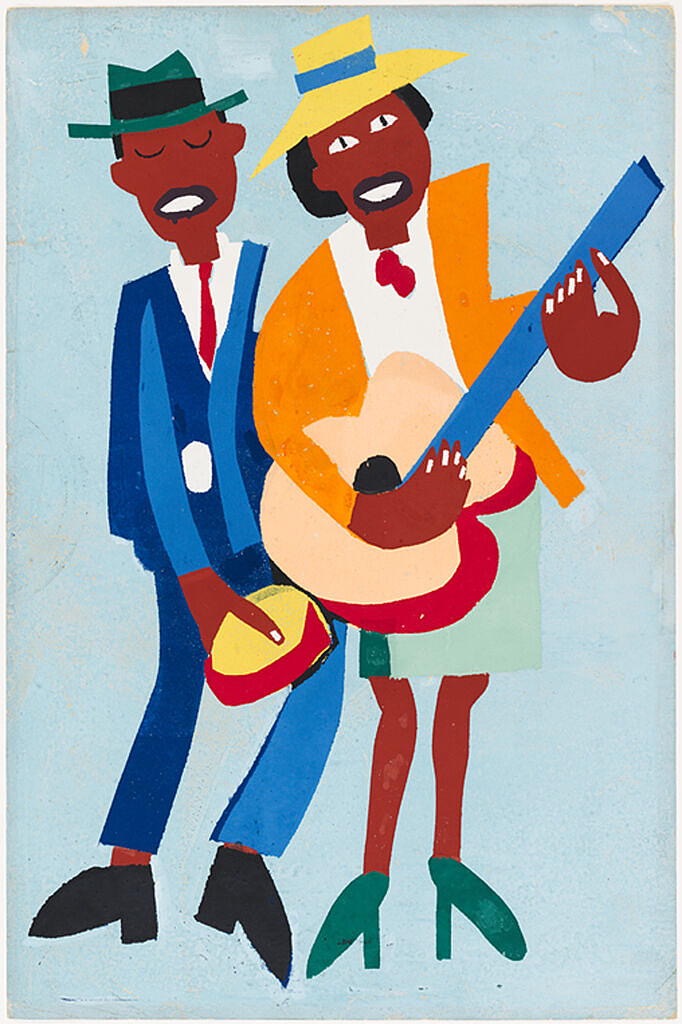
William Henry Johnson: The Blind Singer (c 1945)
" … I must befriend myself again …"
I "am" an introvert. This improper way to describe my preference ignores the fact the introversion/extroversion dichotomy does not express identity but preference. I remain capable of both extroverted activities as well as my more native introverted ones. The extroverted efforts seem to take more significant tolls, though. I can always engage as an introvert for extended periods without requiring any mental health break from the activity. I do not remember ever even once needing an extroversion break, where I felt compelled to find someone to spill my guts to so that I could maintain some internal balance. I often, though, flee into any handy old cave to recover from too much interaction, a condition I refer to as ExtroversionPoisoning.
Sometimes, I seem to become altogether too much of this world.
WritingSummary For The Week Ending 09/07/2023
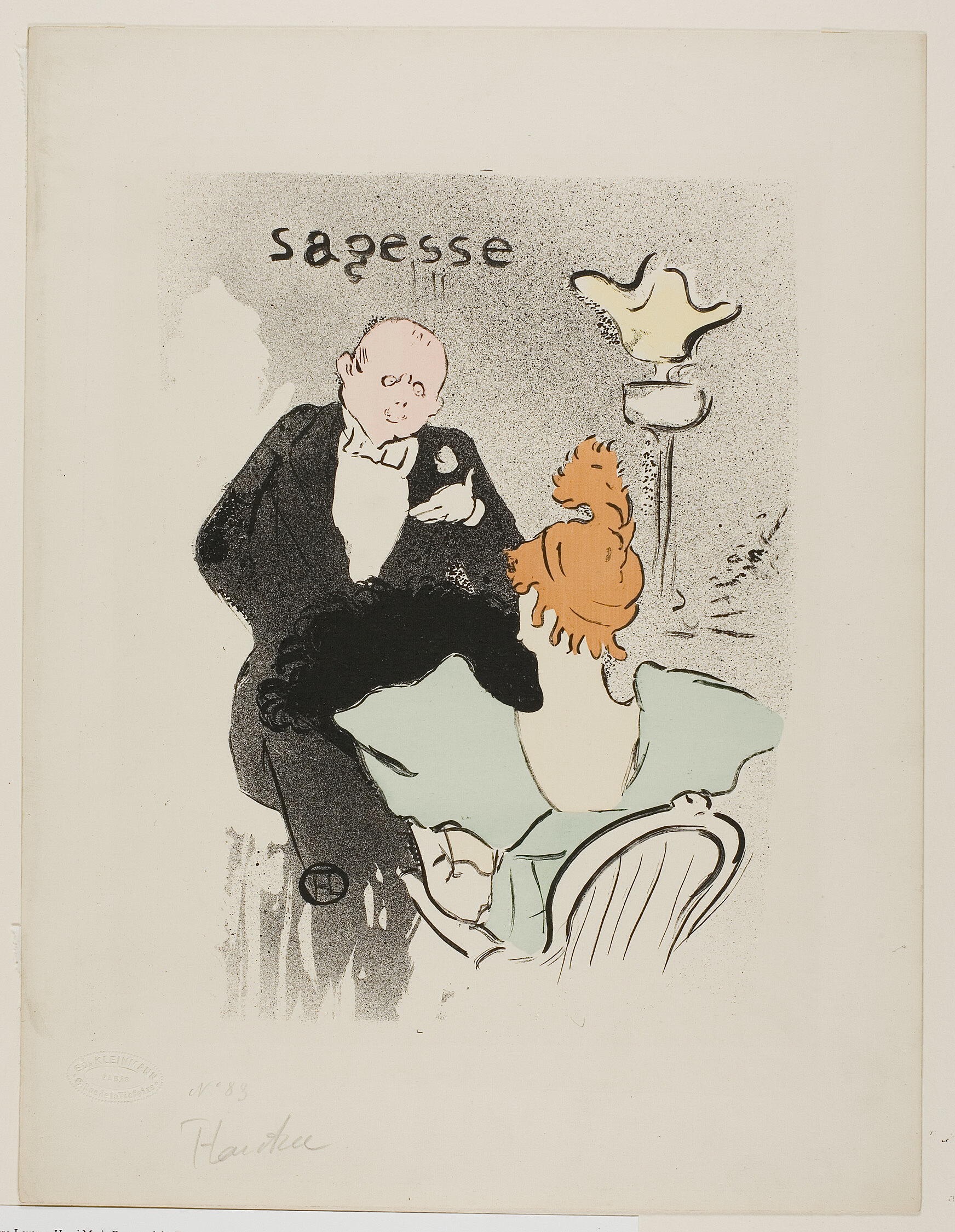
Henri de Toulouse-Lautrec: Wisdom (1893)
Not Letting My Reticence Chase You Off
The Muse insists that I and the world are inevitably better off when I get out and mingle in the world. I tend to disagree on principles. As an introvert, my world revolves around something other than public spectacle, but I cannot successfully disagree that more variety appears when I get off my duff and mingle. Her candidate booth at the local fair, as well as her entry into the accompanying parade, had me living well outside my usual comfort zone through almost this entire writing week. I didn't die. I might have even thrived. I might admit under mild duress that I, at times, even almost enjoyed the engagements, but mum's the word on that account. I remain a writer, your writer, and not some itinerant schmoozer. I'm the guy who appreciates those with social skills, who gratefully cedes center stage to those who seem to gain satisfaction from standing there. I'm atmosphere people, more than satisfied to chronicle my emotional experiences via the PureSchmaltz. Thank you so very much for following along and not letting my reticence chase you off.
Weekly Writing Summary
I began this writing week with an encounter with bureaucracy that left me feeling absolutely Gutted.
Disconceptions
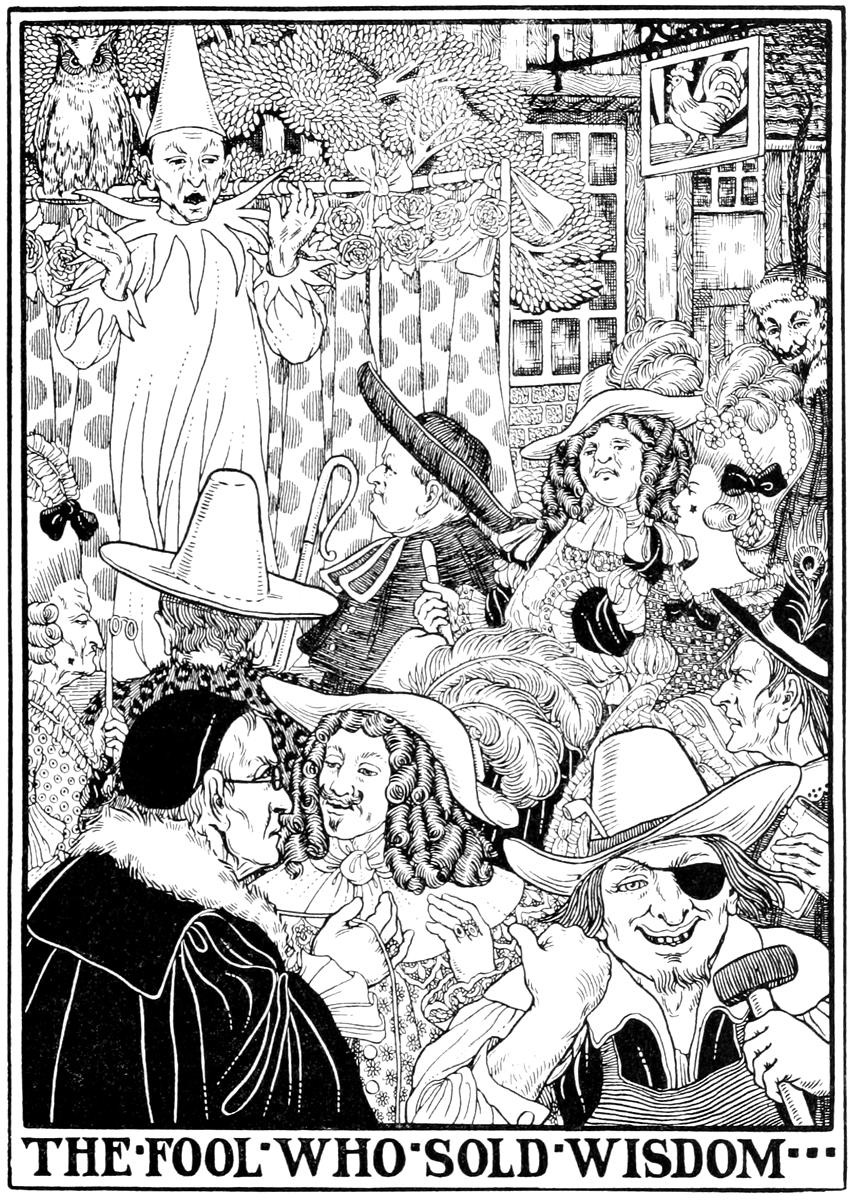
Percy Billinghurst:
The Fool Who Sold Wisdom (1900)
“ … a particular sort of Hell.”
My time in The Muse's Fair booth unsettled me. I saw an alarming erosion of conception before me as I spoke with some people. They possessed what they might accept as received wisdom, which seemed more like bullshit. I wondered how these people could each spout the same nonsense. I wondered about the source of their understanding, for it appeared unusually unshakeable. It reflected an apparently preconscious conviction that they possessed a wisdom denied their lesser brethren. I felt them suspiciously classifying me, passing me a sort of test to determine if I was one of them or one of those. I never once aspired for them to classify me as one of them in any of these conversations, but then I was also dancing along an edge because I didn't want to chase off any potential voters for The Muse.
Friends told me that these folks were victims of Fox News, an outlet I cannot get since The Muse disabled the remote control to ignore those channels.
Last_Night
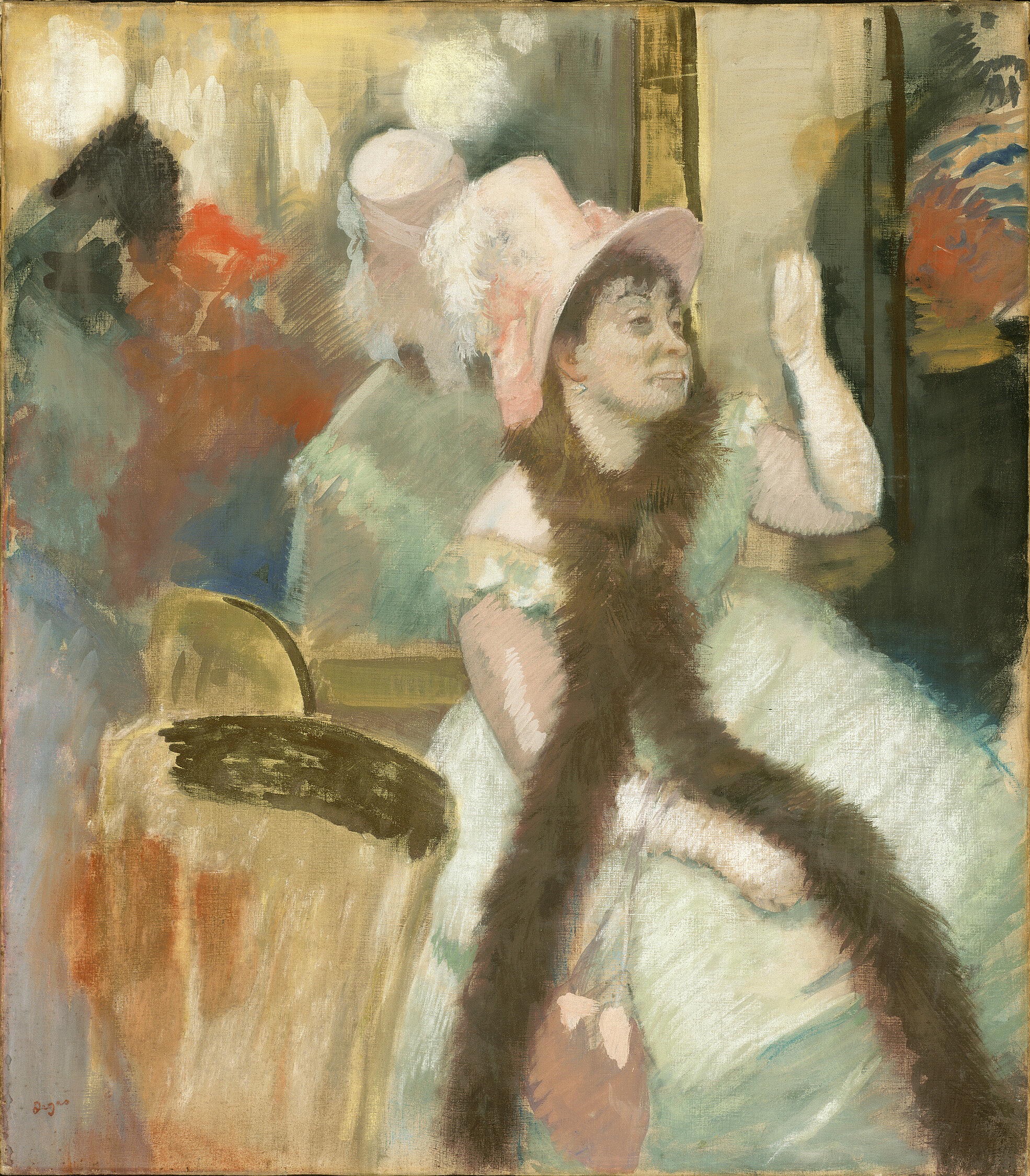
Edgar Degas: Portrait after a Costume Ball
(Portrait of Madame Dietz-Monnin) (1879)
"May we always remember."
Every exhibitor finally figures out their trade on the last night of the Fair. The five long days before were merely practice for this grand finale performance. By five pm, everyone's walking around like zombies, the unavoidable effect of back-to-back-to-back-to-back twelve-hour days standing on unforgiving concrete or sitting in equally torturous folding chairs. Each became a master of their wares by repetition. The come-on tried a dozen ways before finally settling on one that reliably worked. Still, more strolled by than lingered, but those who lingered on the Last_Night stayed a little longer. Everyone knows full well that this show's just about through, and most seem to want to savor its presence while that's still possible.
We've come to know those showing around us.
FlatWrong

Egyptian: Plaque Depicting a Quail Chick
(Ptolemaic Period [332–30 BCE])
" … never any different from antiquity to present."
There's wrong, and then there's FlatWrong. Wrong tends to be a run-of-the-mill error, while FlatWrong catches the perpetrator by complete surprise. Wrong might surprise, too, but it carries little consequence. Wrong turns almost always seem easily corrected. Even taking that wrong freeway out of Lexington, Kentucky, without discovering my error for over an hour resulted only in a different route home. I couldn't turn around without adding another hour to a trip I'd already lengthened by about an hour, so that error produced a plot twist of little consequence. FlatWrong cannot usually be undone. It's an unintended center stage pratfall on opening night. There's no undoing that sort of performance.
The truth's out, then.
TheSchmoozeAlarm
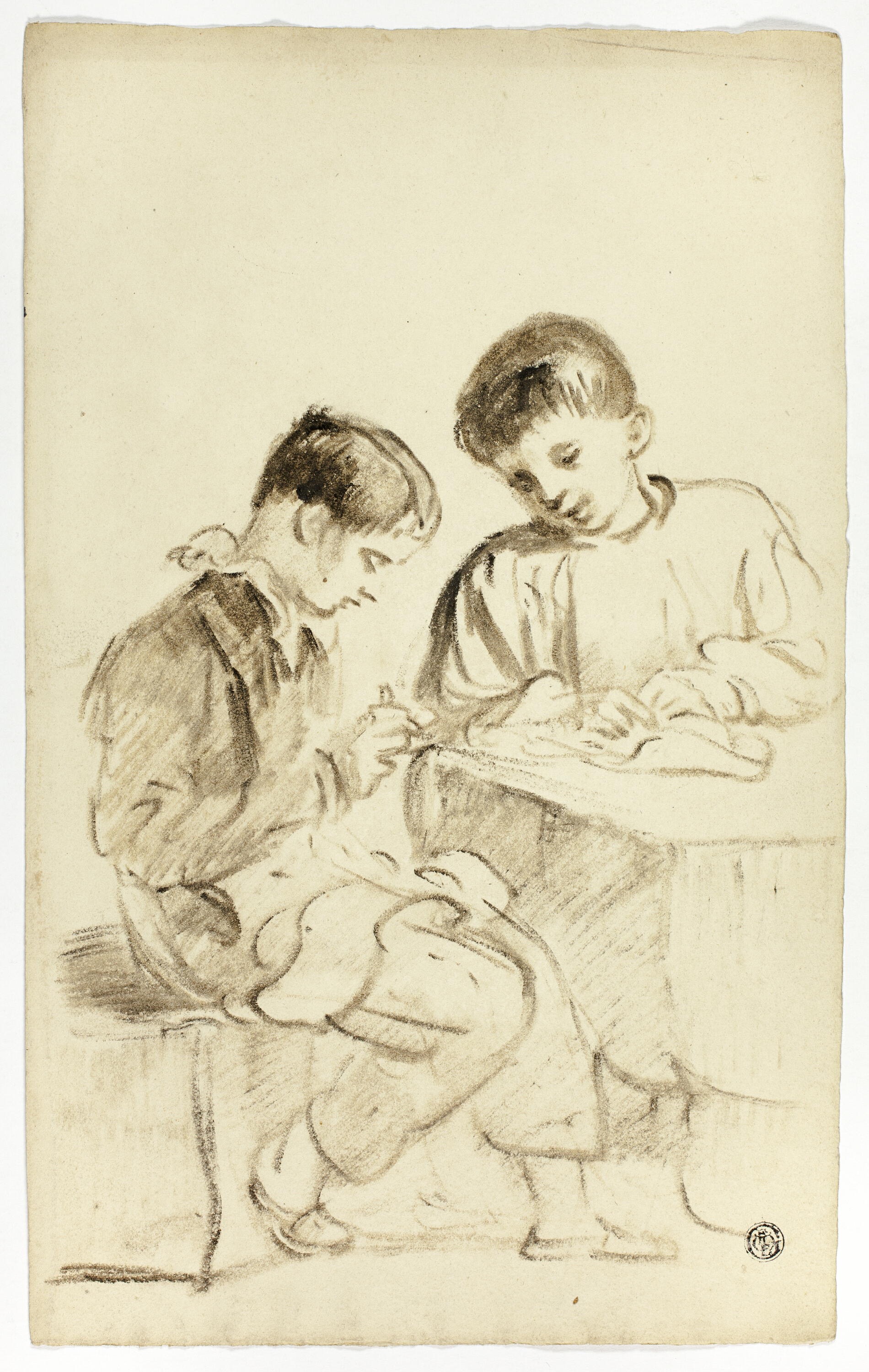
Thomas Jones Barker: Two School Boys (c. 1830)
Schmooze: To converse informally, make small talk or chat (שמועסן, shmuesn, 'converse', from Hebrew: שמועות, shəmūʿōth, 'reports/gossip'; OED, MW). Noun: schmoozer, abbr. schmooze. Wikipedia
"Blessed are the Schmoozers …"
We're each familiar with the snooze alarm, that feature of modern alarm clocks that allows us to temporarily turn off an alarm clock without actually waking, setting up an unconscious response cycle destined to undermine the very intention of setting the alarm. I would count this invention as one of humanity's peak innovations, for it reliably achieves the opposite of its designer's intentions before going on to be in almost ubiquitous use. Everyone has one, and everyone learns to sleep right through it. The very term Snooze Alarm has come to describe where an explanation further confuses and where an excuse convinces otherwise. No salesperson or pitchman wants to "hit The Snooze Alarm" when attempting to persuade. No politician does, either.
A friend running for office might be what anyone might call a wonk, a person so enthused by his knowledge about a subject that he can almost instantly chase anyone else off by just starting an explanation.
Roe-Day-O
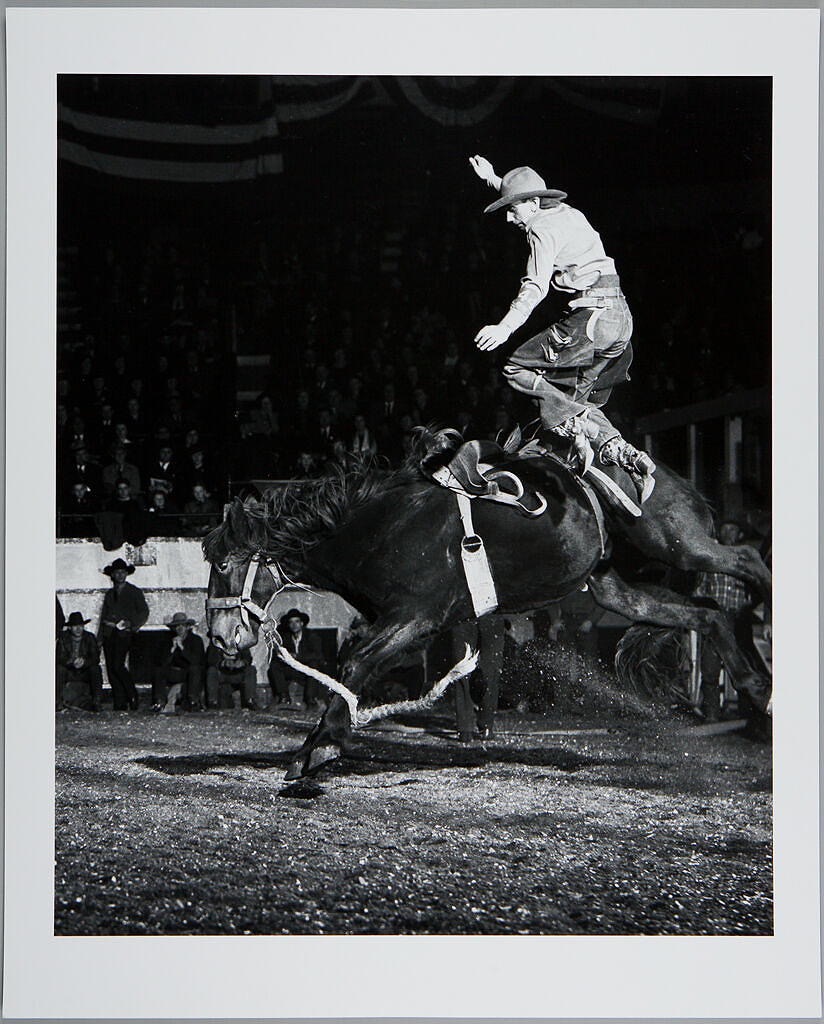
Harold Edgerton: Rodeo (1940)
"Who or what was never made explicit."
I'd never been. I'd never attended the rodeo part in the sixty-some years since I first attended The Southeastern Washington Fair and Rodeo. It required an additional admission, and I had no particular interest. The Fair had also featured parimutuel horse racing, something for which I possessed neither curiosity nor inclination, so my birth family and I satisfied ourselves with the offerings on the Fair side of the fairgrounds: the midway, rides, animal barns, and 4-'achie entries, massive ice cream bars, and, of course, the Dippy Dogs, the local variation on corn dogs, and turkey legs. We'd see the fair queens in the parade and witness loads of cowboys, even some with cattle as well as hat, but we were never once tempted to enter into that world, even as witnesses. Never once until last night, that is.
Friends offered us loge seats in one of the newly-constructed platform boxes suspended above the chutes on the opposite side of the arena.
RealPolitic
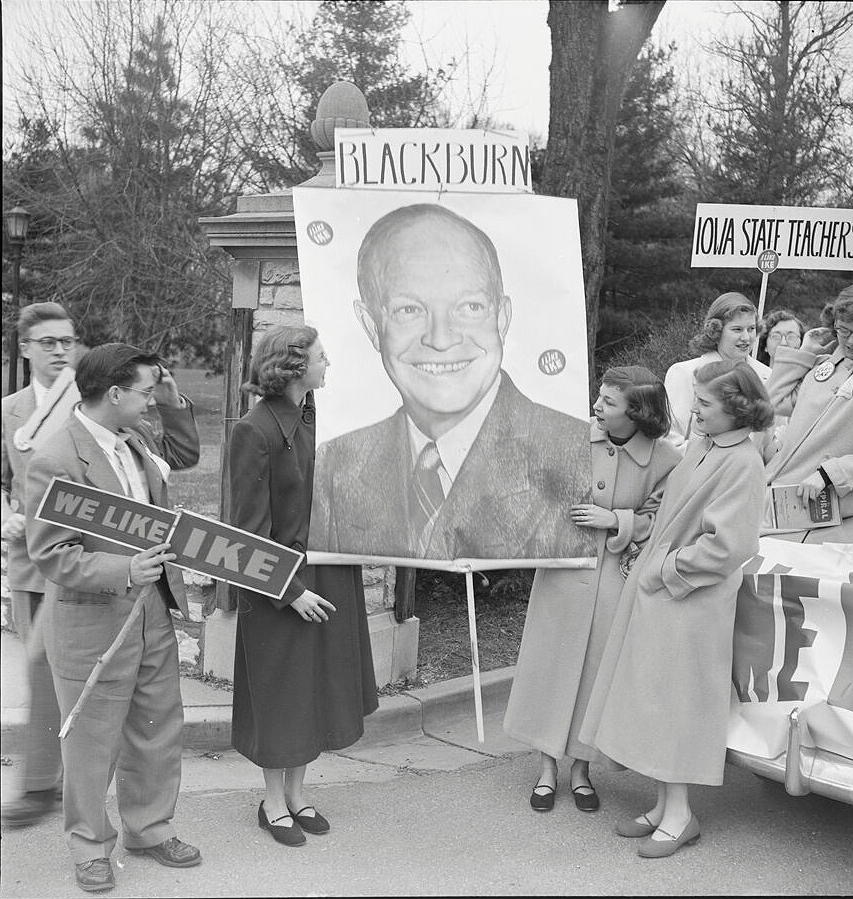
Jack Gould:
Untitled [several people holding political posters
and signs at mock convention] (1955)
The Muse works the passing crowd. The Pavilion at the Fair serves as its Grand Central Station. Families move through the aisles, stopping at booths to collect free handouts and enter raffles. One booth offers a free set of Bluetooth speakers; another, eternal salvation. The politicians do not dominate this space, though they are present: a city council candidate and The Muse, candidate for an open position on the local Port commission. I swear she can pull almost anyone in for at least a brief conversation—many last much longer as she makes some personal connection with the potential voter.
She starts with The Question, the qualifying question intended to winnow out those who cannot vote for her. "Are you a voter in this county?"
Gutted
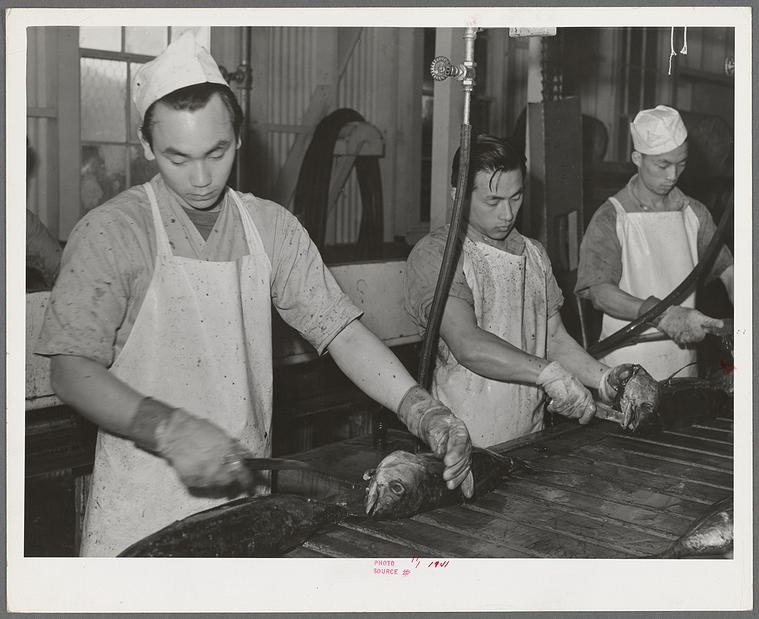
Russell Lee:
Gutting tuna at the
Columbia River Packing Association.
Astoria, Oregon (1941)
"It would have just been my fault."
——
The Frog
Be kind and tender to the Frog,
And do not call him names,
As ‘Slimy skin,’ or ‘Polly-wog,’
Or likewise ‘Ugly James,’
Or ‘Gape-a-grin,’ or ‘Toad-gone-wrong,’
Or ‘Billy Bandy-knees’:
The Frog is justly sensitive
To epithets like these.
No animal will more repay
A treatment kind and fair;
At least so lonely people say
Who keep a frog (and, by the way,
They are extremely rare).
HILAIRE BELLOC
—
I arrived at the Fairgrounds just after eight a.m.
Slip over here for more ...WritingSummary For The Week Ending 08/31/2023
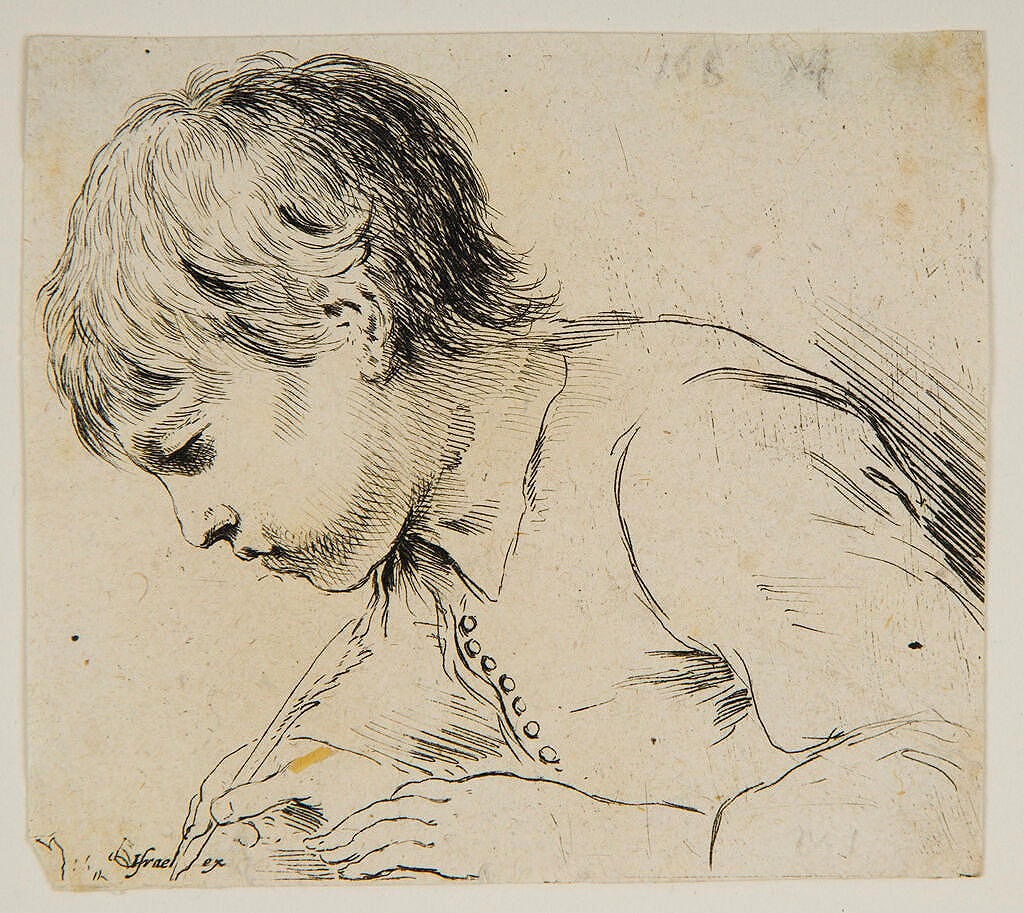
Stefano Della Bella: Boy Writing (17th century)
Something More Suited For The Ages
I sometimes forget just how very delicate everything is. Nothing's robust or built to last. Everything’s destined to dust, however unlikely that fate seems near the beginning of anything. That head of fresh lettuce seems eternal until a few days later, when it, too, betrays your trust. I flipped my compost heap this week, an infrequent pleasure I'd delayed due to a volunteer pumpkin vine that had sprouted out of the middle bin early in the season.
FairTrade

Hans Sebald Beham:
Dansend boerenpaar [Dancing Farm Couple] (1537)
" … invulnerable to most of the ailments common to mere fair visitors."
Like every public entity, Fairs operate on an Upstairs/Downstairs model. There are insiders, and then there are visitors. Staff and exhibitors live on the inside while guests remain on the outside, even after paying their admission fee, largely ignorant of the machine supporting their experience. The visitor might see the gatekeeper but will register few of the insiders making their experience possible, for insiders try hard to remain invisible. One might see somebody with Security printed on their jacket but never really witness security in action, escorting an unruly guest to the gate or invisibly monitoring booth traffic. This year, given that The Muse has contracted for exhibit space to advertise her candidacy for Port Commissioner and interact with voters, She and I get to be Fair insiders.
I revel in the permissions granted me.
TheTurning
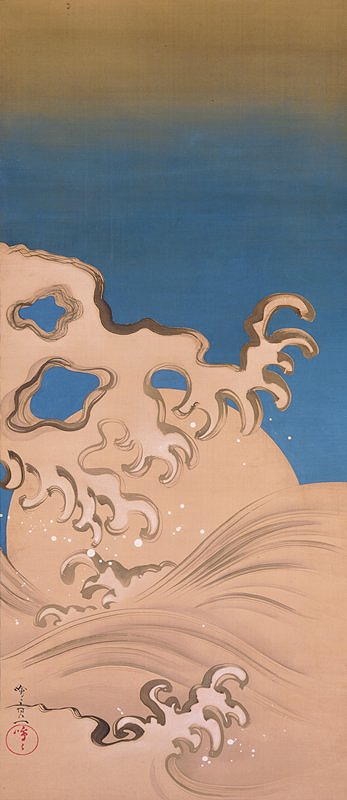
Suzuki Kiitsuexpan:
Moon and Waves
(First half of the nineteenth century)
" … surveying my small kingdom …"
However subtly this season might start to change, it finishes the job in a swoosh. A mighty wind blows the last complacency aside, and the world turns upside down in a single afternoon. Change seems to resist itself for the longest time before finally caving into its inevitable, unable ever after to recover what it ultimately could no longer retain. It's always been the same. The only question has always been precisely when, a question without anything resembling a reasonable response. TheTurning does not pivot on preciselies but on eventualities. Eventually, inevitably, the change appears, however lengthy the preceding longing might have been.
The Fall term starts as if to set off TheTurning.
Fairness
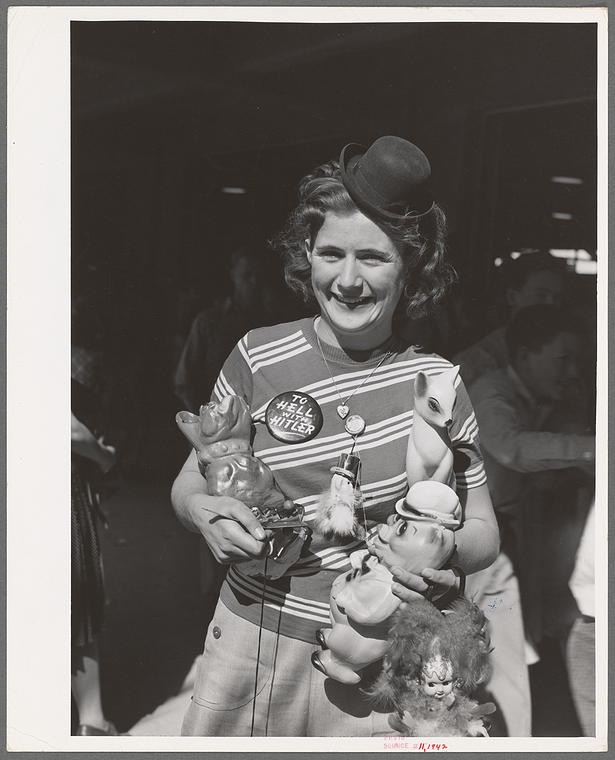
Russel Lee: At the Imperial County Fair, California
(1942)
"Everybody heads home a winner anyway!"
I feel confident that I have no idea how to describe The Southeast Washington Fair and Rodeo, though I've attended this celebration for more than sixty years. The "Fair" seemed enormous and exciting in my youth, a vast playground of unusual sights and experiences. Rides, sure, but also animal barns where the farm kids would camp out with their prize stock and walk around with straw in their hair. In the old days, the Midway was a place of awe and petty crime where carnies and unlikely charlatans took the usual advantage of gullible townies. One of those sharps correctly named my first-grade teacher's first name, an astounding feat made more remarkable by the fact that her name was Pearl. What were the odds besides impossible? That single transaction convinced me to avoid betting on anything ever again. The odds are very likely somehow invisibly in someone else's favor.
The modern-day Fair seems tame, down-right lame in comparison.
MoreAuthentic

John Downman: Attention
(n.d., late 18th, early 19th Century)
"Whomever created this clockwork universe seems to have installed it backward."
We deem old stuff as MoreAuthentic than more modern things. We seem to revere the good old days with our language, for it seems to disparage newness. They must actually not build them like they used to; every updated everything, worse, slower, and ultimately more expensive rather than better, faster, or cheaper. Upgrades degrade performance and disable familiar capabilities and should be deferred as long as possible. Replacement parts invariably fail to fit properly or seem so much more cheaply manufactured that they never quite match original surroundings. New and improved prove to be an oxymoronic marriage incapable of fulfilling its promises. We remain wary of improvements and most likely should be. Progress never was anybody's most important product; entropy was.
When penny candy costs a quarter, the future has arrived as feared.
Authentic

Jozef Israëls: A Laren Scene (1905)
" … a caricature of its original intentions."
Here in The Napa Of The North, we're noticing an encroaching reduction in authenticity as the BIG growers buy land and move into this valley. Main Street, which once offered every service imaginable in its few short blocks, now primarily features what the locals call Cute Crap Shoppes and wine-tasting rooms, so many that I haven't mustered the courage to enter any of them. They seem undifferentiated, each featuring essentially the same decor and identical ambiance. Perhaps the wine's unique to each, but I doubt that. If I attempted a tasting tour of Main Street, I doubt I could make it there and back again without over-indulging on modest pours and origin stories. Each winery and vineyard must possess a founding myth and an abiding ethos to justify its existence. The wine business never really was that much about wine.
Visitors arrive aching to experience The Walla Walla Difference.
SlippingAway

Utagawa Hiroshige 歌川 広重:
Yoshitsune Awaits Benkei at Gojo Bridge (c. 1840)
“ …leaves drying before turning …”
Summer, above all seasons, seems just to slip away. Once fierce, it tames. Its once dominant sun loses weight. Somebody blows out some of her candles. Even when the thermometer hits eighty, it's a toothless and unconvincing heat. It's just going through the motions with almost another month left where it will be expected to continue fulfilling obligations. The time for frying eggs on sidewalks has already past. Successive cues will continue before this season's gone, but it’s now become an imposter and will not return until next year.
Summer became the scariest season, replacing Winter over recent years.
Returning
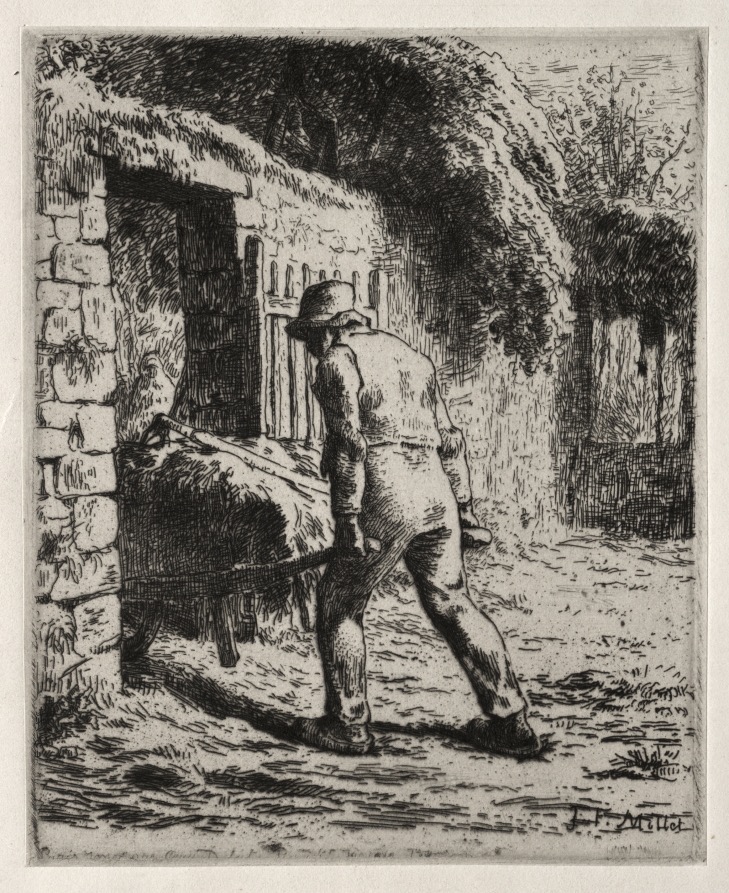
Jean-François Millet:
Peasant Returning from the Manure Heap (1855–56)
"Nobody needs everlasting anything."
Returning rarely carries the cachet leaving exudes. Departure reeks of adventure, while Returning more often smells of dirty underwear and sour beach sand warming in late summer sunshine. Whatever the season, it will seem to have changed during the absence. Summer will suddenly be leaving, when a week before it had settled in until at least November. The first signs of Autumn will appear in some sunburnt Vine Maple still turning color despite the drought's malign influence. While leaving seemed an escape, Returning seems an acceptance. However adventurous the departure seemed, Returning requires genuine courage to face with renewed dedication what might have driven you away.
The hero never returns from his adventures.
WritingSummary 08/24/2023
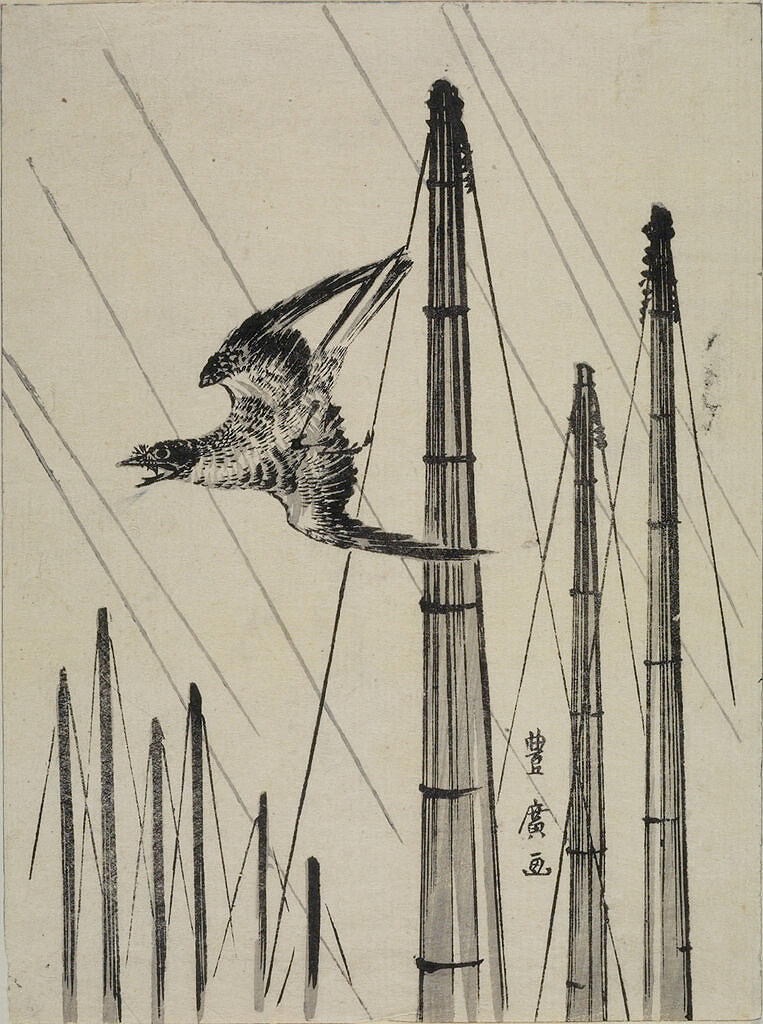
Utagawa Toyohiro:
Cuckoo at Tsukudajima (Edo period, 1615-1868)
Necessary But Rarely Obvious
I never seem to know when I need a vacation. This year, this season, I came as close as I've ever come to understanding that when. I had become bored with the merely extraordinary. I had become unsatisfiable by most any measure. I felt simultaneously over- and underwhelmed. I felt damned, and for no really good reason. The Muse insisted that we excuse ourselves and just disappear for a few days. I even called a morning's moratorium on new writing, a permission I only rarely ever extend to myself. The absence seems to have worked. We returned last night after four hundred road miles along some of the world's most beautiful country, and I landed feeling especially blessed. The Muse made pesto for her birthday supper, and I went to bed convinced that all was right with this world again. I woke feeling behind but probably capable of coping again. That renewed coping capability might be the only purpose for vacationing. Nothing else seems to explain why it's so necessary but rarely obvious.
ValleyOfThe
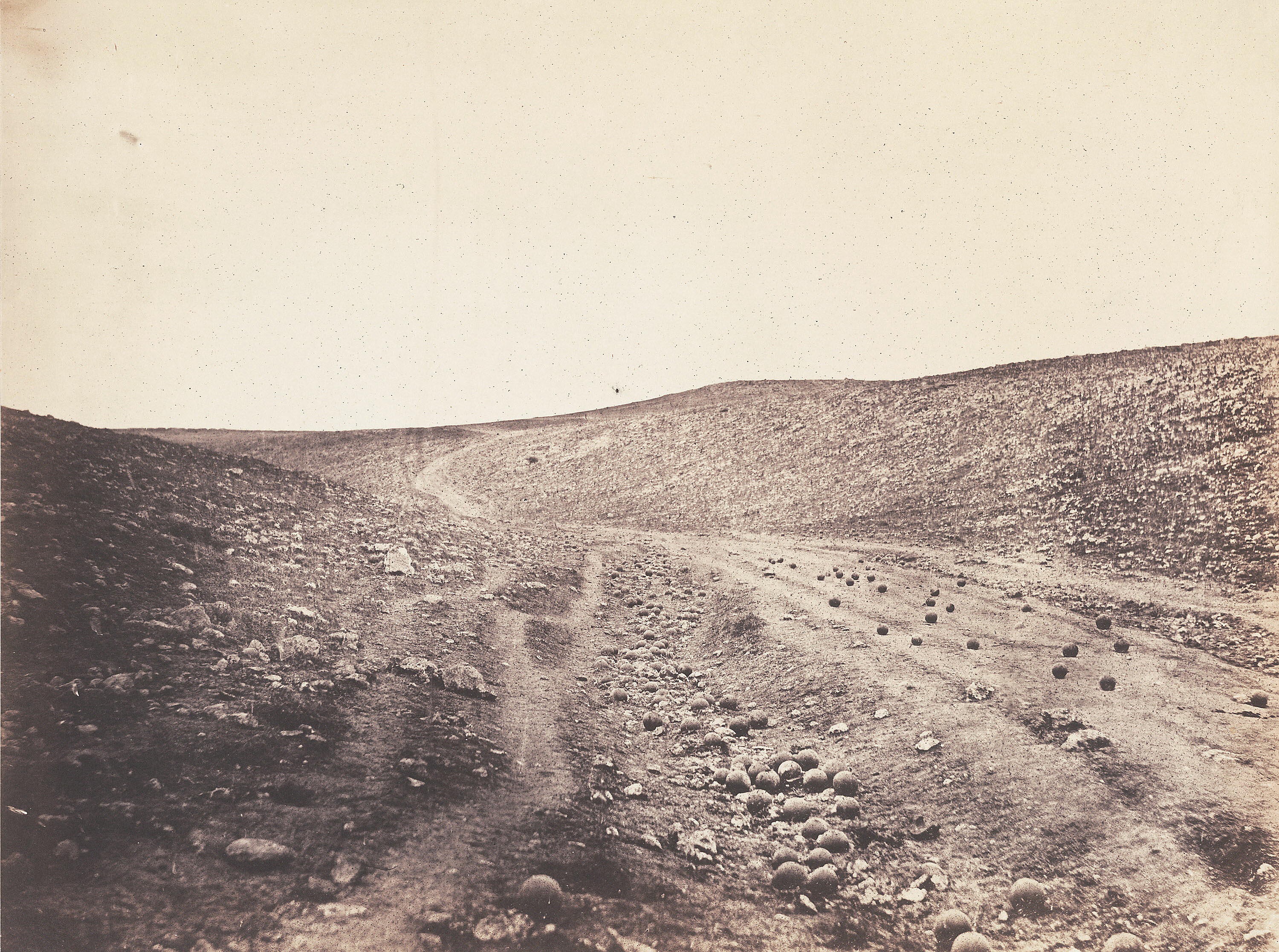
Roger Fenton:
The Valley of the Shadow of Death (1855)
"Stories never end."
The Old Wives insisted that deaths arrive in threes. I remember this notion being considered fact from my earliest recollections. I remember it proving true, too, which seemed even more disconcerting, for it was one thing to presume and quite another to experience confirmation. After my great-grandmother died when I was twelve, I dreaded another funeral for weeks after that event. These days, I've matured enough to recognize the fundamentally random distribution of such events and how my parsing can make unrelated events seem causally associated. I remain wary. When one drops, I anticipate a follow-on. When that occurs—notice how I didn't use the descriptor 'if'—I always expect a third and am rarely disappointed, though successfully anticipating departures doesn't qualify as a win. "There it goes again," I mumble to myself. Whoever posited that third time's a charm was not paying close enough attention.
I wrote this week about losing my dear friend TheAngelClair.
Waiting...
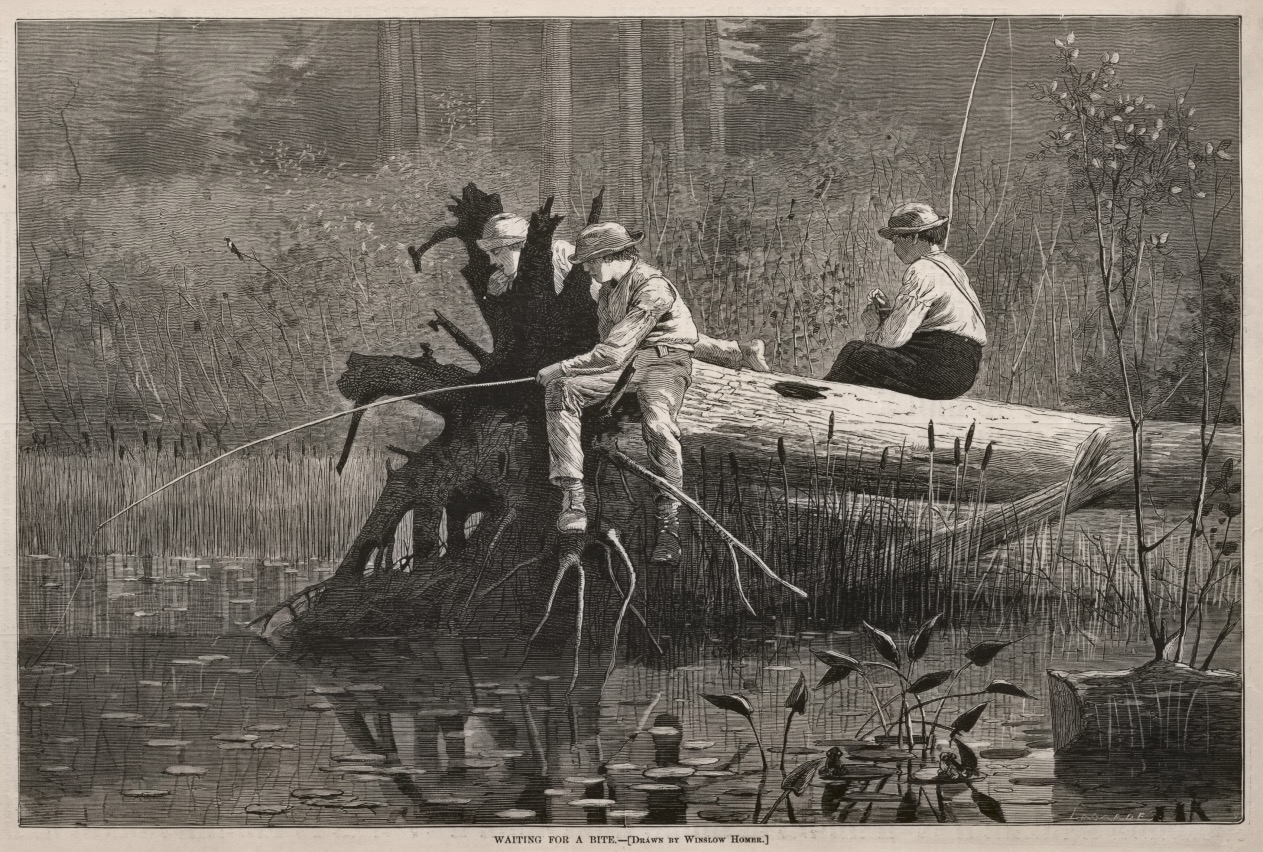
Winslow Homer: Waiting for a Bite (1874)
" … reduced to roughly the equivalent of the quality of your Waiting…"
(I submit this story in recognition of The Muse’s birthday.)
No travel guidebook worth its salt would dedicate a chapter to the underappreciated art of Waiting… . This one will, though strictly speaking, this collection of Honing Stories doesn't quite qualify as a guidebook, or at least not as a conventional one. I've reported before that I have little use for guidebooks. Nobody can ever recreate another's travel or adventure, so one should properly read guidebooks only as biography or fiction—probably fiction—and work hard to avoid trying to replicate the author's experience with their own. It cannot be done, and attempting it will very likely ruin your vacation. All that said, I will try today to write a sincere appreciation of the magnificent and underappreciated art of Waiting…; for some significant portion of every adventure, every vacation, every damned day gets expended with Waiting…, and we seem ill-prepared for this effort.
The Muse and I checked the ferry schedule to learn that we would have needed to schedule our trip sometime in the past to secure a reservation on any crossing before nine-fifteen that evening.
Rememberer
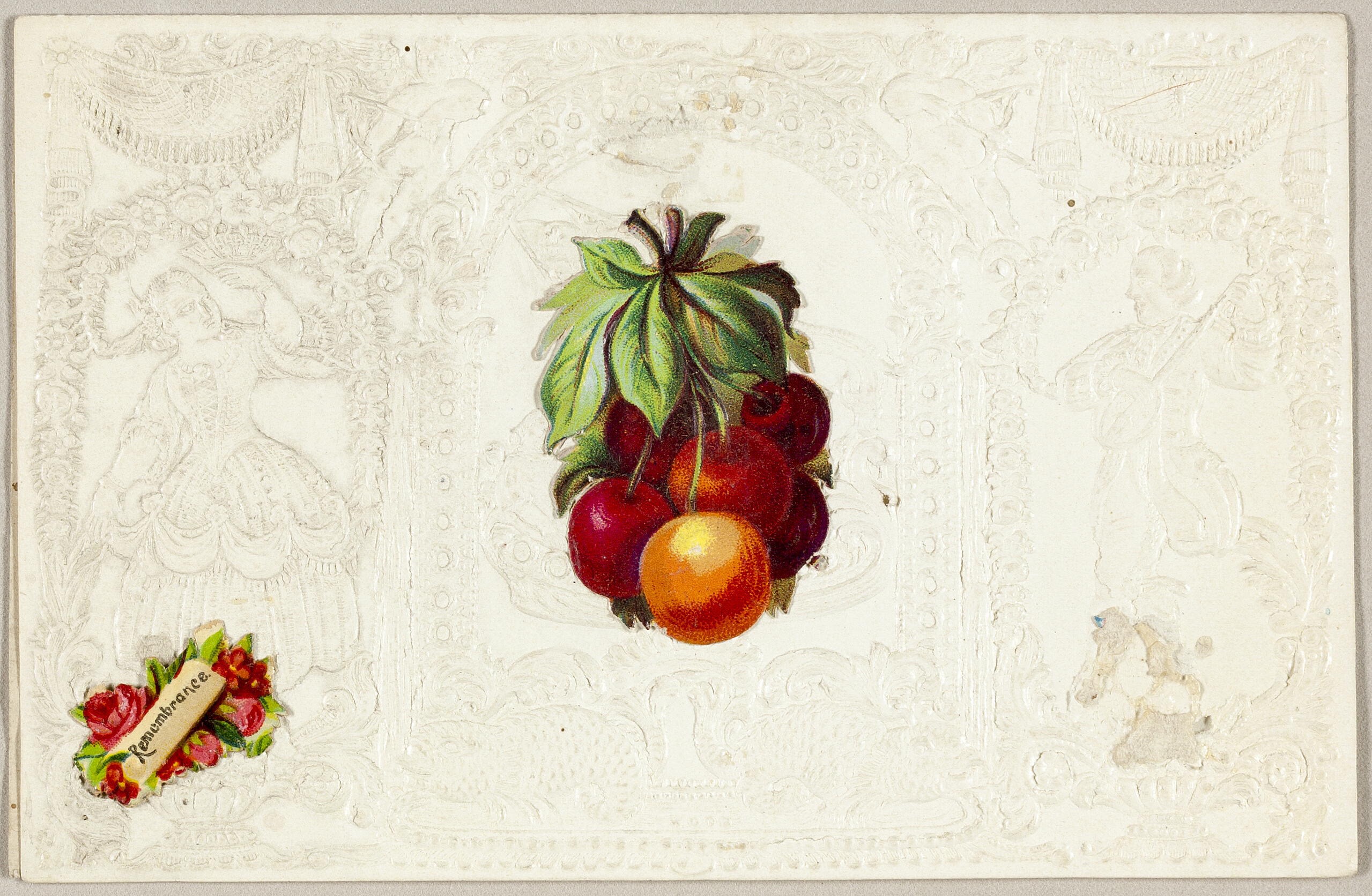
Thomas Wood: Remembrance (valentine) (c. 1850)
(I could find no biographical information on this artist.)
"They hold us upright …"
Of all the roles I have played and continue playing in this life, the role of Rememberer might qualify as the sleeper. I focus most of my energy into my role of primary experiencer, for that seems to be the most purpose-laden role available. I make my history by engaging in the innumerable activities that will eventually comprise my history. I never schedule time to set aside engaging to do some serious remembering, even though much of my activity involves writing, which relies upon recollections. I never catch myself stuffing away reflections. They seem to accumulate more or less automatically, never by me more tightly focusing my attention. Indeed, squinching my mind in order to capture memories better seems paradoxical. One does not really capture anything for later consumption. Some stuff just seems to stick.
I remember visiting St. Peter's in Rome only to find the place overrun with people carrying video cameras attempting to capture their visit to St. Peter's.
TheAngelClair
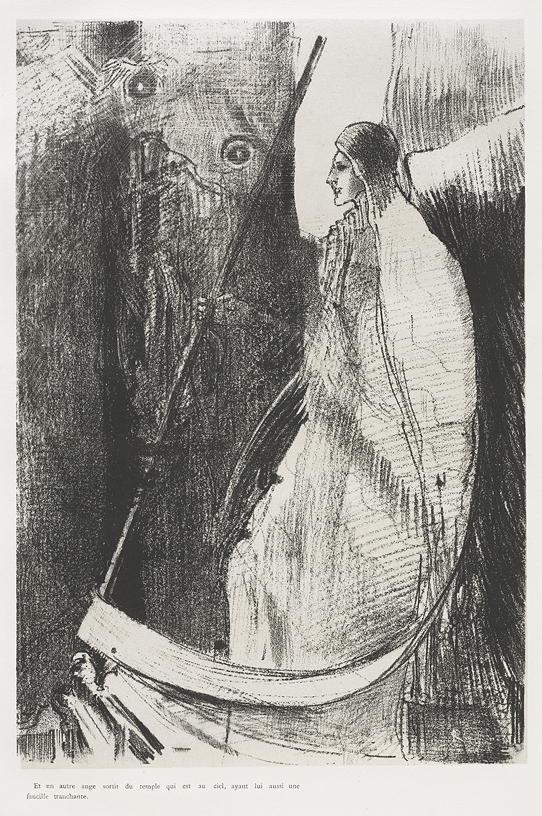
Odilon Redon: THE APOCALYPSE OF SAINT JOHN
And Another Angel Came Out of the Temple
which is in Heaven,
and He also Having a Sharp Sickle
1899
"Travel well, ya old bastard!"
On the morning of my seventy-second birthday, I received news from an old Takoma Park neighbor that our mutual friend and former neighbor Clair had died of congestive heart failure and dementia. I had anticipated and dreaded this news since my last visit to our exile. On that visit, Clair had agreed to fetch me from some bus stop somewhere but was uncharacteristically tardy. I started walking the route I knew he'd take, and eventually, he came along in his familiar red Prius, though it seemed to have suffered extensive front-end damage. He pulled over, I clambered in, and we retired back to his familiar home next door to the site of the first rental of our exile. He explained that it was "the damnedest thing" that his car seemed to damage itself. Michele, his artist wife, was displeased that he was still driving. He slurred his story.
I'd met Clair one bright June Sunday morning.
Vacatering
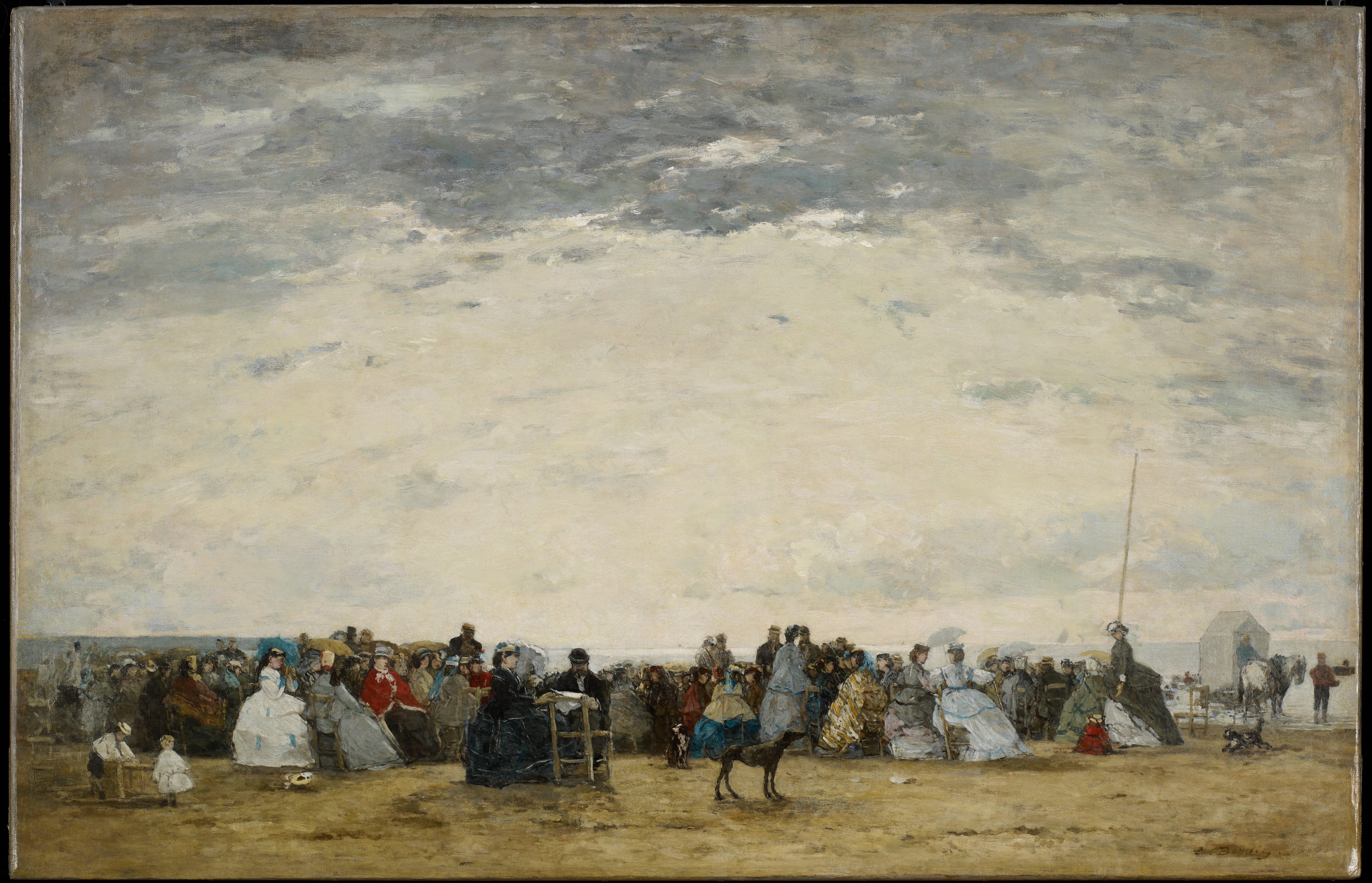
Eugène-Louis Boudin:
Vacationers on the Beach at Trouville (1864)
" … every other place an also-ran."
We simply must leave preparation for the very last minute. The Muse must run out to The Home Despot as the sun sets to buy replacement parts for the watering computers we hadn't used since we couldn't remember when. Leaving home in mid-summer makes no sense because who will water in our absence? We have a long history of losing plants when our automatic watering system fails. I can't use the damned things because their user interface is written in machine language. The Muse can even change their batteries. We stood in the sideyard, testing long-unused sprinklers, working out a strategy. I usually use three of our vast array of sprinklers, moving the same ones from place to place. We have no such luxury available in our absence. We must set zones so that every inch of the property gets watered without human intervention because we will be off Vacatering, absent.
I worry over the cats, who I know can take care of themselves.
WritingSummary 08/17/2023

Johann Andreas Benjamin Nothnagel:
Hermit Writing (18th century)
I Seem To Flourish Anyway.
It has almost always been the case that the greater my feeling of inadequacy when publishing or posting something, the greater the readers' appreciation. This does not translate into any meaningful or particularly useful metric, for I can't seem to leverage my sense of inadequacy into validation. I quite naturally quake when feeling that all-too-familiar sensation that I've fallen short again. It must be a particularly ironic blessing that these very items that spark my greatest concern tend to return the greatest appreciations. I cringe and publish anyway, understanding enough about the process to appreciate that whatever comes out represents the best I'm likely to produce that day. I receive remarkably few invitations to submit do-overs. Given the paradoxical feedback my audience feeds me, it's a wonder that I continue. I seem to flourish anyway.
Harvust
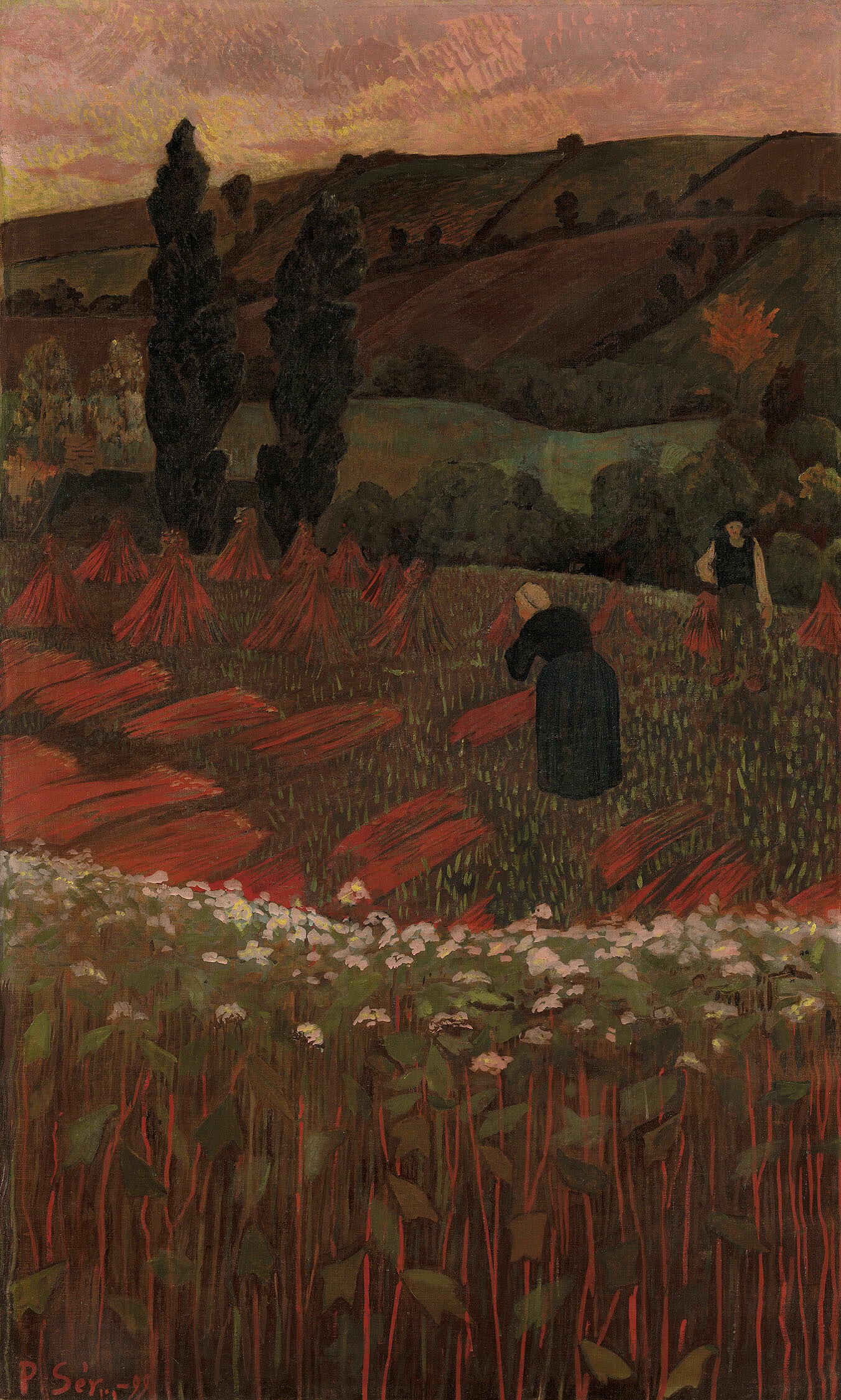
Paul Sérusier: The Harvest of Buckwheat (1899)
"We will not need to make time then …"
Late Summer emerges from a hot and dusty sameness anyone would swear might be neverending. Crops start ripening and, in their fashion, quickly overwhelm anyone engaging with them. Narrow windows hold promise, a precious week for some and only slightly longer for others. One starts gathering rosebuds while they may. Miss a day, and I might miss the whole year. Time becomes the premium resource, for the calendar already seemed full. Each successive crop squeezes in anyway, sideways and unsympathetic toward any whining. One learns early, and the lessons stick through frequent repetition, be prepared to sacrifice anything to preserve the Harvust.
Each year I try to hone my technique.
SocialMorality5
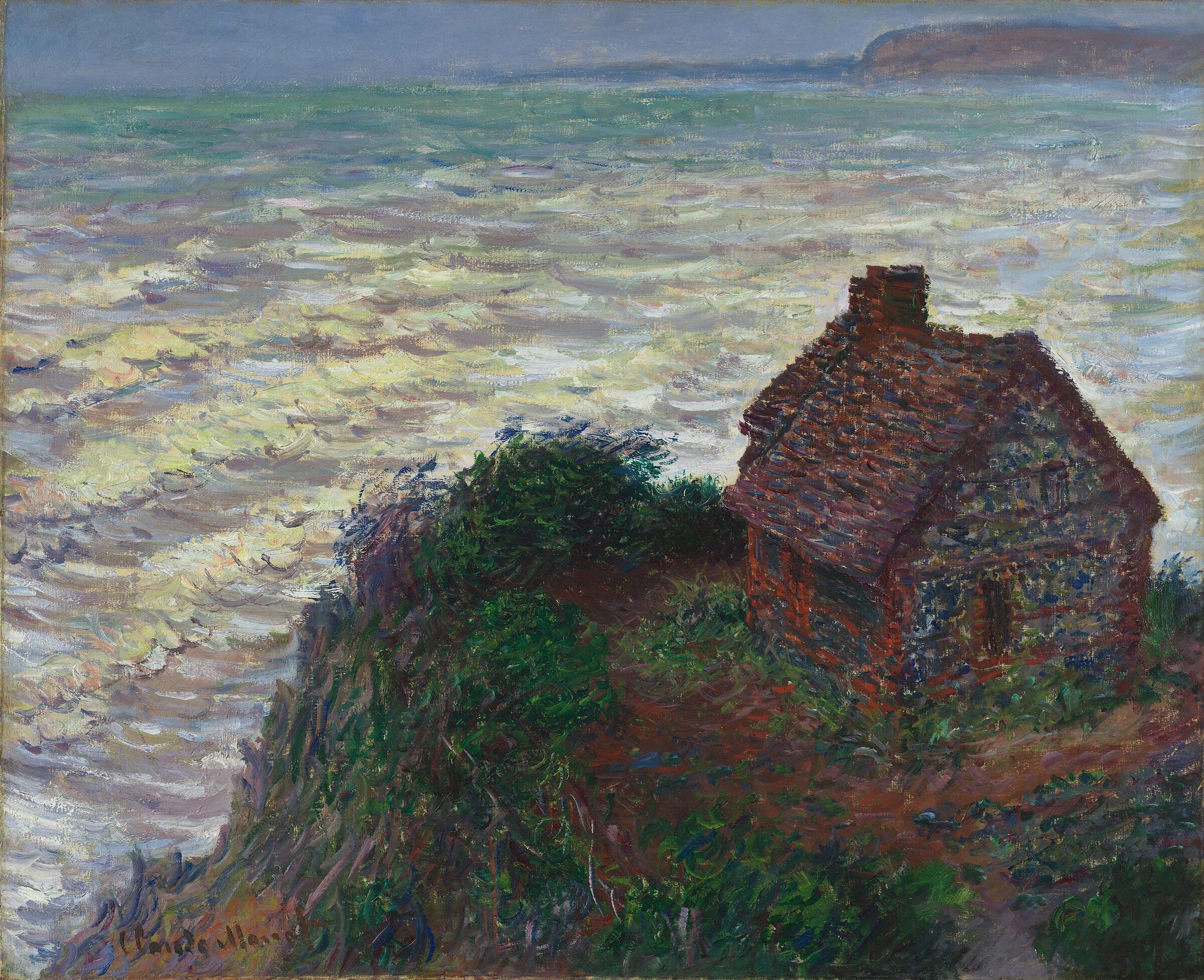
Claude Monet: House of the Customs Officer, Varengeville (1882)
"Would be potentates might finally receive a subpoena."
Now and then, a politician will come along primarily dedicated to misrepresenting everything. They might start small but eventually expand their practice to include every blessed thing that comes out of their mouth. They seem to be enjoying the time of their life without compunction or consequences at first. They don't age. Their story changes unselfconsciously into whatever form seems most useful at any moment, always delivered with the same supreme confidence. Anyone might come to question their judgment listening to these lies, for it violates some primal comportment to so blithely misrepresent. Eventually, even gravity loses meaning. There are those still believing, and everyone else. True believers, by which I mean those who have built their belief upon utter falsehoods, will maintain unshakeable belief, and that belief will become their uncontestable truth.
Not even politicians ever manage to avoid the truth forever.
SocialMorality4

Govaert Flinck: Blessing of Jacob (1638)
Mrs Snipkin and Mrs Wobblechin
Skinny Mrs. Snipkin,
With her little pipkin,
Sat by the fireside a-warming of her toes.
Fat Mrs. Wobblechin,
With her little doublechin,
Sat by the window a-cooling of her nose.
Says this one to that one,
"Oh! you silly fat one,
Will you shut the window down? You're freezing me to death!"
Says that one to t' other one,
"Good gracious, how you bother one!
There isn't air enough for me to draw my precious breath!"
Skinny Mrs. Snipkin,
Took her little pipkin,
Threw it straight across the room as hard as she could throw;
Hit Mrs. Wobblechin
On her little doublechin,
And out of the window a-tumble she did go.
" … the riskiest of all propositions …"
Morality, the Thou Shalts of behavior, necessarily restricts some behaviors and altogether enjoins against others. It would prove an absolute fool's mission for me or anyone to attempt to delineate all the terms and conditions within our or anyone's SocialMorality. In very real ways, one must come to know without explicit instruction; much of that learning can only come from sincere observation. Woe be to the unobservant, for they seem destined to embarrass themselves without knowing it. They will become the ones quietly looked down upon, the self-selected second- and third-class citizens who repeatedly disqualify themselves through their actions. These feral citizens complicate the operation of any decency-seeking society and create an attractive nuisance for the more acculturated, for unlike our Skinny Mrs. Snipkin, we daresent go throwing our little pipkins every time another manages to offend us. Rightness does not empower anyone to start tossing around their pipkin, however righteously engaged in.
The righteous hold greater responsibility than anybody.
SocialMorality3
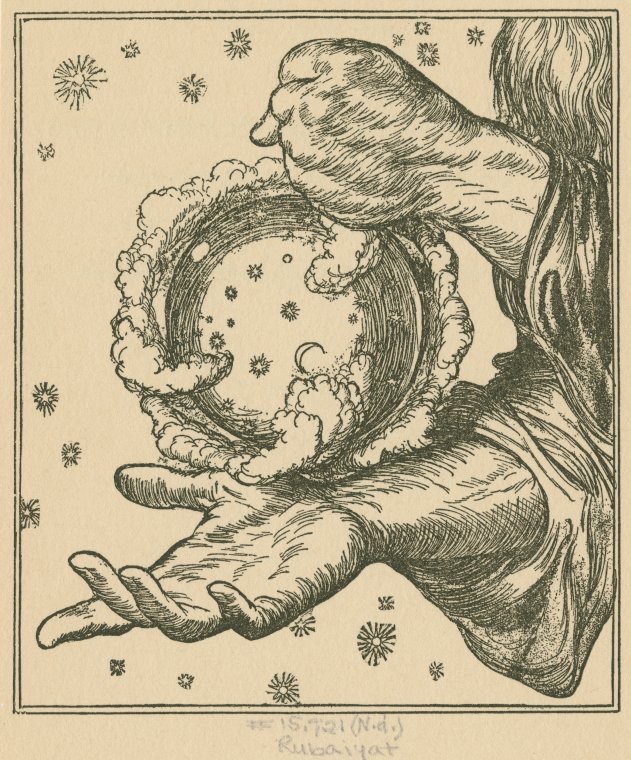
Edmund J. Sullivan:
Ah, love! could thou and I with faith conspire (1913)
"We remain in moral peril …"
Morality seems an inherently social entity, for it's anchored in commandments. An ethic involves an individual swearing to do something, I Shall, while a moral entails accepting a commandment, Thou Shalt. An immoral act involves disobeying an order or an understanding, violating a covenant between a respected authority and its supplicant. In the case of SocialMorality, the authority might well be disembodied, a cultural understanding. "One simply never on a Sunday does," for instance, the agreement appears more often tacit than explicit. The rules seem to have been forgotten or never understood in modern times. Throughout history, modern times have considered themselves the exception, present expressly to break traditions and make new ones. A core of more or less permanent morals has weathered such abuse and tends to resurface after much misuse and disservice. Gentlemen have comported themselves in specific ways throughout the ages despite passing fancies, for instance.
The new presents this unique challenge for us.
SocialMorality2
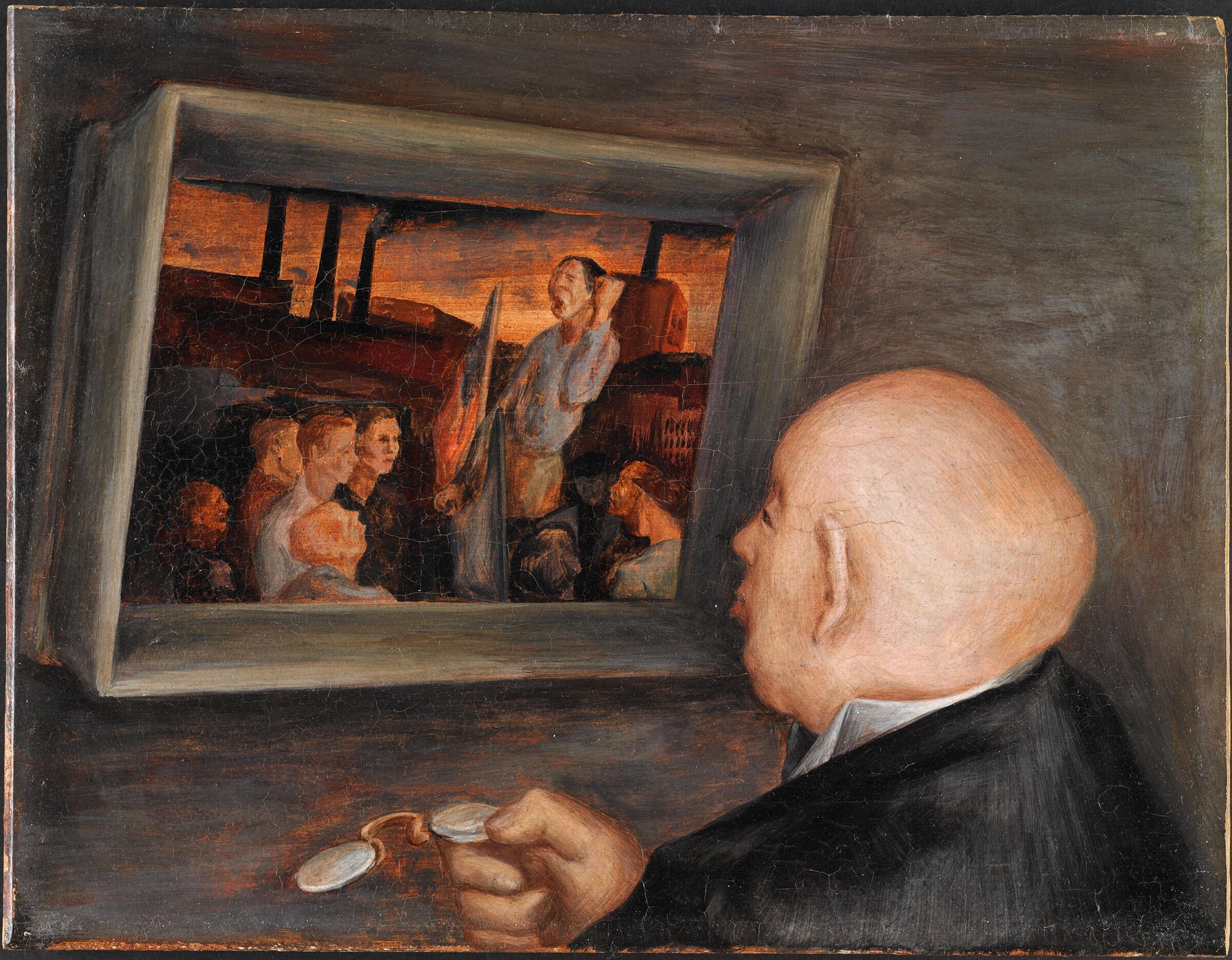
Mervin Jules: The Art Lover (1937)
" … seeking to act upon our interdependent moral duties …"
Every social act seems presumptuous, for we are born autonomous beings utterly dependent upon each other. Our social lives seem contradictory to our survival, but they aren't. Our autonomy too convincingly encourages us to isolate, discriminate, and individuate when we are inescapably plurals, “beings," not merely "being." It's all terribly confusing, and without some orientation, we might be destined to attempt to be -ists: rugged individualists or survivalists, neither of which seem anywhere near anybody's crown of creation. We live in communion, or we fail to thrive. Primitive formations of communion include cults, competing clubs, and patriotism, each of which paradoxically relies upon separatism as the medium for community, as its unifying purpose. Each vilifies difference instead of holding it supremely sacred. SocialMorality utterly depends upon a deep reverence for difference, not just the tolerance of it but an admiration equal to the wonder that difference actually entails. Difference seems to be the unifying principle underlying all social activity and, therefore, SocialMorality.
The purpose of school should be an orientation to—learning—SocialMorality.
SocialMorality
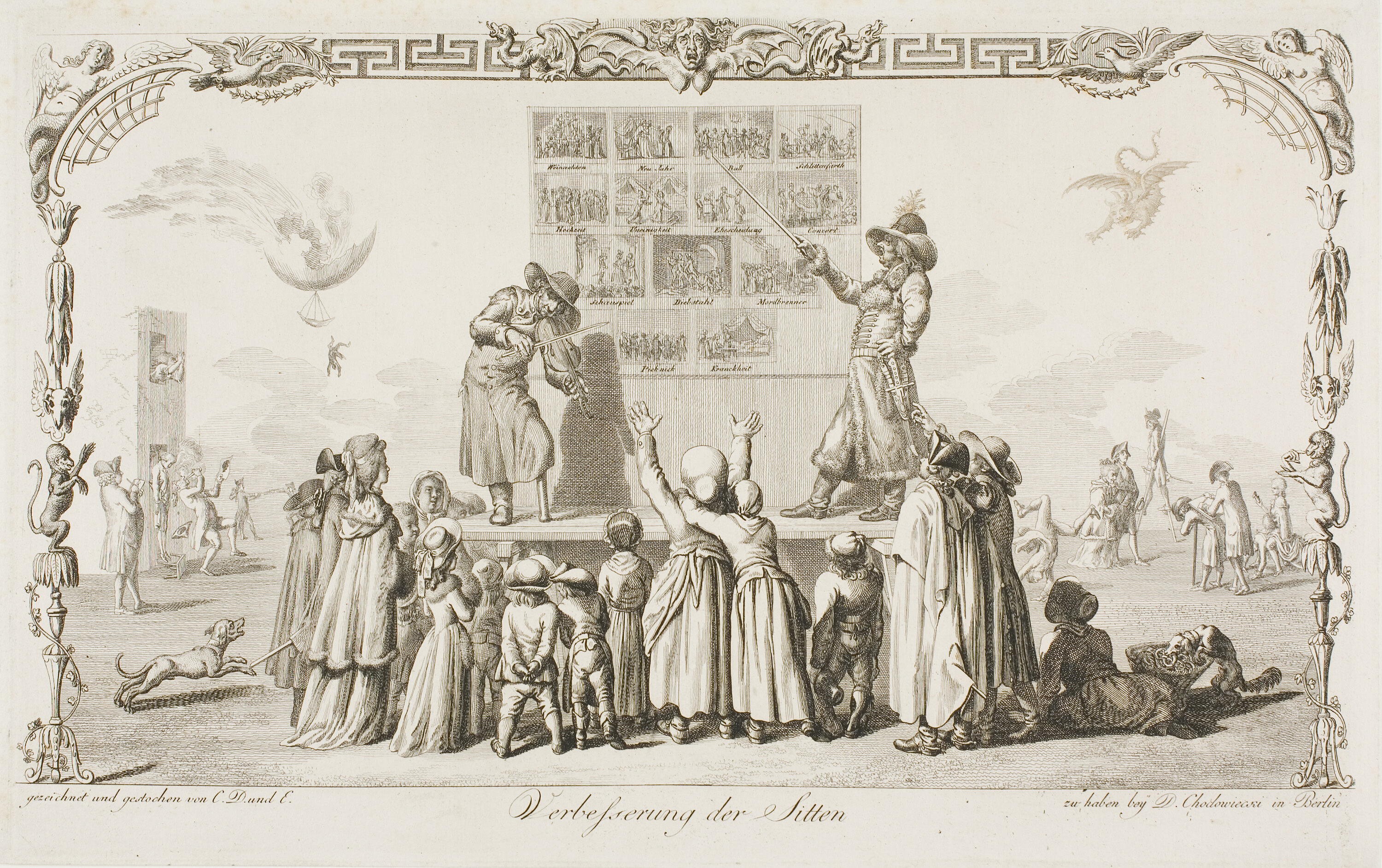
Daniel Nikolaus Chodowiecki:
The Improvement of Morals (1786)
"We were founded with a broader vision …"
I feel appalled at the many attempts by self-proclaimed moral conservatives to legislate and adjudicate abortion bans. They claim to be exercising moral imperative, while I can only see them violating a superior SocialMorality, for our society requires something different than individual morality, which only grows more iffy when considered from within any social context. What's deadly to any individual might not damage broader society, and what undermines society might have little to do with individual morality. Further, society sometimes sanctions gross violations of personal morality to protect their community, such as when soldiers get authorized to murder to defend their superior civilized society. Society deems soldier killings moral and necessary, though any strict conservative reading of individual morality would find them far over the line. We've always struggled to distinguish between permissible individual and social morality.
We abide by laws mainly because we respect the SocialMorality those laws represent.
VelveteenEvening
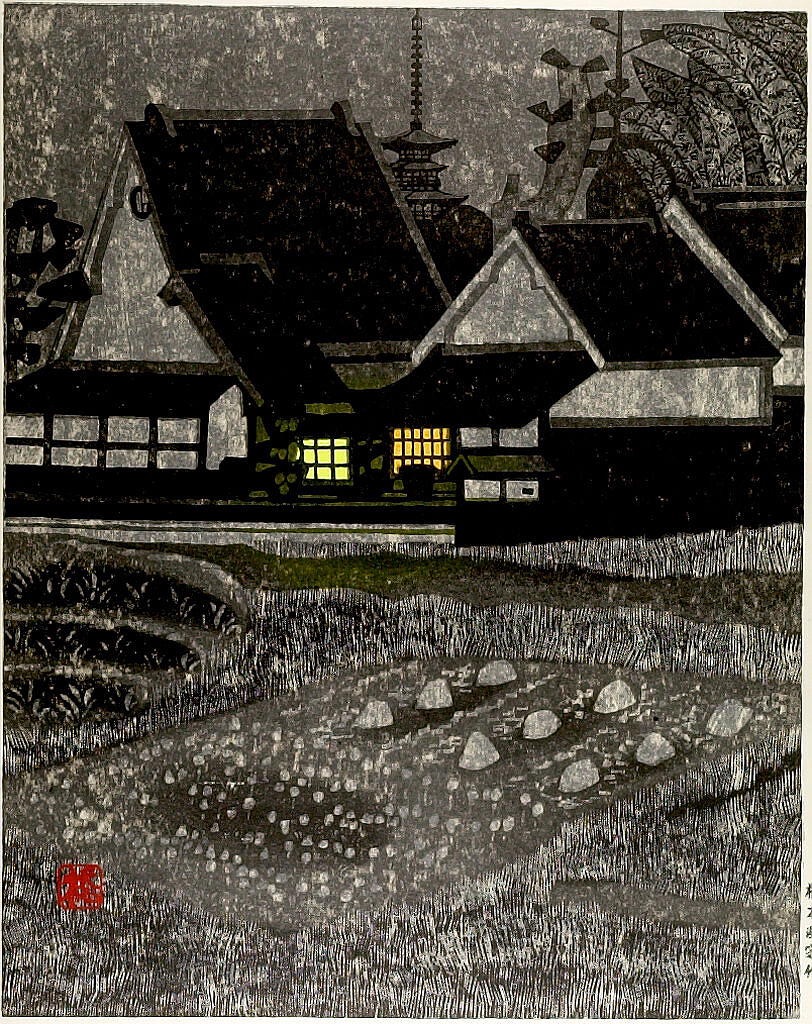
Hashimoto Okiie: Quiet Evening (1958)
"Once they're here, they're gone."
By late afternoon, the cats emerge from their moist shady lairs to make their way toward the back deck. If she's back from her day campaigning, the Muse shows up at about the same time. I'm already there waiting for this moment. I find the food and set out the cats' dinner. The Muse and I take to our chairs and survey the yard. She might wander back to check her tomato plants and cucumbers. Stink bugs have infested her tomatoes, and we're trying to chase them away with diatomaceous earth. We have yet to succeed. We ease into another VelveteenEvening.
I might set up the sprinkler, a considerable undertaking: moving hoses and figuring angles.
WritingSummary 08/10/2023

William Merritt Chase:
Head of a Boy (Date unknown, late 19th century)
"When I wonder why I keep doing this …"
In The Middle of a Muddle
Summer seems to stretch on forever and ever from everywhere here. Rain visited this week, bringing the first measurable moisture since April and a velvety feel to the starch-crisp breeze. The apricot tree finally stopped pelting us with jam bombs, and I let the lawn grow an extra week before mowing it again, mainly to protect my shoulder from any fresh insult. I relearned the folly of my native hesitance to visit the doctor after investing three months in ineffective treatment and discomfort, a repeating pattern. I deferred several projects in favor of nursing an unnecessary wound. I suspect I'll repeat this old pattern when I hurt myself again. A cluster of clogs cleared out this week, blockages that had been inhibiting movement and growth. As I wrote, unstuckness always turns out to be inevitable though it's the very last thing to seem possible from in the middle of a muddle.
Campaigning
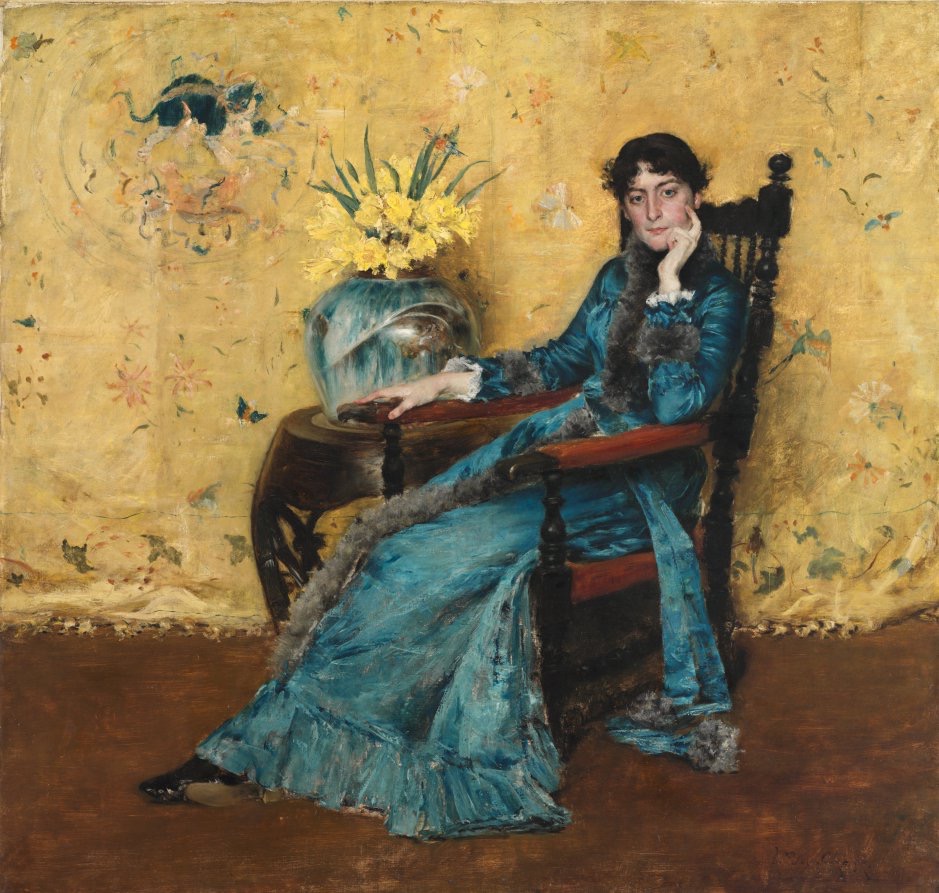
William Merritt Chase:
Portrait of Dora Wheeler (1882–83)
"I'm still dabbling."
The picky details stall me. I don't understand the underlying patterns governing the effort. I cannot find what I need when I need it. Her organization baffles me. My organization has yet to emerge, and might never. I've forgotten how to sort a spreadsheet if I ever knew how. I cannot access her Google Drive. I have to take a photo of her QR Code, attach that to an email, then retrieve and edit it into a graphic for use in the document I'm creating. I haven't heard half the rumors governing the effort. I just learned about some gatherings I thought I was supposed to be scheduling. Just creating a simple invitation freezes me. I suddenly do not know what to say to anybody. She produced a handout using the free software that came with some stationery? I can't reuse any of that content, so I use my two-and-a-half typing fingers to transcribe it. She uses a font I do not have and don't want. I'm supposed to call somebody about something, but I've forgotten who and what.
Campaigns are supposed to start naive and full of hope.
Convergence

Hanns Lautensack: Landscape with the Town on a River
and the Cottage between Trees (1551)
" … purposefully moving forward again."
Once stuck, things tend to stay stuck forever—or almost forever. Points of Convergence emerge. Who knows from where? It's as if stuckness becomes disgusted with itself, weary of the abiding irresolution, to finally take its fate into its own fists, for stuckness seems a wasting state, one inherently incapable of sustaining itself forever. It appears to possess some self-respect such that it cannot abide its own idleness and finally injects some mobility into its existence. However this happens, one can be sure this will happen regardless of how hopeless any context seems. There's always space for dreams, which take up very little space, though dreams seem infinitely expandable. To have one might be to hold the whole universe because with them on hand, anything seems possible.
Since my shoulder seized up in April—it's now August—I fell into a period of stuckness.
InstantMessaging
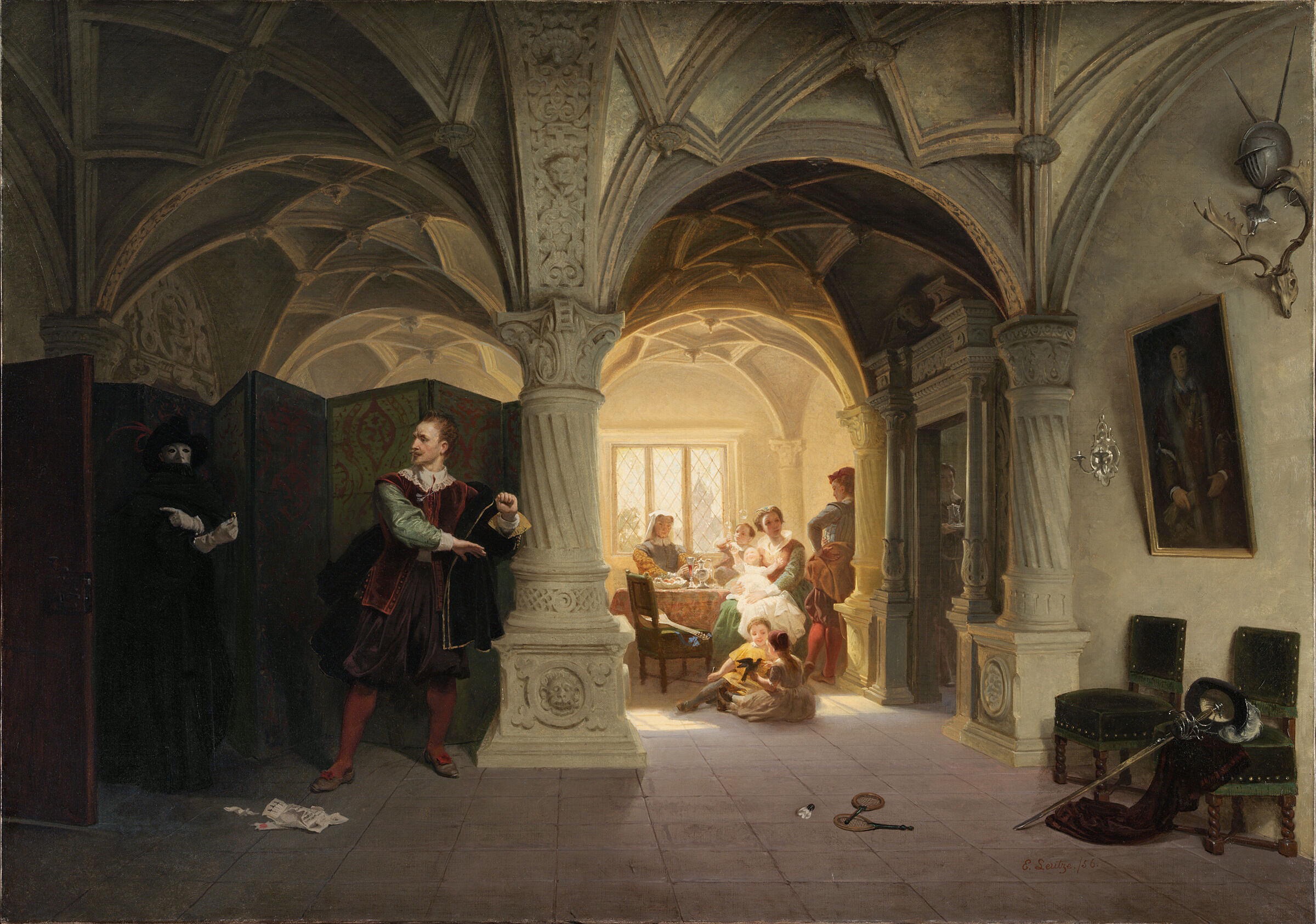
Emanuel Gottlieb Leutze:
Entertaining the Messenger in the Outer Hall (1856)
"We are the apps we invoke …"
I live surrounded by apps I do not know how to operate, whose instruction manual might just as well not exist. I've never cracked an instruction manual for even the most complicated. I have consented to try to sit through a tutorial or two, but certainly not more than a couple, and even those, I'm sure I never made it to the bottom of any of them. Apps are supposed to be intuitively designed, meaning they're supposed to work the way any odd user might expect them to work. Certain conventions seem universal across whole classes of apps. Map apps work similarly, and so do search apps. The differences between them might only come into play if one aspires to become a PowerUser, the sole class of app user who understands how an app works. These are such a tiny minority as not to be worth counting or counting on. They're the ones who supply the incomprehensible answers to the questions you post on an app's User Forum.
I presume I know how to operate the more prominent apps on my devices.
Beaning
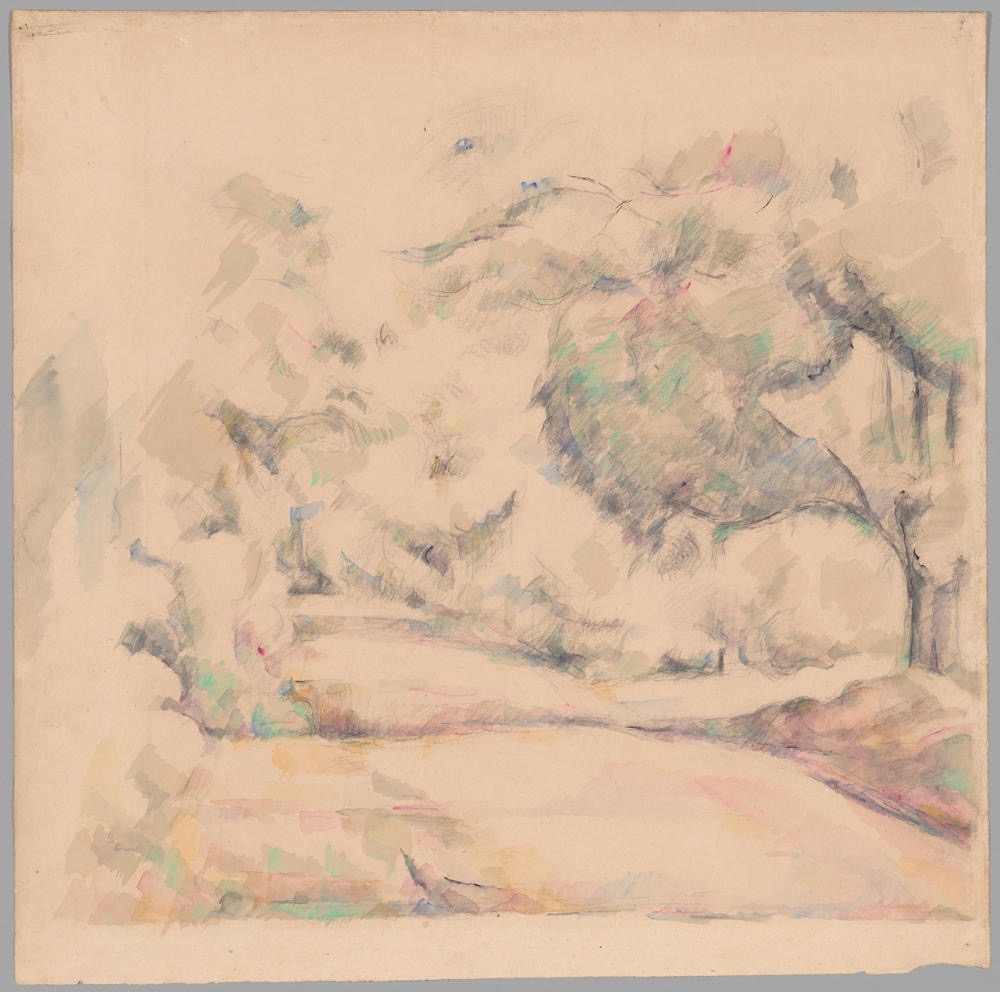
Paul Cézanne: Road in Provence (c. 1885)
" … the Rosetta Stone recipe for beans."
My life as an erstwhile cook might most easily represent an extended study of dry beans in their near-infinite variety. I was always a fancier of beans. Bean Pot qualified as my favorite childhood supper. I'd ladle pressure-cooked pintos over a slice of bread and swirl a melting hunk of Tillamook Medium Cheddar into the mix to complete the protein and complicate the flavor. From there, I attempted to cook every size, shape, and variety of dry beans I encountered, from split dal to Christmas Limas, with varying success. My beans would often seem overcooked, lacking bite and texture, refried right out of the pot. Other times, I could not get the buggers to soften. Nobody's gastrointestinal tract appreciates blood-rare garbanzos.Further, the locations of my various kitchens and varying techniques influenced the results. Beans might never thoroughly cook at nine-thousand feet in the Rockies and might finish too quickly so that a moment's inattention can render them ruined nearer sea level in Seattle or Portland or even here at The Villa. I remained an enthusiastic, if inconsistent, producer in the Beaning department.
Three significant insights have improved my results over time, and an additional most recent experience promises more consistent future results.
Paean
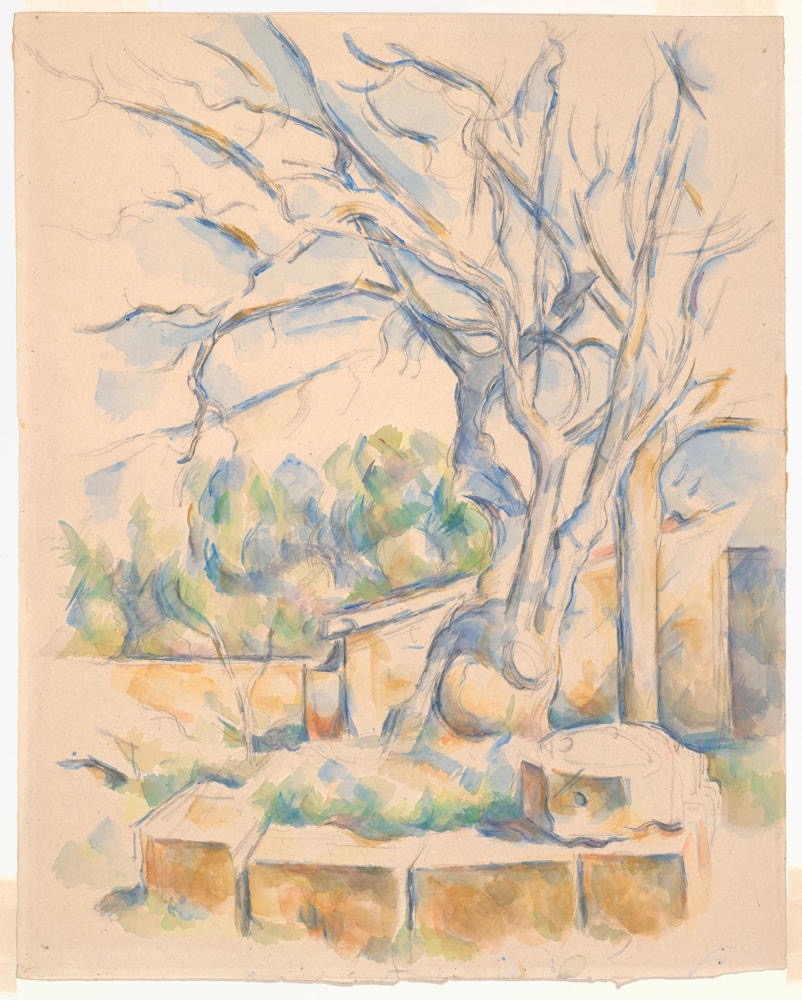
Paul Cézanne:
Pistachio Tree at Château Noir (c. 1900)
Paean: a thing that expresses enthusiastic praise. (Oxford Languages)
" … nothing compared to most."
I sing today a song of praise for pain, that preeminent sensation. Above all others, it garners attention. It amplifies apprehension and can inflict damage with mere anticipation. Its sharpness can dull the brightest. Its dullness can sharpen even the boldest. Its lingering promise can thwart even the finest intentions. Its promise can utterly undermine inspiration. The dread of it distorts reason. Attempting to shed it encourages addiction.
Why a Paean for pain?
WritingSummary 08/03/2023
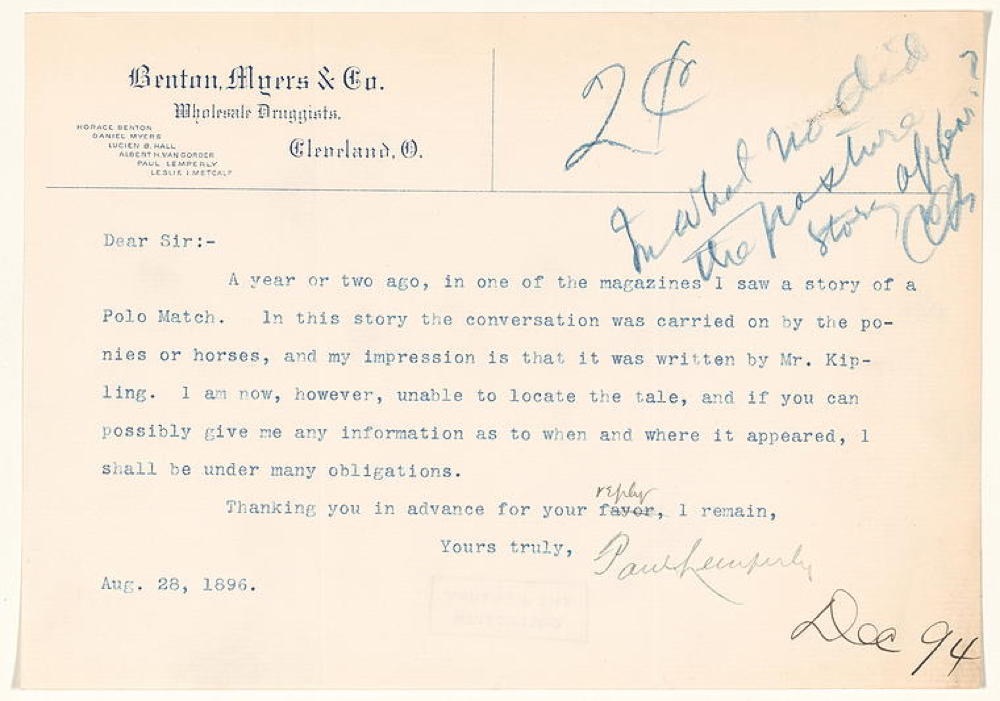
Paul Lemperly: Correspondence (1896)
Right Enough With This World
A numbing sameness settles in for the second, the downhill half of any season. What was heartily welcomed becomes merely moribund, done yet continuing, a walking finish. I revel in open windows to sit at my desk with a morning breeze blowing over, around, and almost through me while I write, yet I warmly anticipate an overnight low, rendering it too cold some days. The Muse and I flee indoors during the hottest part of the day, hiding until the fierce sun slips further West to leave the back deck in shadows while a sprinkler whispers beneath us. As context goes, so goes content. My writing week mirrored this context. I felt over-stretched, reaching as if I was reduced to leaching out the final inches from an over-used well. The water bill will astound us. The stink bugs have been assaulting The Muse's tomatoes. The composter groans beneath its belly, full of cull apricots. The driveway features leathery patches where the sun dried some apricots before I could clean them up. The yard smells like apricot jam. All's right enough with this world.
Harmony

Paul Signac:
In the Time of Harmony:
the Golden Age is not in the Past,
it is in the Future (1893-95)
"The road to wherever we're going …"
Yesterday, our Justice Department indicted our former president on conspiracy charges. A man who swore to defend our constitution conspired to undermine it. He'll be arraigned tomorrow, and his actual trial might not begin until a year from now. Most commentators contend that it will only end after he exhausts all of his appeals, which might take years. Still, I feel relieved that the indictment's finally public. After the string of House January 6th Committee hearings, completed seven full months ago, many wondered if Justice would ever carry out the committee's recommendations and indict at least the ex-president. Six unindicted co-conspirators were also mentioned in the indictment, not because they will not be indicted, but apparently to keep this indictment simple enough to allow clean litigation. The ex-president has already proven that he'll employ any means to delay prosecution. Courts have been actively denying his frivolous motions since his first indictment. This latest string of accusations seems the most serious and might take precedent over his many other charges, moving this set to the head of an ever-lengthening line. Nobody sees any end to this.
I slept the sleep of the satisfied last night, even though I know yesterday was more like the start than any end of anything.
Incompetenced
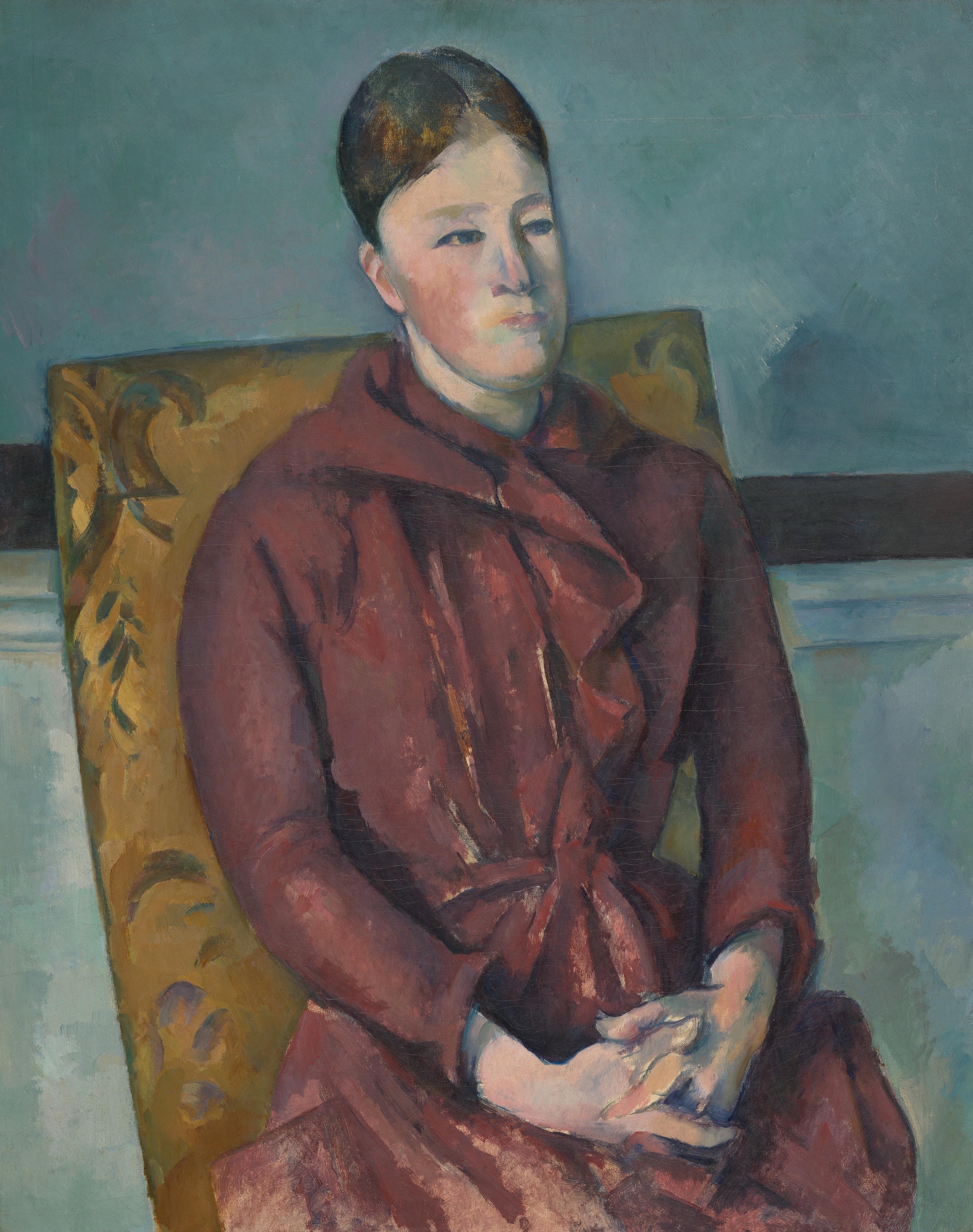
Paul Cezanne:
Madame Cezanne in a Yellow Chair (1888-90)
" … how to compensate for my obvious shortcomings."
"At some point during our upcoming engagement, you should come to believe that you've hired the most incompetent consultant that ever lived. It's what we choose to do then that will determine the success of this effort." This was how I often summed up my contracting conversation with a prospective client. It sometimes seemed even to me that I was attempting to sabotage the effort before beginning work, for even speaking of incompetence might awaken a genuine jinx and damn the effort before it started. Furthermore, in this culture, one should never speak of incompetence in the first person or admit to even glancing knowledge about the affliction. Incompetence is believed to exclusively belong to somebody else and never, ever, anyone's self, yet there I was, freely admitting an impending personal incompetence. I suppose I was daring my client to reject me or hold me blameless. My experience had taught me that every engagement would eventually encourage, if not insist, upon manifesting some incompetence. What value would I encourage by pretending it wouldn't happen this time?
It happens.
pRead
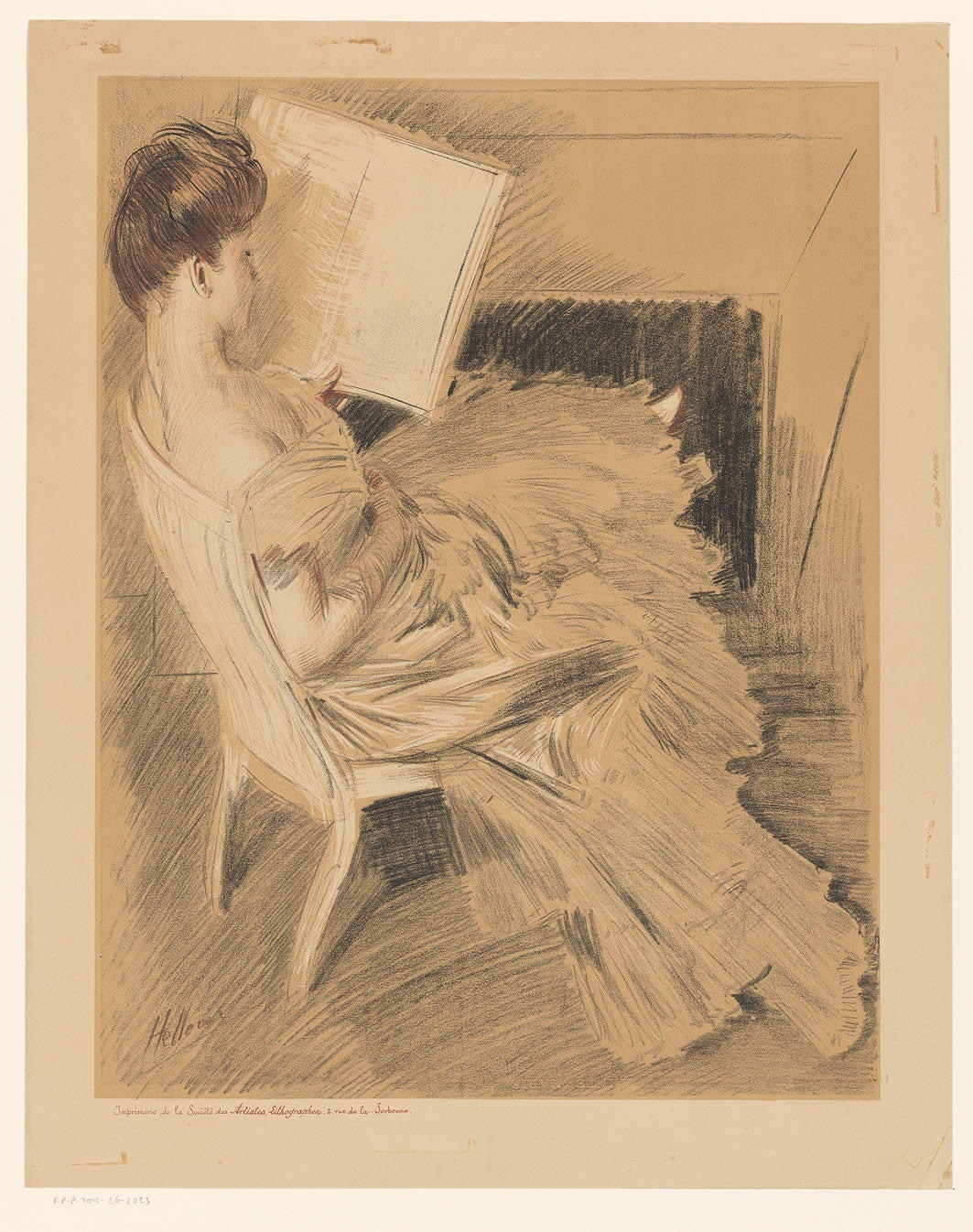
Paul César Helleu: Lezende vrouw in een stoel
[Woman reading in a chair] (late 19th Century)
" … destined to replicate that one imperative."
I noticed a difference when I first encountered information presented on a screen, a mid-seventies CRT, primitive technology by today's standards. Big and bulky, it required a heads-up stance to read what I had formerly mostly absorbed in a heads-down fashion. I found that I could not retain what entered horizontally. The information seemed to slip right through me. It seemed perfectly suitable for transmitting anything that shouldn't require remembering. Indeed, those CRTs were mainly employed to present reference information, data formatted into templates where the same information was placed in the same position from case to case to case. The application seemed ideally suited to disseminating such eminently disposable information. If it needed deeper scrutiny, a screen print function allowed for a more traditional presentation.
Later, training materials began migrating to the electronic platform, baffling me.
AlreadyGone
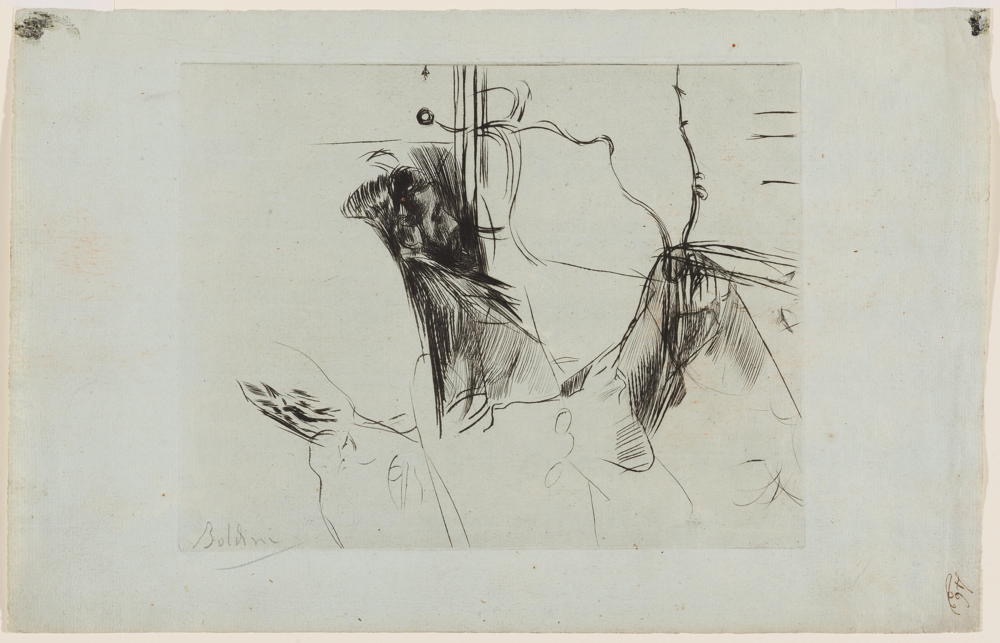
Giovanni Boldini:
Paul-César Helleu, Asleep (c. 1897)
"Time will come when time returns."
My priorities changed as I aged. Twenty years ago, I was all about presence. I actively practiced what I would have unashamedly referred to as "presencing," hoping to seize each moment or something. Twenty years later, I more often seek absence, an active disappearance into whatever I catch myself doing. If something's worth engaging in, it's well worth losing myself in, so I enter with the expressed desire to be transported elsewhere, where might not matter nearly as much as does that transcendent sense of having been utterly transported, slipping through the cracks, flying off the tracks, swiping an AWOL pass.
Flow, for instance, never seemed to be an example of presence but of absence.
WritingSummary 07/27/2023
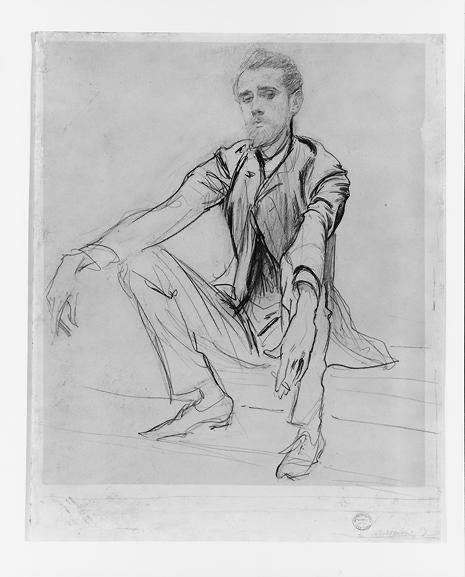
John Singer Sargent: Drawing of Paul César Helleu
from the early 1880s.
Sargent cherished this candid drawing
of his lifelong friend
and hung it in the dining room
of his Paris apartment.
To Confuse and Occasionally Astound Myself
I have this persistent sense that I really should understand whatever I'm doing by now, and some days I almost feel convinced that I might. Later, I stumble upon the depth—or the shallowness?—of my delusion to conclude that I do not know what I'm doing and never have. Should this not prove disqualifying? If I really don't know what I'm doing, what benefit does knowing bring? I realize or hope that purpose might remain emergent, never evident until long after the act. Its absence should not necessarily inhibit my continuing engagement, but writing remains a deeply faith-based initiative, not as advertised or anticipated. I might engage in serial bait-and-switch, but not to hoodwink anybody but myself. The stories tend to untangle themselves in longer runs, on a Contingency basis, often just when needed though rarely under foreseen conditions. I might write to confuse and occasionally astound myself.
Invisible
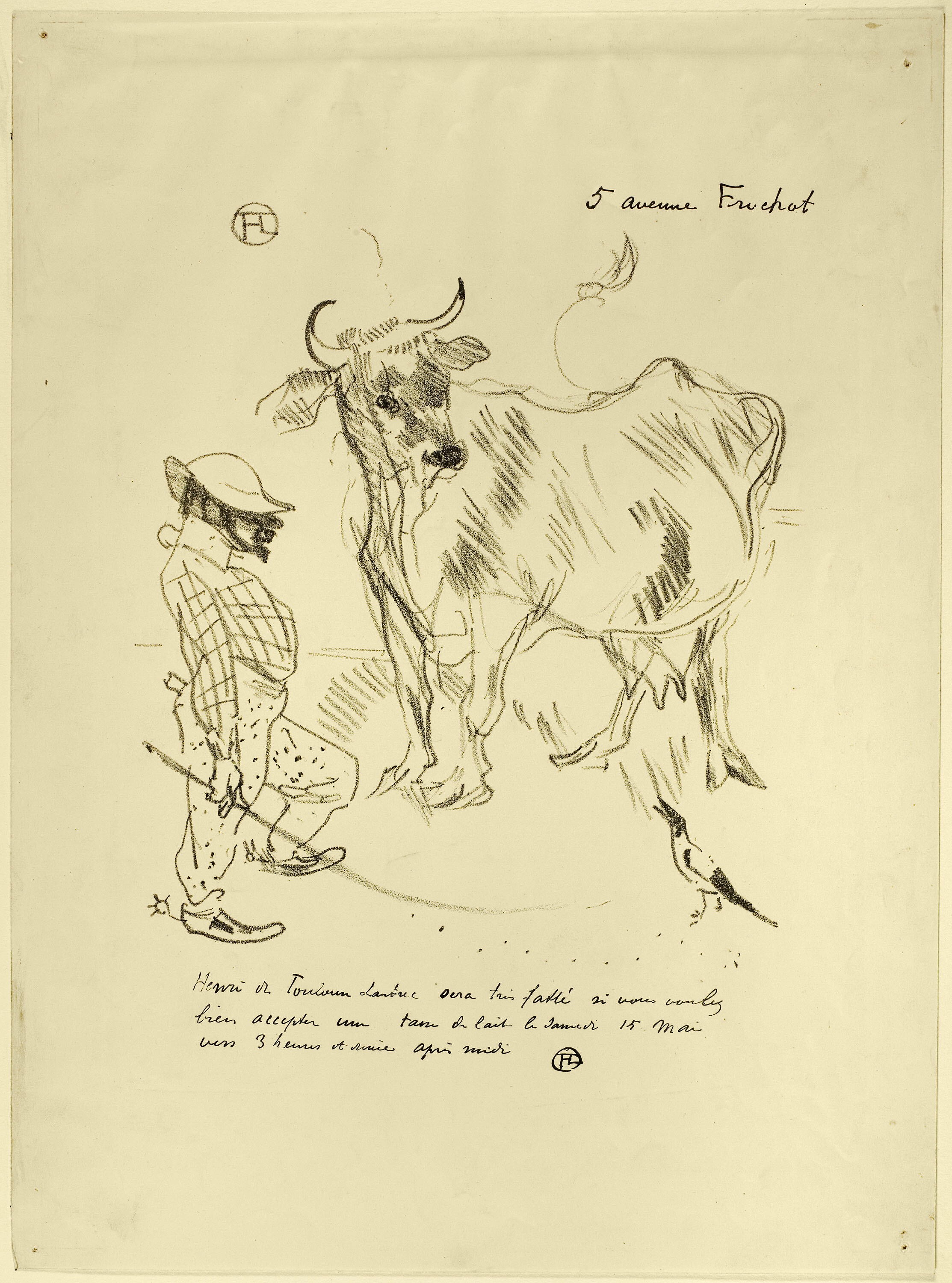
Henri de Toulouse-Lautrec:
Invitation to a Glass of Milk (1897)
"We see everything as we are rather than how it is."
Fortunately for us, this world remains altogether too big and far too complex for any of us to grasp. We too easily see pieces as if they weren't disconnected, and we quickly jump to otherwise unwarranted conclusions. We often misplace the knowledge that we fundamentally understand nothing. The budding satisfaction we feel when things finally seem to be coming clear amounts to the largest illusion by far, for that feeling might be desperately trying to tell us almost the exact opposite of what we suppose it says. We think it means we know when it should reinforce our deepening sense of ignorance. An abiding innocence accompanies all this fuss. We're never nearly as sophisticated as we suppose, and this, too, serves as a sort of buffer. It's very likely that nothing's our fault. Not Global Warming or the rising popularity of the right-wing media, for both were born from our insistent ignorance and the utter invisibility of everything surrounding us and from our unwarranted conclusions, the drawing of which perhaps constitutes our only truly human ability.
I do not intend to make excuses here.
Reconnecting
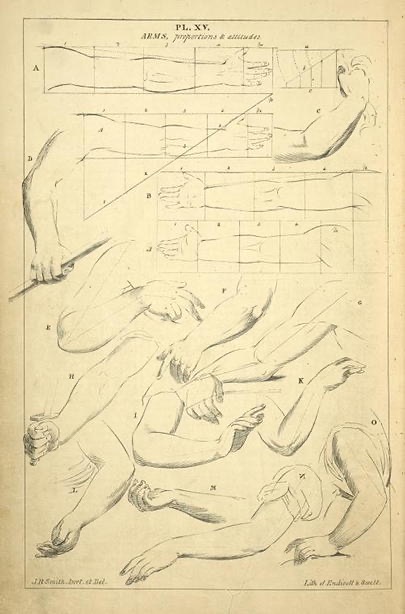
John Rubens Smith:
Arms - proportions and attitudes. (1831)
"Plot twists never redefine our heroes."
What experience serves as information and what as definition seems as a much better question, Mr. Shakespeare. To be or not to be comes in, at best, a distant second, for many different states of being exist simultaneously, and not being seems to take the whole question of that side of the equation out of the running. Being or nothingness or Being And Nothingness? These hardly amount to questions, either. The Information/Definition Divide continually haunts each of us and profoundly influences our choices. My fleeing bout of Deltoid Bursitis adopted both guises throughout its tenure. It arrived as simple information, spawning questions first focused on identifying causes. I then held no doubt that the disability would pass quickly. My denial of it characterized our initial relationship. I analyzed it as if it afflicted somebody else. I mostly felt confused by its informational content.
I later came to mistake it as definitional.
Reagency
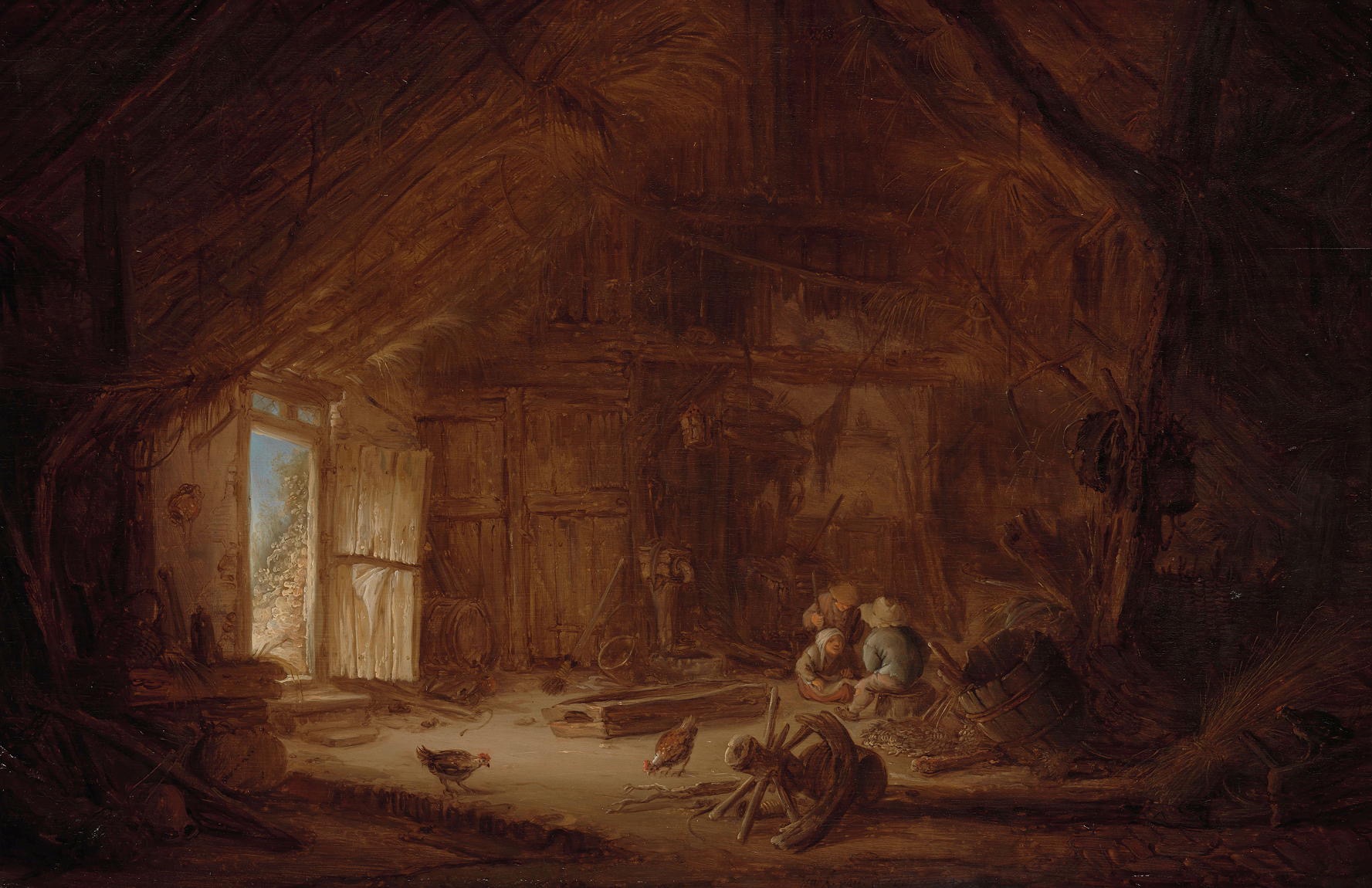
Isaac van Ostade:
Interior of a Stable with three Children (1642)
" … driving home with dirty blues blaring …"
By late July, the garden takes on a frantic aspect. Its regeneration has gone exponential. Cucumbers mature from flowers overnight, and The Muse leaves her morning perusal with both hands full of produce. The tomatoes come next, challenging our tolerance for beneficence and Caprese salads. The apricots produced five years of fruit in a single season, and even the geraniums have gone frantic, needing nearly daily deadheading. We're suddenly running to keep up with what seemed passive last week. It's difficult for me to remember that half the growing season's already gone and that abundance tends to be backloaded, appearing only well after seemingly unacknowledged nurturing occurred. The return comes later when it's almost completely disconnected from its origins, the entire operation utterly dependent upon equal portions of prior knowledge and patience.
I visited the acupuncturist yesterday, an entire month after scheduling the appointment, a whole month and more after the immediate care doctor gave me his diagnosis.
ContingentStory
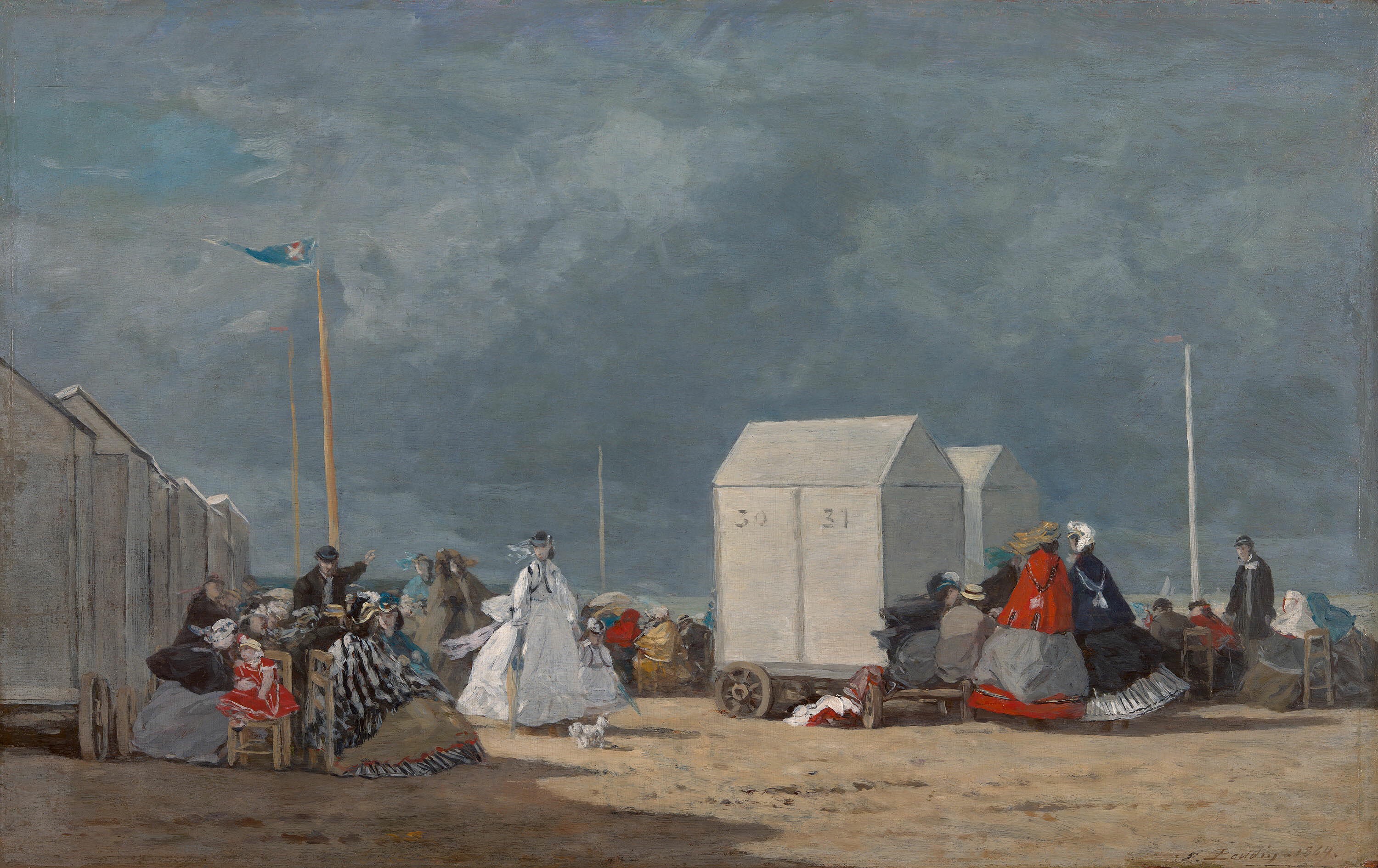
Eugène-Louis Boudin: Approaching Storm (1864)
" … the last taste of unremarkable normalcy …"
I write this story for another time, for the time when it will be necessary. Today is not that time, for all seems relatively healthy and humming this morning. One day, though—not today and probably not tomorrow— such a story will be necessary, and the need will be evident to everybody. It seems as though days follow head to toe in an unchanging succession, but sometimes something disrupts that rhythm, transforming the familiar into alien form. Nobody knows how to respond. We lose our minds then or find it impossible to find them. We have no pattern from which to draw. We only notice something missing. I write this story for that morning, for the time I know for certain is coming without knowing anything about when it might appear. When that eventually occurs, may I happen upon this story buried in my archives and find solace and reassurance. I do not know precisely what I might need then, but I can pretend this story might satisfy what I cannot foresee. Let this one serve as my ContingencyStory.
I direct myself to remember when, to look back to the morning when I created this story, back before the previously unthinkable happened.
Testing

Pierre-Paul Prud'hon:
Cupid Testing His Arrow
(Late 18th, early 19th century)
" … counting my cards, plotting my escape …"
I split these days between resting—forced idleness—and Testing—challenging my barriers. I'm supposed to cool my heels, but my heels already seem plenty chilled, and there's stuff in which I really should be engaging. The apricots won't pick themselves. The yard can't water itself, either, and supper, if it's ever going to come, requires some goading, some human intervention, or else I'll have to accept that I'll go without it again. I have my writing ritual to maintain, too, so I feel compelled to continue doing, albeit on a significantly reduced scale, or not doing will very likely become what truly ails me.
I was born to poke sticks into darkness, continually probing edges.
WritingSummary 07/20/2023
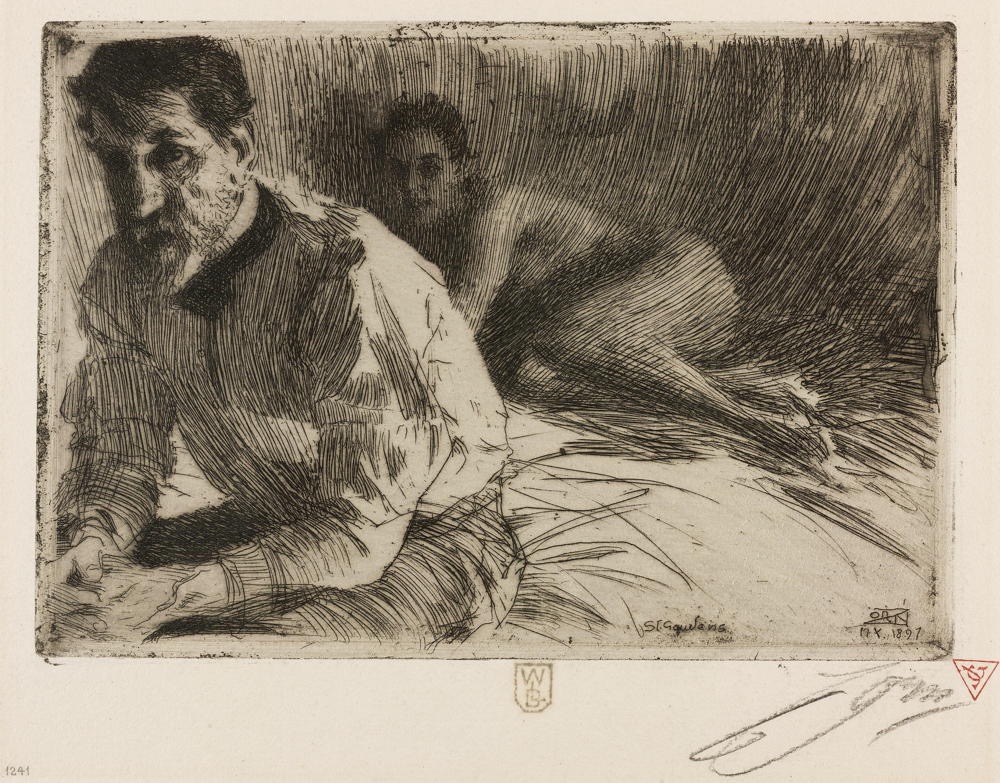
Anders Zorn:
Augustus Saint Gaudens II
[Saint Gaudens and his model] (1897)
A Step In A Very Long Cycle
I find partially decomposed apricot pits in my flowerbeds because in years past, I threw the culls into our compost heap, where the fruits would quickly decompose into rich dirt, but the pits would remain like small stones in the mix. The Rule of Compost insists that whatever ends up in there will be resurrected many times, eventually becoming indistinguishable from surrounding dirt—eventually becoming dirt—except for those pits, which remain for decades as markers of the dirt's heritage. This writing week found me loading up the compost heap with apricot culls again. We've had more bumper crop than we can keep up with, so each day has a period where I collect smashed remains. I set down tarps to catch most of them because it's easier to scoop up the goopier ones off the tarp than off the sidewalk. This chore will be the first step in a very long cycle, one which will continue long after The Muse and I leave this place behind us. This weekly writing summary seems like a similar effort, a step in a very long cycle, too.
Weekly Writing Summary
I began my writing week recounting my experiences U Picking produce after an afternoon picking somebody else's cherries in ForToBe. "I seem to need to be a multiplicity, switching roles and identities. I could never bear to merely remain whatever I'd become. Achievement breeds its own dissatisfactions."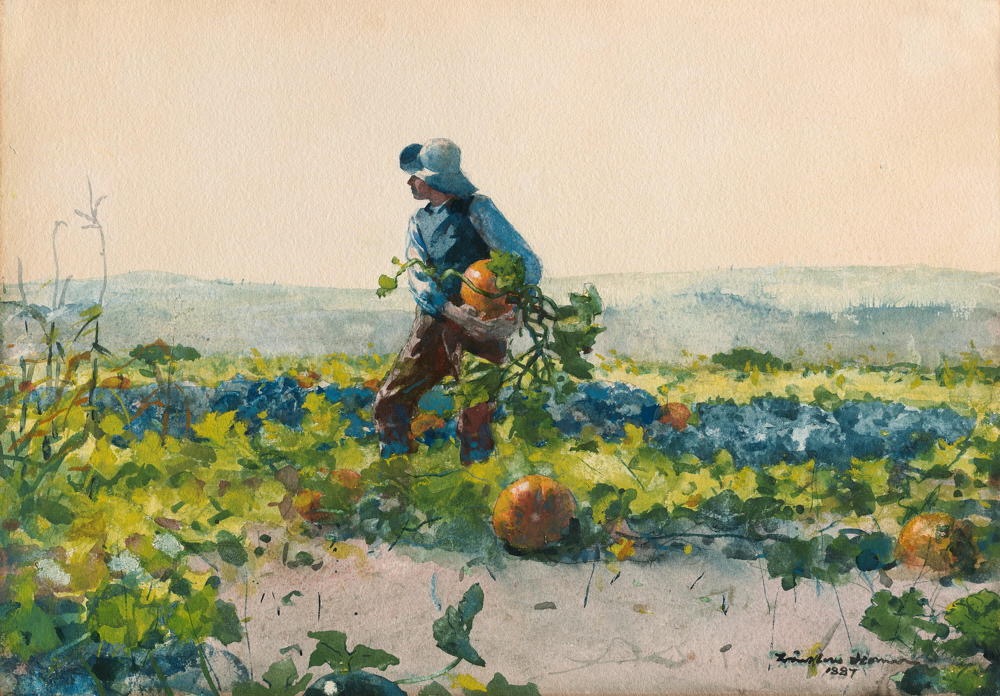
Winslow Homer: For to Be a Farmer’s Boy (1887)
"ForToBe a farmer, or a manager, or just a writer sometimes."
—
I continued writing, remembering when I discovered a cache of my mother's home-canned Italian Prunes when cleaning out the old home place in Preserving. "We preserve for an uncertain future. Perhaps we only preserve for ourselves. Or maybe, just maybe, we preserve to preserve the tradition."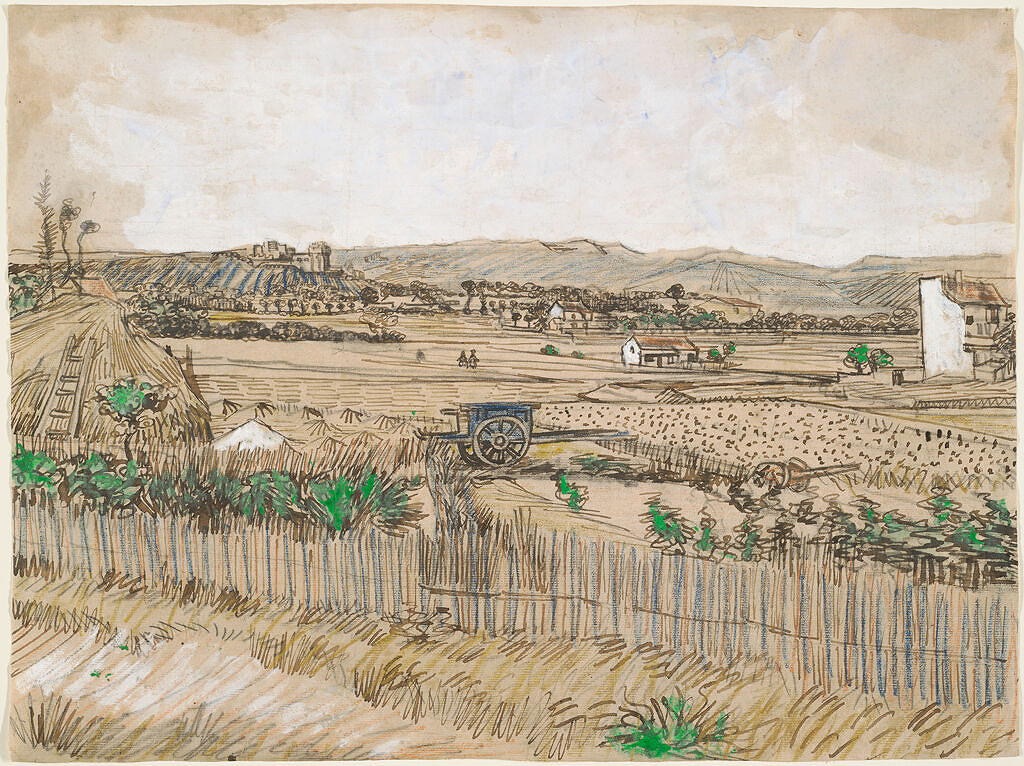
Vincent van Gogh: The Blue Cart
[Harvest at La Crau] (1888)
" … wipe away my leaking past."
—
I explained how I source the images I use in my postings in Museo. "It's a brilliant contribution, and in the spirit that I post and in which the Internet was created, it's not seeking profit, just a better world."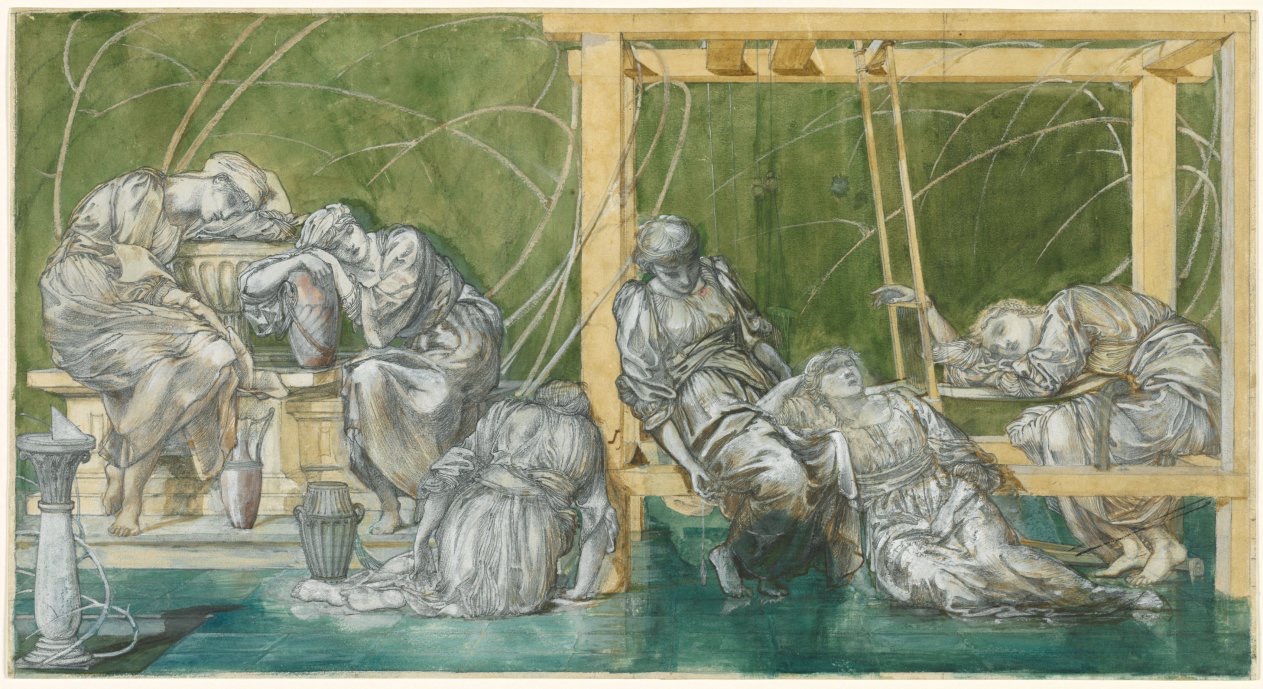
Edward Burne-Jones: The Garden Court (1870–75)
" This work continues in earnestness and love."
—
I told the story of what I labeled the StandardDilemmas, those situations which render us powerless. "We're raised on fables and typically so damned full of ourselves that we cannot quite believe in our occasional powerlessness. We rarely acquiesce, thinking it a form of cowardice, so we make a fuss and produce much of the drama surrounding us."
Lucas van Leyden:
The Expulsion from Paradise (1510)
" … continue collecting experiences."
—
I described how a friend had agreed to pay a cool half million dollars to buy a hovel in a neighborhood of other half-million dollar hovels in *Homemading. This story proved the most popular this period! "Societies thrive on humble beginnings that promise, fifty years hence, a fenced yard where the grandkids can romp with the neighbor kids."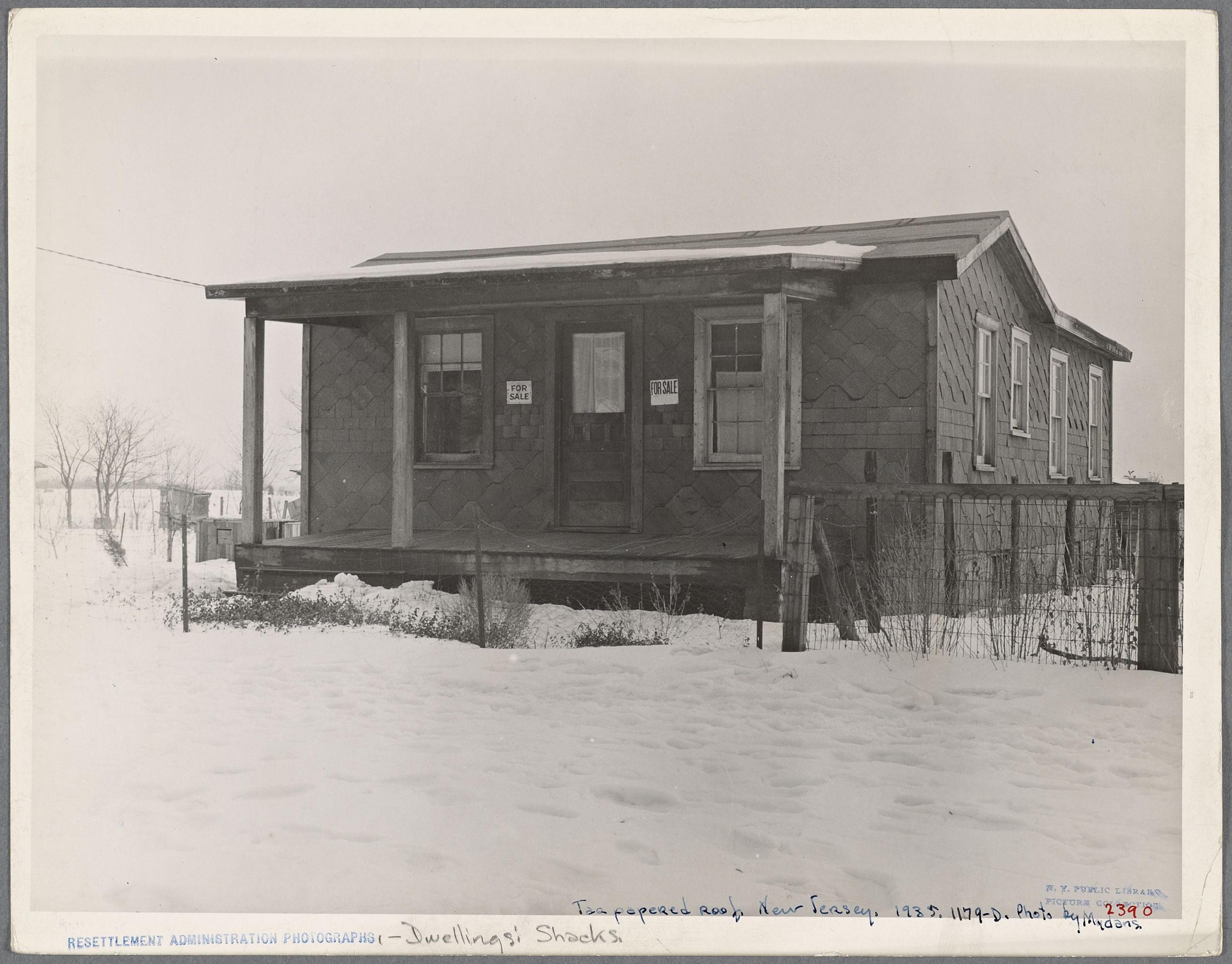
Carl Mydans:
Tar papered house in New Jersey. (1936)
"Societies go to wither and die where everybody tries to earn a cool million in real estate."
—
I next spoke of dreams not coming true and of how I managed to get through my first great disappointment by playing A Different-Shaped Guitar. "I lost nothing of substance when I hit that wall. I only lost a medium that, truth told, had not been working for me for a very long time. Dreams, even the best of them, can only ever sustain a dreamer so far."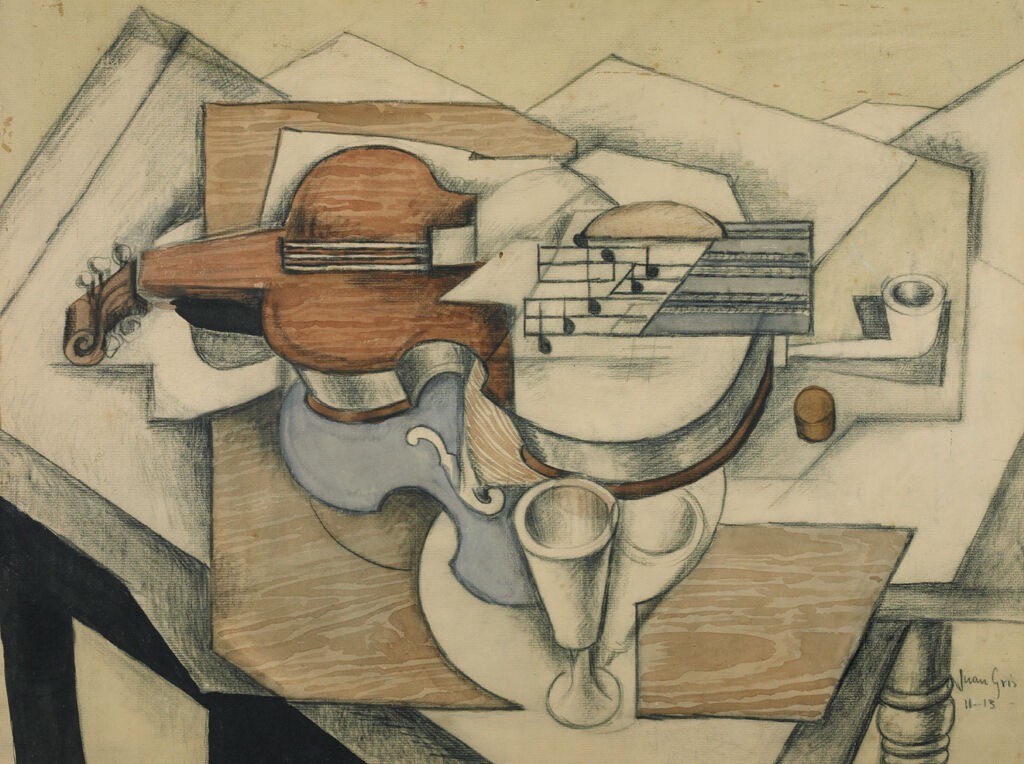
Imitator of Juan Gris: Still Life with Guitar (1913)
" … a success or a failure might depend upon nothing other than whether …"
—
I ended my writing week on a serious but lighter note, describing what I personally consider to be SartorialSanity. "The Muse is forever asking me how I like her "top" I hadn't noticed. I almost always insist that whatever she's wearing looks just fine. I wonder what she thinks she's doing, asking the opinion of someone who considers his stained Chambray painting shirt the height of SartorialSanity."
John Singleton Copley: Nicholas Boylston (1767)
"It's all about how they feel."
—
We're in that season where every morning promises to turn into Too Darned Hot before noon. Early morning offers the only respite. The cats and I inhabit those hours like refugees, reveling in sweet breezes before they become dehydrating again. MidSummer's a dreaming season, like its first cousin MidWinter, where sanity depends on an active imagination. I began this writing week with ForToBe, imagining someone I only occasionally get to be and never completely. The Muse and I accomplished some Preserving, thinking we were mainly trying to preserve ourselves and our traditions. I stumbled into a nest of Standard Dilemmas. Who doesn't sometimes? I was reminded of the downside of ever-expanding real estate markets and fondly recalled learning to play A Different-Shaped Guitar. I ended the week appreciating the insanity that manages, most days, to keep me sane and beautifully dressed, at least according to my standards. Thank you for following along here.
©2023 by David A. Schmaltz - all rights reserved
SartorialSanity

John Singleton Copley: Nicholas Boylston (1767)
"It's all about how they feel."
I have been Honing my fashion sense since my early teens, and I formally swore off short-sleeved shirts. During my professional career, I insisted on wearing starched shirts and woolen trousers regardless of the season, later gravitating toward blue jeans and simple cotton shirts. In recent years, I've reduced my wardrobe to the basics: long-sleeved blue chambray shirts, blue jeans, and Barefoot® shoes. My nod to seasons includes optional socks in the summer and cotton jersey pullovers through the cooler months. My closet holds a dozen almost identical cotton shirts and a spare pair of jeans. That's as dressy as I ever care to be these days.
I do not wear shorts, whatever the weather.
A Different-Shaped Guitar

Imitator of Juan Gris: Still Life with Guitar (1913)
" … a success or a failure might depend upon nothing other than whether …"
At some point in their career, everyone hits their wall. The fortunate find more than one. The experience fully qualifies as the most discouraging anyone ever encounters because it represents the end of a long and satisfying dreaming period. The Wall, at first innocuous, eventually becomes a serious barrier, impossible to go over, under, around, or through. What's a protagonist to do in the face of this flummox? The standard answer responds "Something else." Anything else.
The 'anything else' comes as a forced choice, a coerced alternative that nobody would ever wish upon themselves.
Homemading

Carl Mydans:
Tar papered house in New Jersey. (1936)
"Societies go to wither and die where everybody tries to earn a cool million in real estate."
The Villa Vatta Schmaltz was no villa when The Muse and I bought the place nearly a quarter century ago. It then promised to serve as our fixer-upper, our bottomless money pit, our eventual salvation. We paid too much for it, which would not get us into a dilapidated garage in the current market. Like many neighbors, we could not afford our place if we tried to buy it at today's prices. Today's real estate prices have always seemed insane. Yesterday's have always seemed crazy, too, but for the opposite reason.
I bought my first house for $49,950.
StandardDilemmas

Lucas van Leyden:
The Expulsion from Paradise (1510)
" … continue collecting experiences."
I believe in the existence of a set of StandardDilemmas whose primary nature has always been that they utterly negate human agency. No matter what even the most well-meaning human might muster in the face of any of these, that human will remain utterly powerless against it. One might exhibit wisdom when encountering one of them to cede to the superior force, to go without much kicking or screaming, for they represent incarnate fate. If there's nothing to be done, then nothing might serve as the proper response. Yet people rarely exhibit such rationality when facing inevitables. We're raised on fables and typically so damned full of ourselves that we cannot quite believe in our occasional powerlessness. We rarely acquiesce, thinking it a form of cowardice, so we make a fuss and produce much of the drama surrounding us. If the arrested person would just go without a fuss as the arresting officer thoughtfully asked, the unfortunate experience might pass without raising a ripple in the pond. We often insist upon making needless tidal waves instead.
It's not that we don't usually know when we've encountered one of The StandardDilemmas.
Museo

Edward Burne-Jones: The Garden Court (1870–75)
" This work continues in earnestness and love."
Their structure has changed in the six years and counting since I began writing these story series. Early postings featured inconsistent format from story to story, though all have remained about the same size, approximately seven hundred words, give or take. Each has featured an image, one which I used to help me focus, for I always, always, always seek an image first before I start writing a story. The image allows me to envision what I'm doing and serves as my companion as I create. I often find myself taken by an image, its creator's story, or both. You might have noticed that sometimes I've employed a series of pieces by the same artist over a week or ten days because I was just so taken by that artist's work, Matsubara Naoko a great example.
Finding that art has become easier over time.
Preserving

Vincent van Gogh: The Blue Cart
[Harvest at La Crau] (1888)
" … wipe away my leaking past."
After my father died and my mom relocated from the family home into assisted living, I helped clean out that old home place. It was over-filled with memories of times by then long past, as embodied in my mom's knick-knack collection, the mere existence of which spoke of bygone ages. Do people still collect knick-knacks? Most stuff elicited no emotional response from me, but somebody in the family found almost every "treasure" evocative. For me, the basement Fruit Room held by far the fondest memories and evoked an epic lumpy throat. Those shelves behind those plain plywood doors held at least thirty years of Preserving experience in fine quart jars still lined up like well-disciplined soldiers standing at attention.
There were Italian Prunes from the late sixties, I swear. I think I was there when she "canned" them in the steamy mid-summer kitchen.
ForToBe

Winslow Homer: For to Be a Farmer’s Boy (1887)
"ForToBe a farmer, or a manager, or just a writer sometimes."
Fruit picking has been a part of my life since I was a toddler. I felt liberated yesterday when standing near the top of that tall orchard ladder with my head nearer the stars and my hands pulling five, six, seven, or eight cherries off at a time! Whatever the crop, my experience seems similar. I face a randomly-distributed collection that I try to tame. I feel challenged to figure out a process that promises progress as well as satisfaction. I often need to recover almost-forgotten techniques, though no harvesting yields to any single best way. The Muse scrambles up very near the top of any ladder she climbs, preferring altitude above all else, while I typically make my stand mid-way. We pick at almost the same rate.
Some crops demand that I get down on my knees as if to pray and reverently harvest.
WritingSummary 07/13/2023
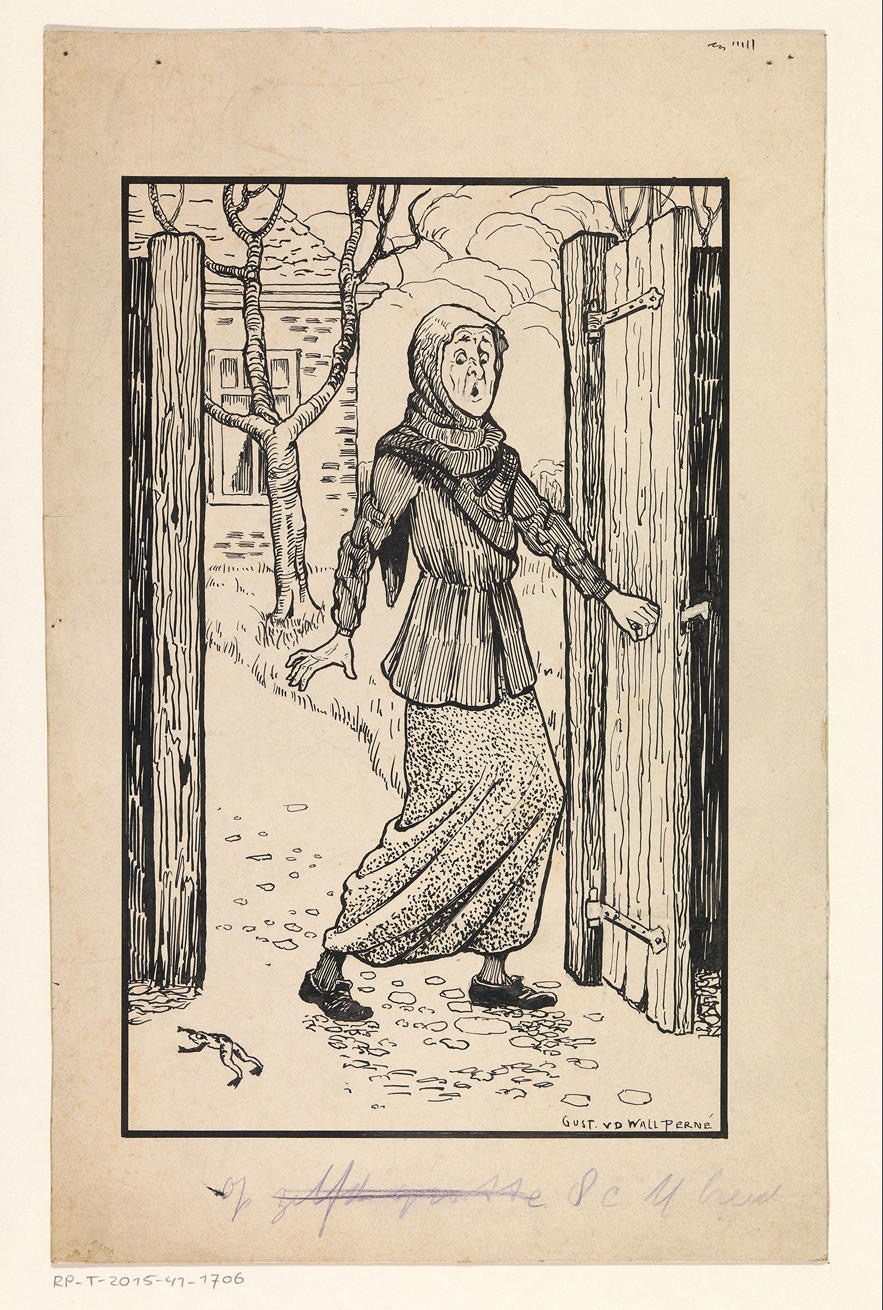
Gust van de Wall Perné:
Vrouw schrikt van een kikker
[Woman scared by a frog] (1887 - 1911)
More Abundant Than Strictly Necessary
This writing week was a genuine embarrassment of riches. The apricot tree's fruit finally ripened, always a momentous happening. It produces more fruit than any ten families could reasonably consume. I realized I still needed to purchase a tall ladder to reach the highest branches. This fruit ripens first and plummets to the ground or onto anyone passing beneath. The fruit seems almost liquid, splatting in joyous reunion with gravity and the Earth. I spend some time each morning shagging fallen cots, collecting their smeared carcasses before interring them in the compost heap. The world seems too alive by at least half, and The Muse and I rush to try to keep up, a fool's mission, a cherished task. This world seems more abundant than strictly necessary, extravagant, and ultimately wasteful. It specializes in conspicuous production, so we might specialize in conspicuous consumption. The homegrown heirloom tomatoes even started coming on. Harvest should continue uninterrupted until after Autumn arrives.
Pairings
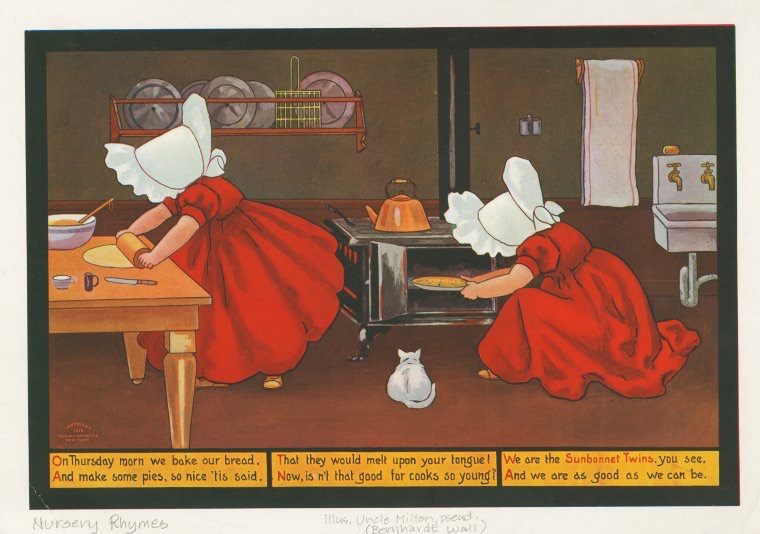
Bernhardt Wall: Sunbonnet twins baking. (1906)
" … just like every other Pairing of The Muse and her surroundings …"
The Muse continues to hone her political presence. Two months into her campaign, she's repeated her elevator speech dozens of times and has yet to completely memorize it. She is not practicing as an actor might with the idea of replicating each performance but with the notion that each iteration might prove authentic. Authenticity changes from performance to performance as each occurs within a unique context. There's never any telling which part of any context might prove defining. Sometimes it's the people, and other times, the hall; consistency couldn't possibly be the purpose of her practicing.
Here in this wine country, there's a lot of talk of Pairing, for each wine best combines with some sample of each menu.
WorstKept
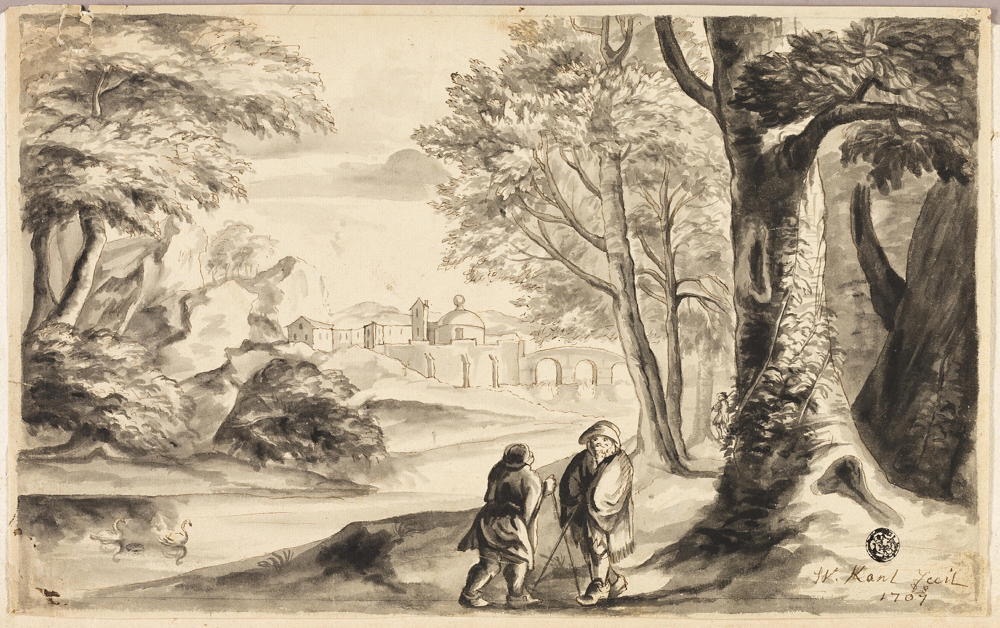
Unknown artist (German) or William Kent
Two Travelers under Tree
with Village and Bridge in Distance (1707)
"Thanks ever so much for finally …"
With the possible exception of confidential and top-secret government material, the best-kept secrets tend to be the WorstKept ones. This conclusion partly stems from the inescapable fact that anyone holding a secret might as well carry a neon sign across their chest declaring that they're holding a secret. With the possible exception of deep cover spies, almost everyone can tell when someone's withholding the whole truth and nothing but. That private business almost always turns out to be a whole lot more public than its holder ever suspects. If the lips don't loosen, some other body part will. As humans, we seem to ache to disclose, and this innate need renders our secrets into an abstruse form of public knowledge. They might not know the details yet, but they know for sure you're withholding and that the underlying story's eventually coming.
It's usually just a matter of waiting or asking.
CuttingCords
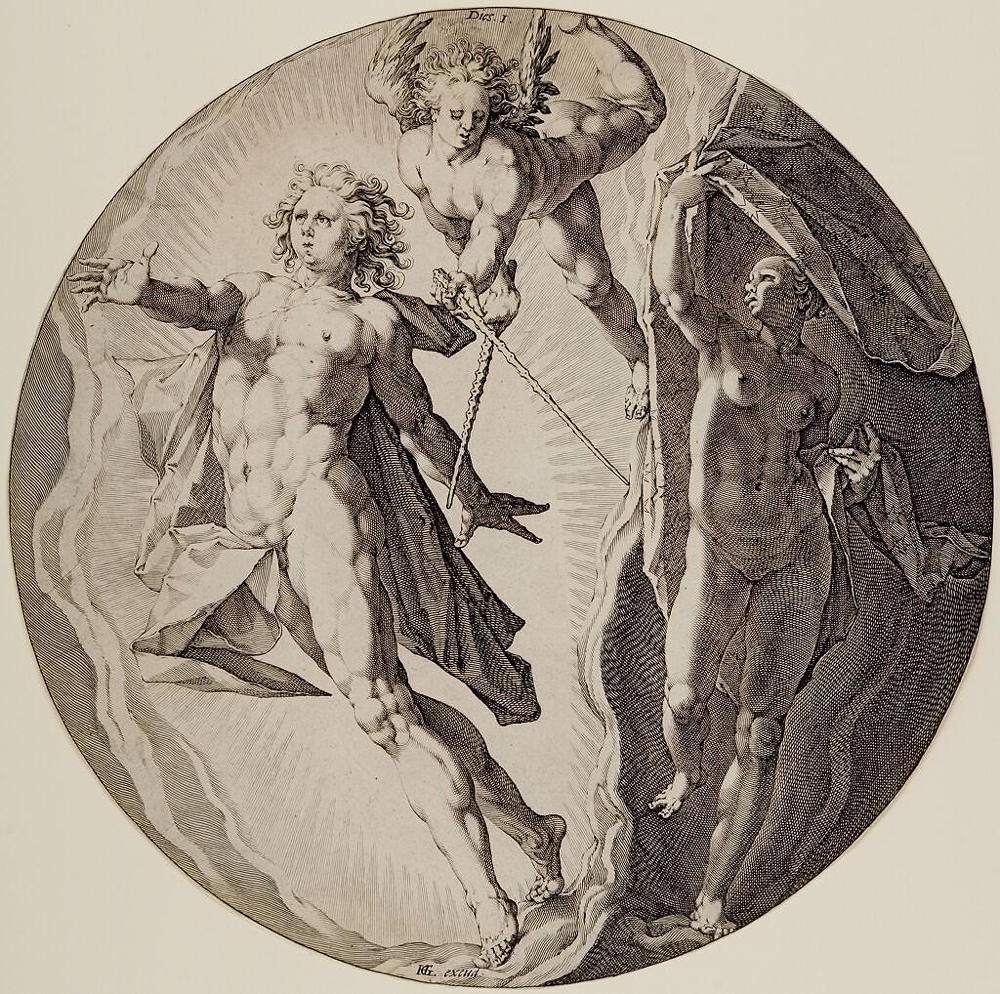
Jan Harmensz. Muller:
Creation of the World: Day One,
separation of light from dark (1589)
"I might regret the radical act, but later."
I'd decided when I first reviewed the standard contract they'd sent in response to my query. I'd been dreaming of working with this publisher for over a year, yet when confronted with the details of what that might entail, I knew in that instant we'd never consummate a deal. I'm no lawyer, a declaration my Business Law professor insisted I memorize, but I didn't need to be an expert in contract law to recognize an embarrassingly amateurish piece of ‘work.’ I felt embarrassed and angry. Embarrassed for the representative offering this P.O.S. and angry that anyone would have ever thought it might pass muster under any condition. I thought it must show the state of desperation and innocence combined in aspiring authors that anyone would ever sign such a thing, and then I felt embarrassed all over again for my compatriots.
A part of me thought I might have been too picky.
Wronging

Hans Weiditz (II):
Behaarde man kruipt door een bos
[Hairy man crawls through a forest] (1514 - 1531)
" … without expecting to eventually avoid making more."
The Honing life involves more than and seems different from positive feedback loops. It primarily entails catching myself doing something wrong and nudging myself closer toward some path of righteousness, correcting my error if possible. My legacy might end up being a long series of close misses with a few more spectacular further misses sprinkled in for variety. Few hits and many, many misses. In the end, I will contend that I was in the game without often experiencing a winning season because my standards were never quite satisfied. My successes were failures, too, not usually on the scale of my catastrophes but of similar quality.
This lifestyle's no tragedy, far from it.
RealPain
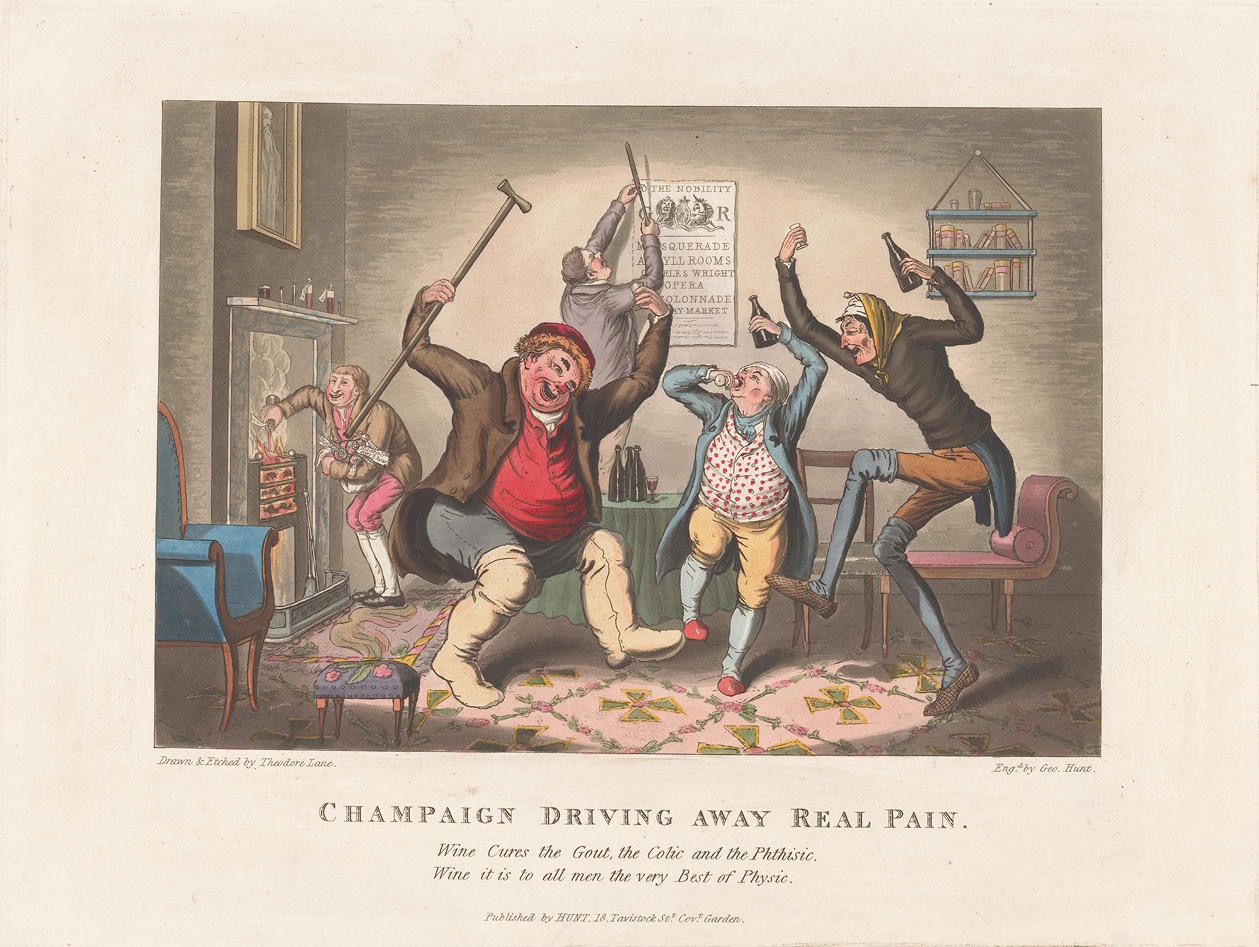
Theodore Lane: Champagne verdrijft de pijn
[Champagne driving away real pain] (1825 - 1826)
"Waiting seems the worse sort of RealPain."
I, probably like you, have sometimes been called a real pain in the ass. I confess to the charges even though I struggle to accept the concept of RealPain, for pain seems almost entirely illusory. That's not to say that pain can't make a reasonably convincing case that it sometimes has substance; it's just that whatever that substance might be, it seems extraordinarily elusive. Even medical doctors rely upon a silly cartoon chart to asses pain levels, and their test requires patients to assess and report their own levels when most patients lack adequate experience to pass such judgments. My little sister, who would cry at the drop of a hankie, might declare a pain level of eleven for something I'd most likely label a twinge.
I've lived with chronic pain but learned not to take it very seriously.
ZombieLand
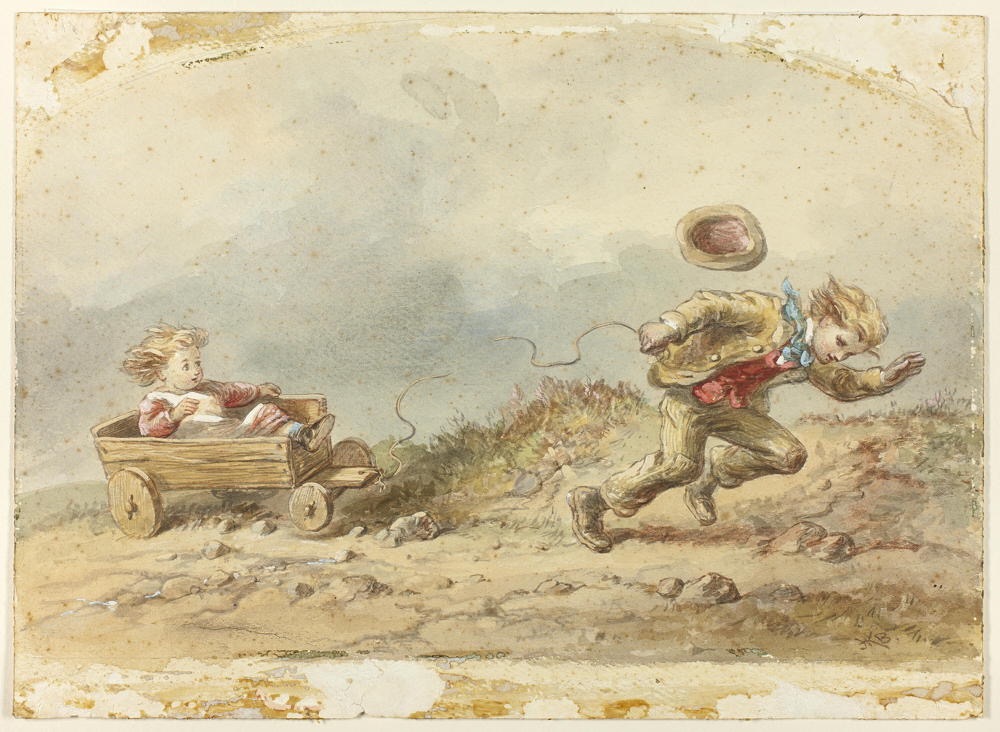
Hablot Knight Browne:
The Broken Cart-Rope
(n.d.-mid-nineteenth century)
Just before the 1929 market crash, economist John Maynard Keynes predicted that his grandchildren would, a hundred years hence, inhabit a world requiring them to work no more than fifteen hours per week. Even then, he insisted that fifteen hours would provide more labor than the economy would strictly need to effectively operate. We easily notice today that this prediction has yet to come to fruition, though we might notice too easily and miss seeing what's happening around us. Yes, most report ever-growing pressure to work ever more hours. Yes, overwork has developed somewhat of a cachet, a status symbol such that those who work the most believe themselves to be the most essential. Yes, everyone complains about their lack of leisure time, but I'm curious if leisure means what it meant back in 1929 when Keynes published his prediction.
Leisure time then didn't include a minute of cell phone time.
TottingUp
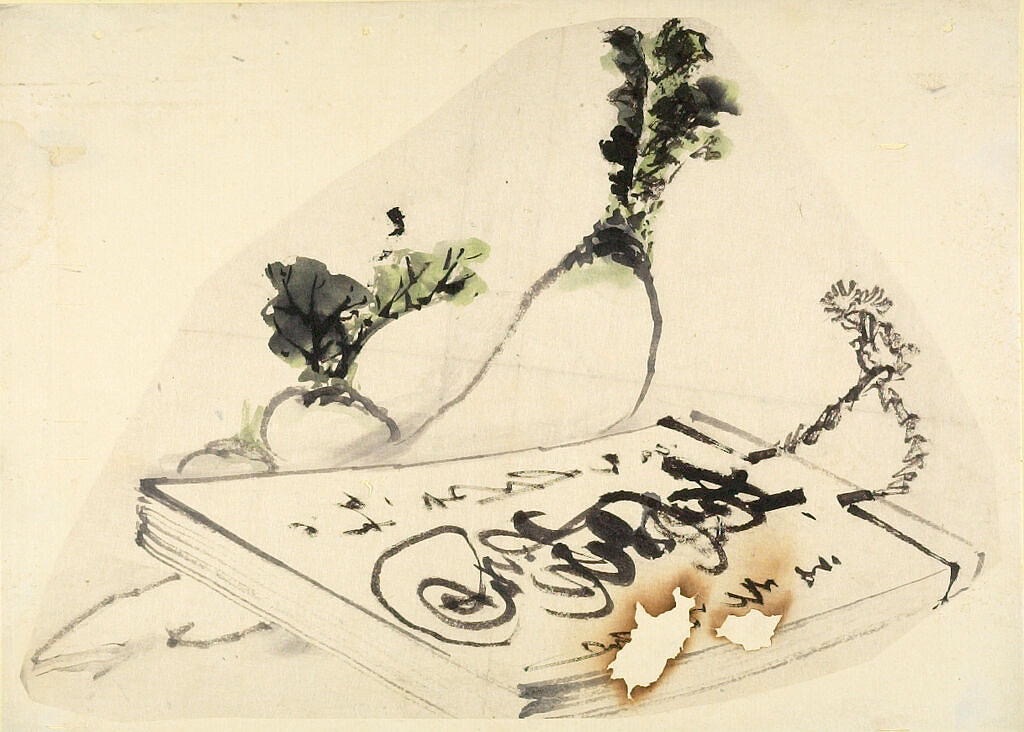
Unknown Artist:
Daikon Radish and Accounting Book (19th century)
“Data-Driven crazy …”
Come Friday morning, I'm TottingUp the week's receipts, just as if I ran a small business. I count the customers and imagine significances like bean counters have always done. I avoid the formal metrics, Google Analytics® and the like, because something about how I initially organized my web presence rendered it impossible to formally evaluate. I count contacts instead: likes, comments, and views assigning a nominal value of one (1) to each. For instance, a post like this week's Discernment attracted forty-nine views, no comments, and a single like on Facebook. It also showed twelve accesses via a LinkedIn link and twenty-one via my newer Substack path, for a total of eighty-four somethings. I have no idea what that number means other than it represents something equally indeterminant and rewarding. It's my payoff!
Since each of my stories seems separate and unique, they aren't comparable.
WritingSummary 07/06/2023

Lucian and Mary Brown:
Untitled [baby reaching for typewriter] (1950)
We Almost Exclusively Worship Mammon
General Electric, the once proud exemplar of mid-century industrial America, spouted its motto: "Progress is our most important product" in grandiose television advertisements. Productizing progress seems a fair portrait of our post-war arrogance, one still firmly held by our more conservative neighbors. GE's pride prefaced their fall at the hands of another CEO who firmly believed himself brighter than everyone before him. The ones since he retired have found ample reasons to wax their vitaes, too, since history seems to see old Jack Welch as short-sighted now. Such is vision when it confronts experience. It becomes so much schmutz on the old eyeglasses, eventually in the way of seeing what's right before one and whatever's behind. I exclusively wend my way. I take my time. I'm in no hurry to arrive; Lord knows where. I'm more of a journey-focused person. I feel fortunate to have stumbled into my present and even to be dragging my considerable past behind me. I gratefully do not have to drag all that much progress behind me. It might be that the Chamber of Commerce's mid-century characterizations of the future coming, featuring flying cars driven by Spandex® citizens, helped me better appreciate how it was rather than worship progress. I'm down on my knees most mornings whispering prayers of thanksgiving that this nation was not founded Christian. We almost exclusively worship mammon here, if we can think of that as any kind of organized religion.
OutOfSight
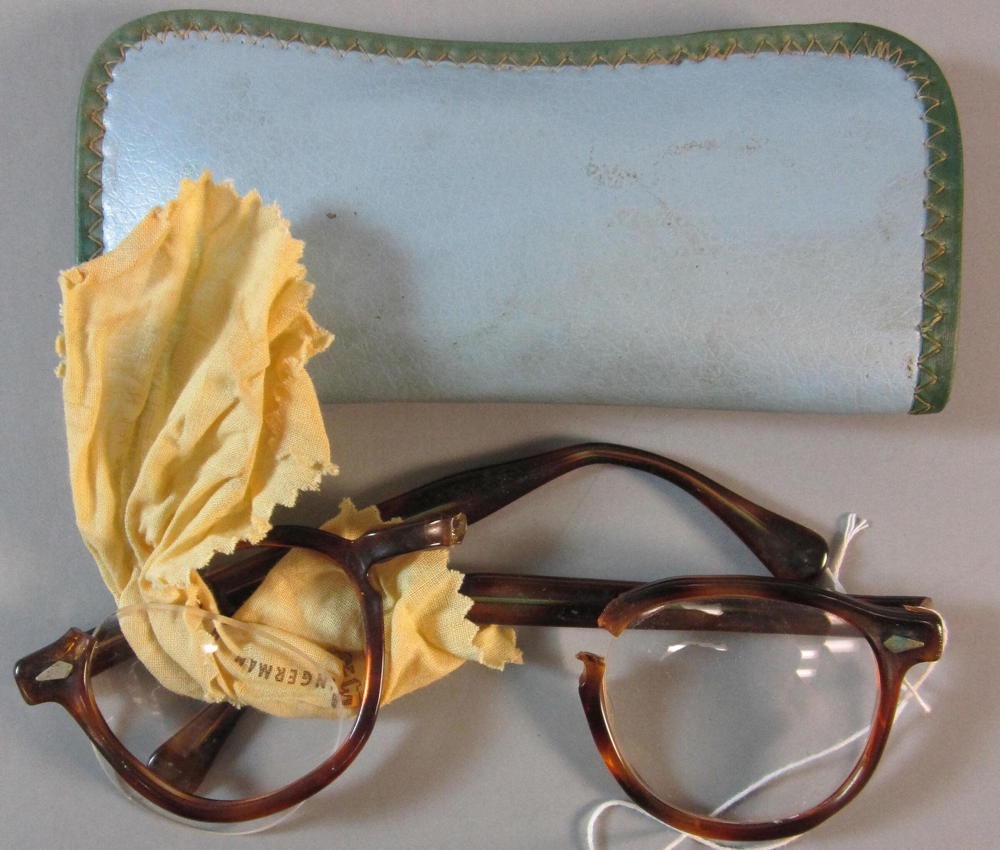
Collection of Barnett and Annalee Newman:
Eyeglasses, in case (20th century)
" … everything becomes clearer."
My eyeglasses collect schmutz better than any other substance known to man. I cannot keep up with them. Further, this schmutz seems invulnerable to any but a serious professional's hand. I, for instance, am powerless to clean my glasses. The Muse is forever noticing that I probably cannot see anything through the grimy layer accumulated on my lenses. She's apt to snatch them from my face, take them into the kitchen, and subject them to vigorous scrubbing before returning them, disgusted at my lack of hygiene and caring. I have grown indifferent and consider it my fate to move through the world half-blinded by schmutz. I occasionally visit a local optometrist to get that stuff professionally removed. My latest visit started a mystery that entertained me for two full weeks.
The person cleaning my glasses noted that the lenses had become seriously scratched in addition to the almost impenetrable layer of Schmutz.
RetailPolitics
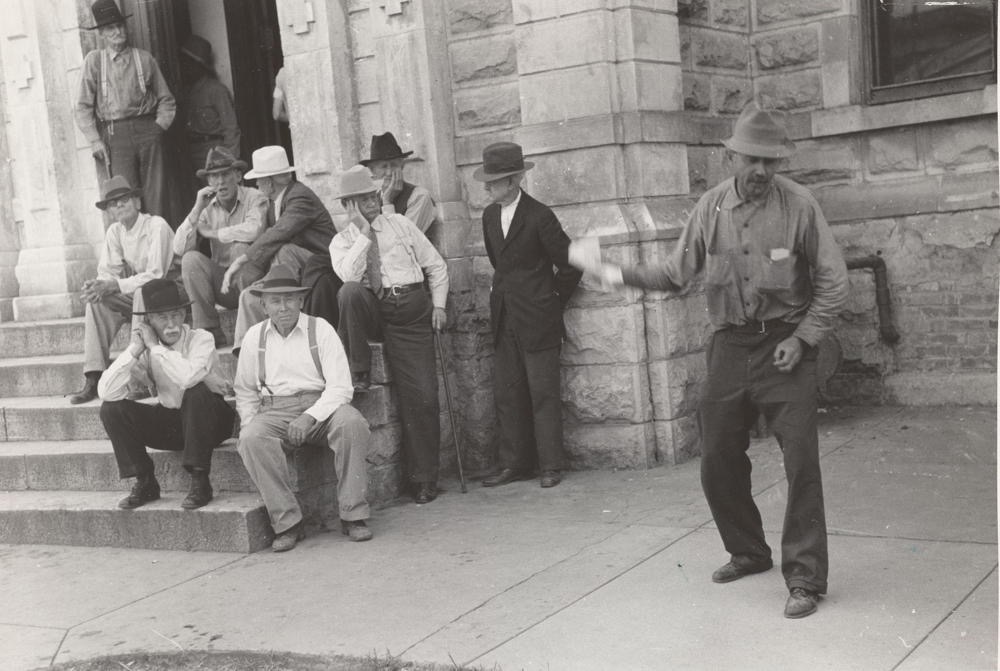
Russell Lee:
Group of residents of Weatherford, Texas,
listening to politician speak
(1939)
"This just seems a fait accomplis."
Politicians, like used-car salespersons, mostly deserve their terrible reputations. They seem to shave the truth more proficiently than a barber might shave a baby and just as unnecessarily. We approach them warily, if at all. We understand that they can put almost anybody under a thrall. We swear we will not fall again then we reliably do. We hold ourselves to blame but sense something profoundly unsound in our characterization. The politician can seem to be everybody's friend and also frame anybody as their enemy, seemingly the same person, sometimes simultaneously. We sense a dark art at work, another bait and switch, yet we still take sides. We justify the better of two obvious evils before voting the same straight ticket. Forced choice voting often leaves us sensing little choice at all.
The Muse is running for public office and so might well be fairly characterized as a politician, a politician being one who runs for public office.
MakingDo

Lewis Wickes Hine: Making Pittsburg Stogies (1909)
"Envy us."
The Muse and I feel blessed to live very near the end of most commercial logistics networks. This Center of Our Universe isn't conveniently on the way to or from anywhere. Our founding fathers made deliberate decisions to isolate this valley. Rebuffing the railroads, they chose to forego what would have most certainly caused commercial development. At the time of the great silver rush into Northern Idaho, Spokane, today a city of over 200,000 souls, amounted to a sawmill and an isolated Indian Agency. Walla Walla reached its commercial peak then, about the same size as now, with both prospectors and their supplies routed North through what was then the commercial center of the whole Northwest. No longer.
Likely, a few things on our shopping lists will not be available here for any price.
Garge
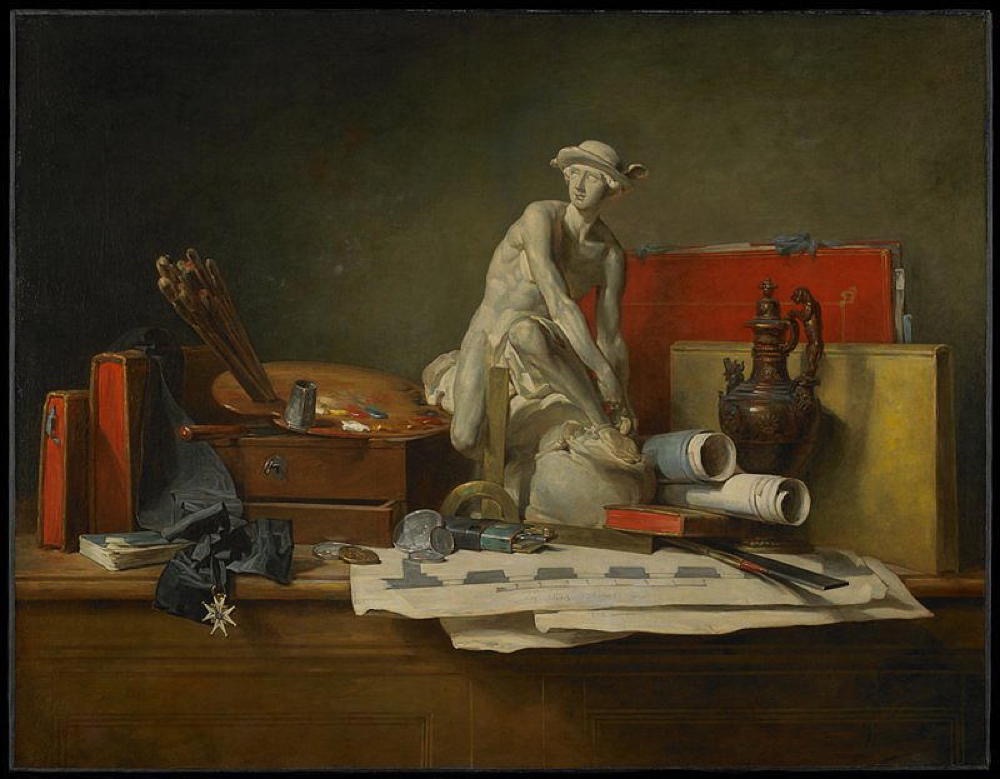
Jean-Baptiste-Siméon Chardin:
The Attributes of the Arts and the Rewards Which Are Accorded Them
(1766)
" … I tidy until my soul can breathe again."
I think of myself as reasonably fastidious but lapse a lot in practice. My garage serves as my center, the abiding indicator of my general well-being. For many, their desktop serves this purpose, the clutter or absence of it the reliable outward sign of an inward orderliness. My desktop has never not been an apparent disaster, yet I can place a finger on anything teetering there faster than I can recover anything anywhere. Obvious clutter does not necessarily speak to internal disorderliness except in the case of my garage or, as I refer to it, my Garge.
Being the absolute center of my universe, my Garge says most about my mental health.
Arcing
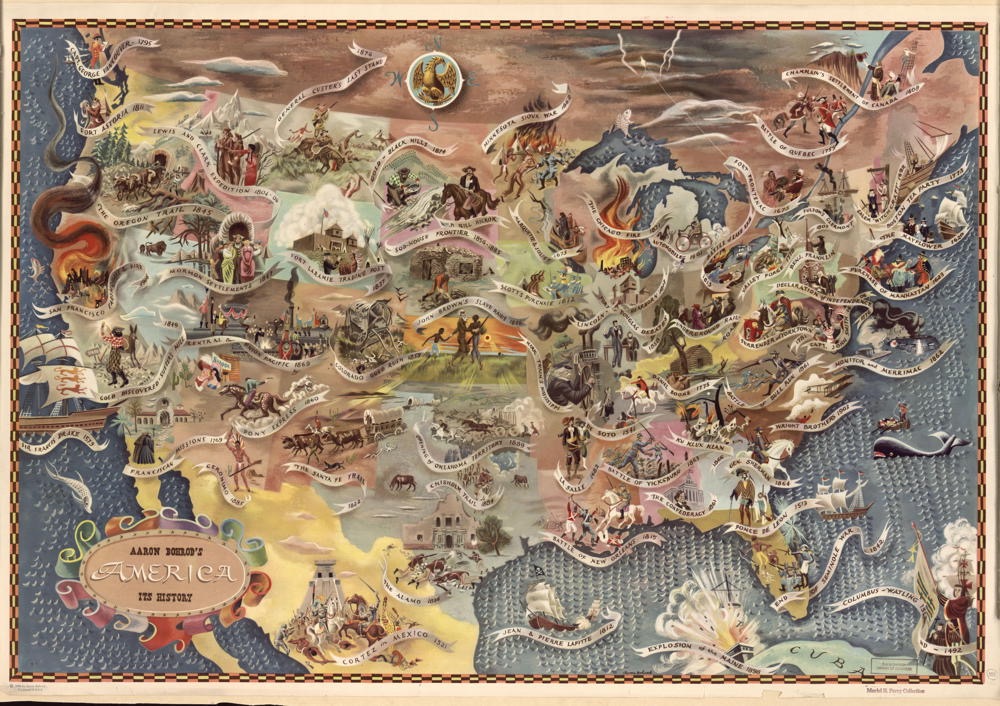
Aaron Bohrod's America, its history (1946)
"We shall overcome because the arc of the moral universe is long but it bends toward justice. "
–Dr. Martin Luther King Jr.,
“Remaining Awake Through a Great Revolution.”
Speech given at the National Cathedral,
March 31, 1968
" … thinking ourselves especially blessed."
The history of these United States records a definite Arcing trajectory. We do not do straight lines. Neither did our forebears. We sidle up to our futures and tend to wend away from our results. We move like drunken sailors inexorably toward our salvation, and we, probably above everything, firmly believe in our eventual salvation. Any half-baked efficiency expert could demonstrate the obvious errors in our ways, in our methods, but we seem unteachable, uninterested in straightforward pathways. We're so damned busy meandering that we can only ever see trees, rarely forest. We disagree about almost everything yet insist that we're somehow united, one nation under our multitudinous God, with aspiration enough for all. Liberty and justice might seem to be trailing ever further behind, but that's just an illusion, the result of our Arcing course, making it damnably difficult to precisely pinpoint our position on our path toward our sure salvation.
Democracy amounts to the ultimate faith-based initiative.
Discernment
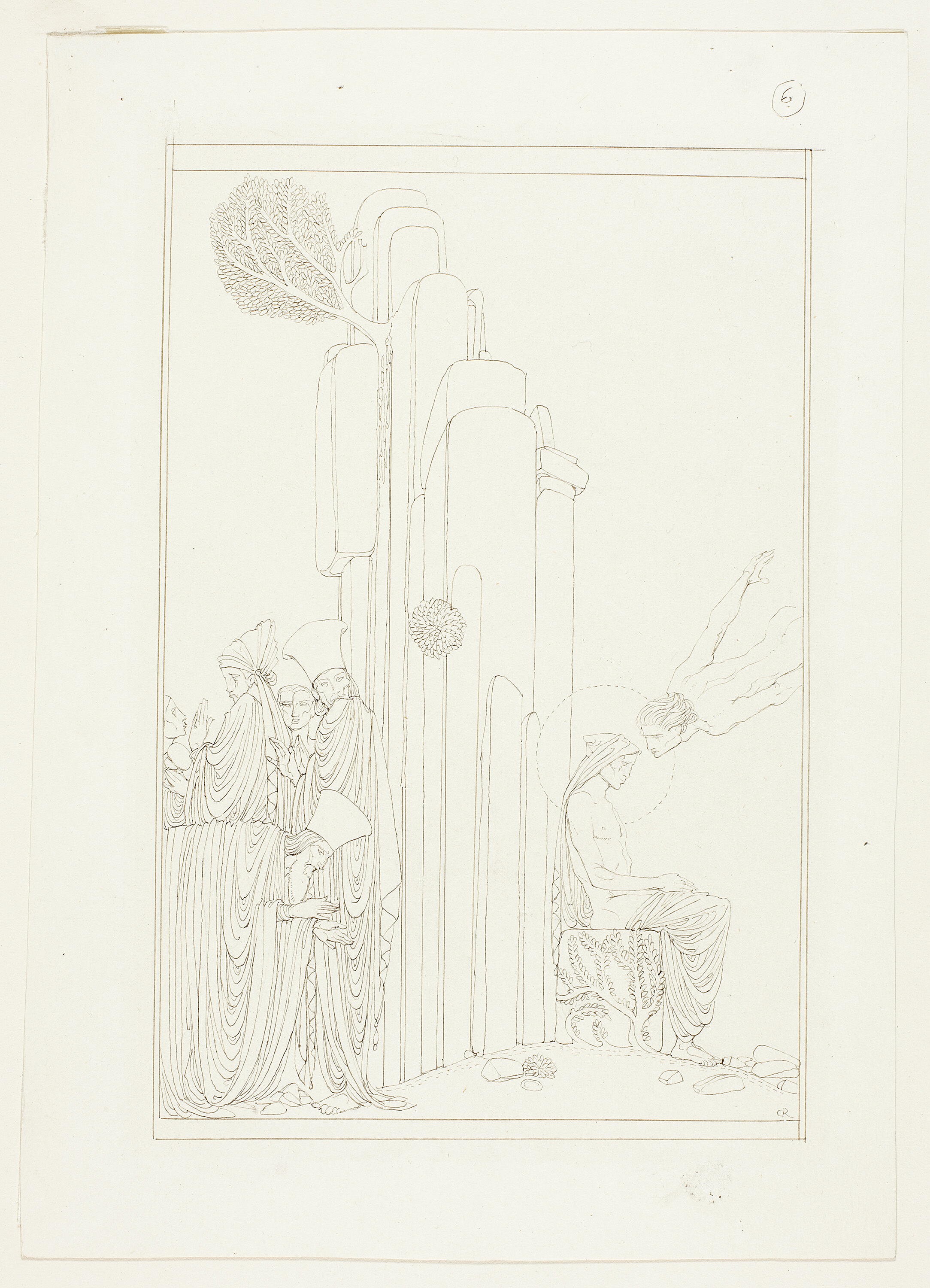
Charles Ricketts:
The Hermit; illustration for Oscar Wilde’s ‘
The Teacher of Wisdom’ (c. 1890–1924)
"Success and failure now come to me for definition."
Things look different after perspective's shifted. That innocuous statement doesn't quite cut the difference. Before, perspective amounted to a kind of blindness. However smug and self-important, my understanding was unavoidably misguided. It omitted the next insight and all the following ones. It amounted to the very best I could perceive then, but not all I would ever come to understand. I had no choice but to act upon what I could see and what I could comprehend. It would have been the same as screaming at sheep to expect me to perceive beyond what I could sense. The world I now inhabit made no sense a few short days ago. Now, my pasts should fade into ignorance.
Part of the Vanity Press relies upon a certain desperation on the part of its authors.
WritingSummary 06/29/2023
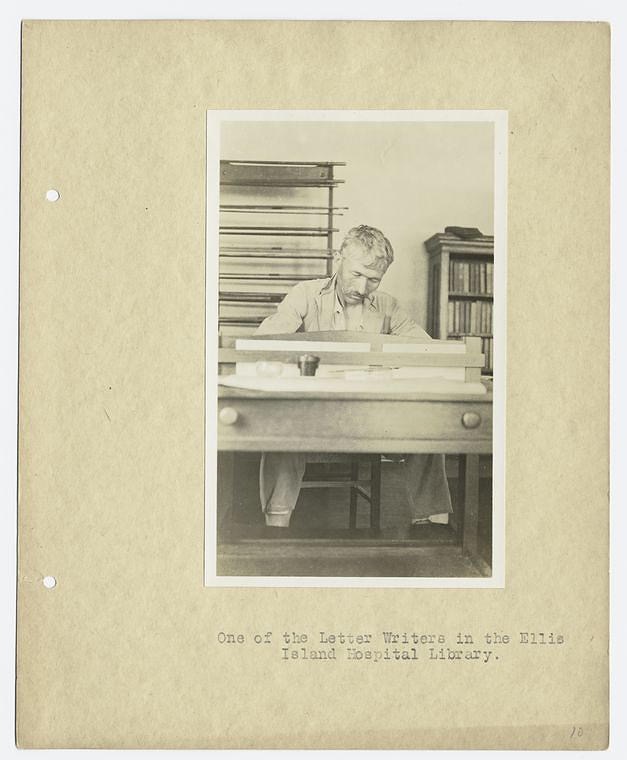
Percy Loom Sperr:
One of the letter writers in the
Ellis Island Hospital Library
(c. 1920s)
Considerably More Alive
I cannot over-emphasize the importance of this week's revelations. My Vanity story couldn't describe the depth of my discovery because I wrote it just as I noticed the shift starting. A few days later, I continue reeling, realizing I could become a proudly vain author. Vanity Publishing seems a pejorative term bestowed by its competition to demean it in the author's eyes. It delineates an elite by omission, a chosen few selected to represent a whole with a decided minority. It elevates the importance of gatekeepers and reputation as if follow-on success were necessarily the product of past performance when the future remains undecided until well after it’s past. I now feel embarrassed by my hesitation to fully engage with my gifts, however questionable, in favor of impatiently waiting for recognition that was always unlikely to arrive. I feel considerably more alive after this writing week. May this sensation continue and expand.
PerfectGame
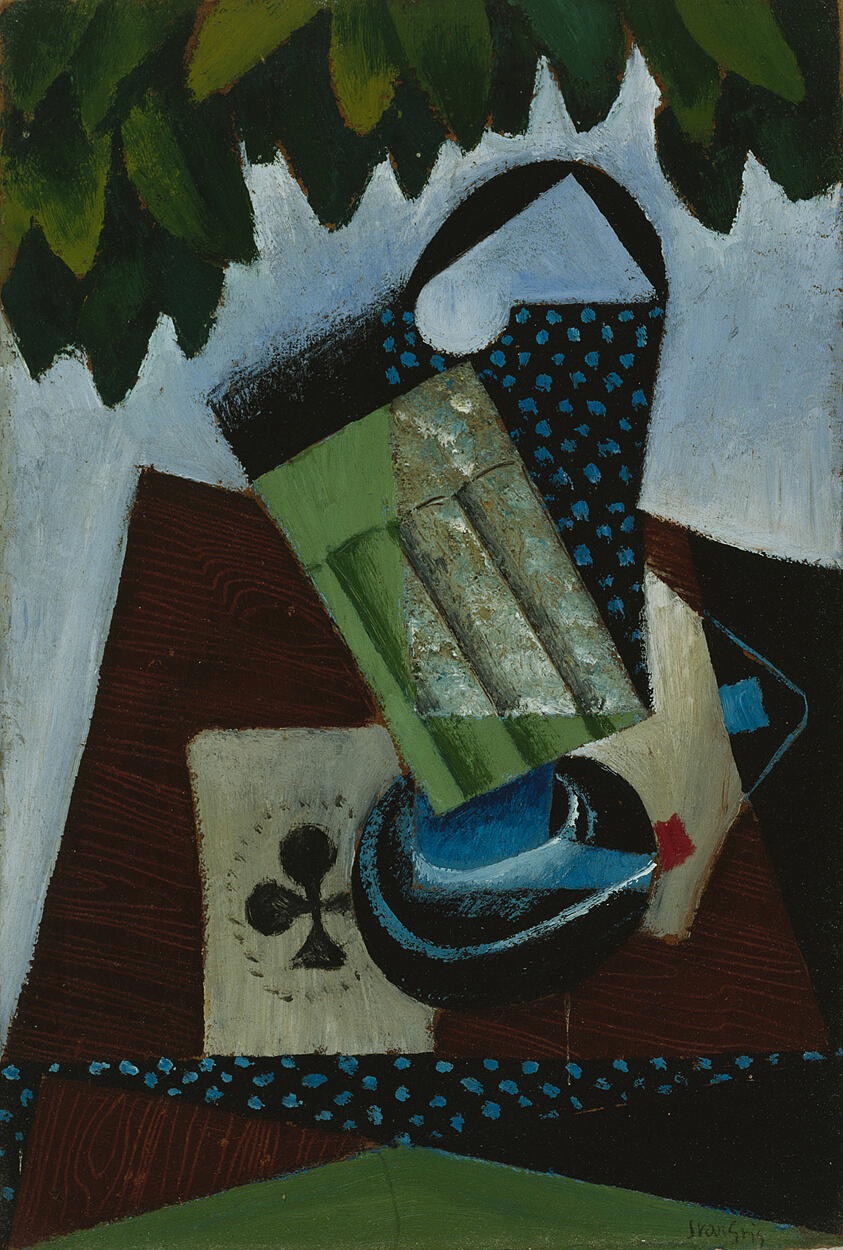
Juan Gris: Glass and Playing Cards (1915)
"Play ball, not perfection!"
"The 10 regular seasons in between (2013 through 2022) featured 22,765 imperfect games," wrote NYTimes sportswriter Tyler Kepner the morning after. A PerfectGame was pitched the evening before by Yankee's pitcher Domingo Germán, who fans booed off the mound his previous start. It had been eleven years since the last Major League Baseball PerfectGame. Only twenty-four have been accomplished in MLB's long history stretching back to the 1800s. The feat will not guarantee the pitcher Hall of Fame notoriety. If history's any predictor, he's much more likely to retire into obscurity. Perfection remains just what it used to be, without lasting honor, especially in its own land.
I Hone with the implicit notion that I am seeking more perfection.
Chronic

Duane Stephen Michals:
The Human Condition (1969)
"The Human Condition exclusively works in ways mysterious."
The Human Condition first seems acute and only later appears Chronic. There never was a cure for it, and though it at first seems passing—eminently overcomeable—it isn't. It never was. It seems more applicable to others than to you or me, but it belongs to everybody, though not necessarily equally. I acquire my aches and pains the same way as everybody. They visit, often without discernible reason, first acute, then, some of them becoming Chronic without rhyme or particular cause. The Chronic ones might settle in forever or seem to. My problem centers around my expectations. When I believe my pain's just visiting, I treat it as a guest. They might be my sensations, but I won't take them as seriously as if they were a permanent part of my extended family. Pain or Human Condition seems very much the same; we can reasonably anticipate them bedeviling us again and again and again.
My revelation yesterday transformed a long-standing acute condition into a Chronic one.
Vanity

Jan Saenredam after Abraham Bloemaert, published by Robert de Baudous:
Vanity, Vanity, All is Vanity (c. 1600)
"Vanity of vanities, saith the Preacher,
vanity of vanities; all is vanity.
What profit hath a man of all his labour
which he taketh under the sun?
One generation passeth away,
and another generation cometh:
but the earth abideth for ever."
Ecclesiastes 1:2-8 King James Version
I have for years danced against the idea that I might work with a "vanity" publisher. The vanity press represents that part of the publishing world where an author contracts with a service bureau to do all a standard publisher might do. These tasks include: registering a work and securing an ISBN—a unique registration number assigned to each edition of a published work, designing format and layout, cover design, production, and placement, among many other possible services, paid for up front by the author. The mythology of authorship insists it's humiliating to work with a vanity publisher because a real author should properly be discovered and pampered into print by a benevolent publisher who fronts the resources necessary to produce the work. In the myth, the publisher more than recoups their investment from the resulting widespread acceptance. Each new title is always destined to become a best-seller, and every author produces well above average sales.
In practice, many fewer than one percent of published works recoup their production cost.
Blindly
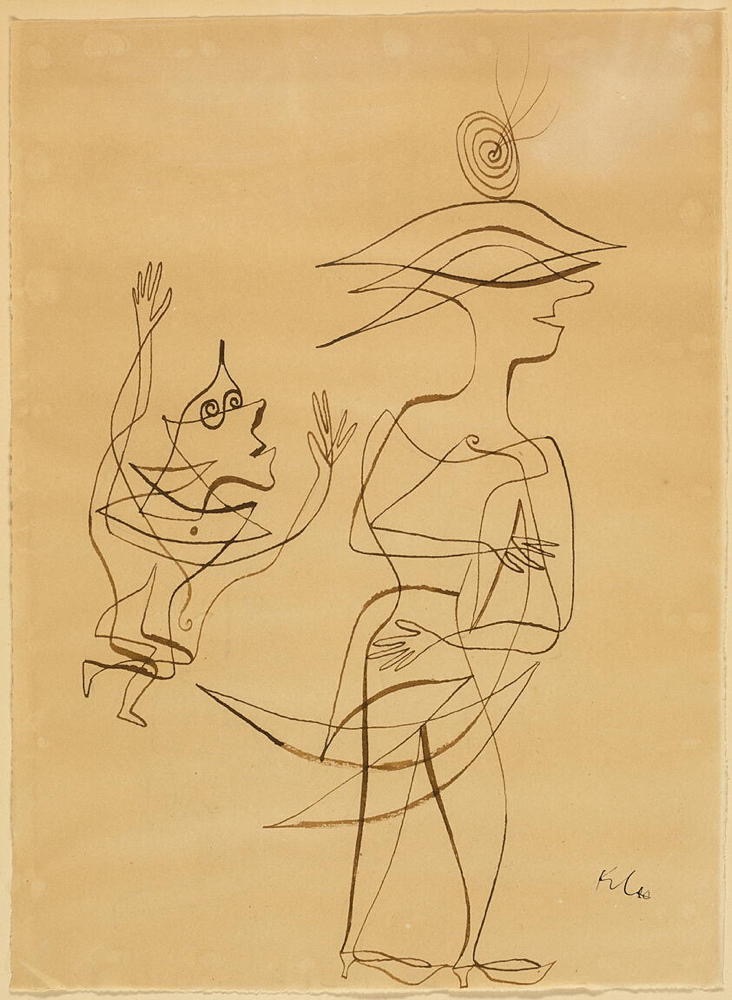
Paul Klee:
Follows with Concern, As Both are Blind (1927)
"… I'm unlikely to really understand how or why."
I might say that I resolved my hash mark issue, but that would, at best, be a partial truth. The issue was resolved, and yes, I was involved, but it would be a stretch to claim that the resolution was my fault. As I explained in earlier installments—ArrowingThrough and StrategicHesitation—I'd received hints and instructions from fellow users of my manuscripting app, though they didn't immediately resolve my issue. Five tries had left my situation worse and me increasingly frantic. I'd decided to give it a rest, resolving to stand aside and leave that sleeping dog lie for a day before making a sixth attempt to fix anything. The lag time worked, for my sixth attempt resolved the issue, though I cannot definitively say why. I did what I'd intended to do the first five times, but only that last attempt worked. I'm left no wiser and, if anything, more hesitant to engage in further Honing efforts. The headings seem slightly too small, but I'm more inclined to leave them as they are since my earlier efforts had somehow made them disappear.
I Hone after some ideal, often just a notion of what might be possible, essentially Blindly.
Insignificant Increments

Alberto Giacometti: Le Buffet (1957)
" … grown to annoying dominance …"
Honing work—and perhaps all work—exclusively occurs in InsignificantIncrements. Each piece initially reeks of insignificance and even accumulated into bunches, rarely seeming like very much. My Weekly Writing Summaries, which I push out early every Friday morning, sometimes seem to approach significance. Still, even those seem comprised of more grunt work than any casual reader might suspect. I've come to dread Thursdays, the end of my writing week, because they always bring this obligation which I swear is sacred but the creation of which most often feels perversely secular. I buck up and perform my work as if it might eventually prove meaningful, though I also compose it exclusively in InsignificantIncrements. Any thought I might be up to anything grandiose fails to pass my Smell Test.
Once I manage to accumulate ninety of my stories into manuscripts, I once thought those might rise to some level of significance, but those, too, prove to be stunningly banal in creation.
StrategicHesitating
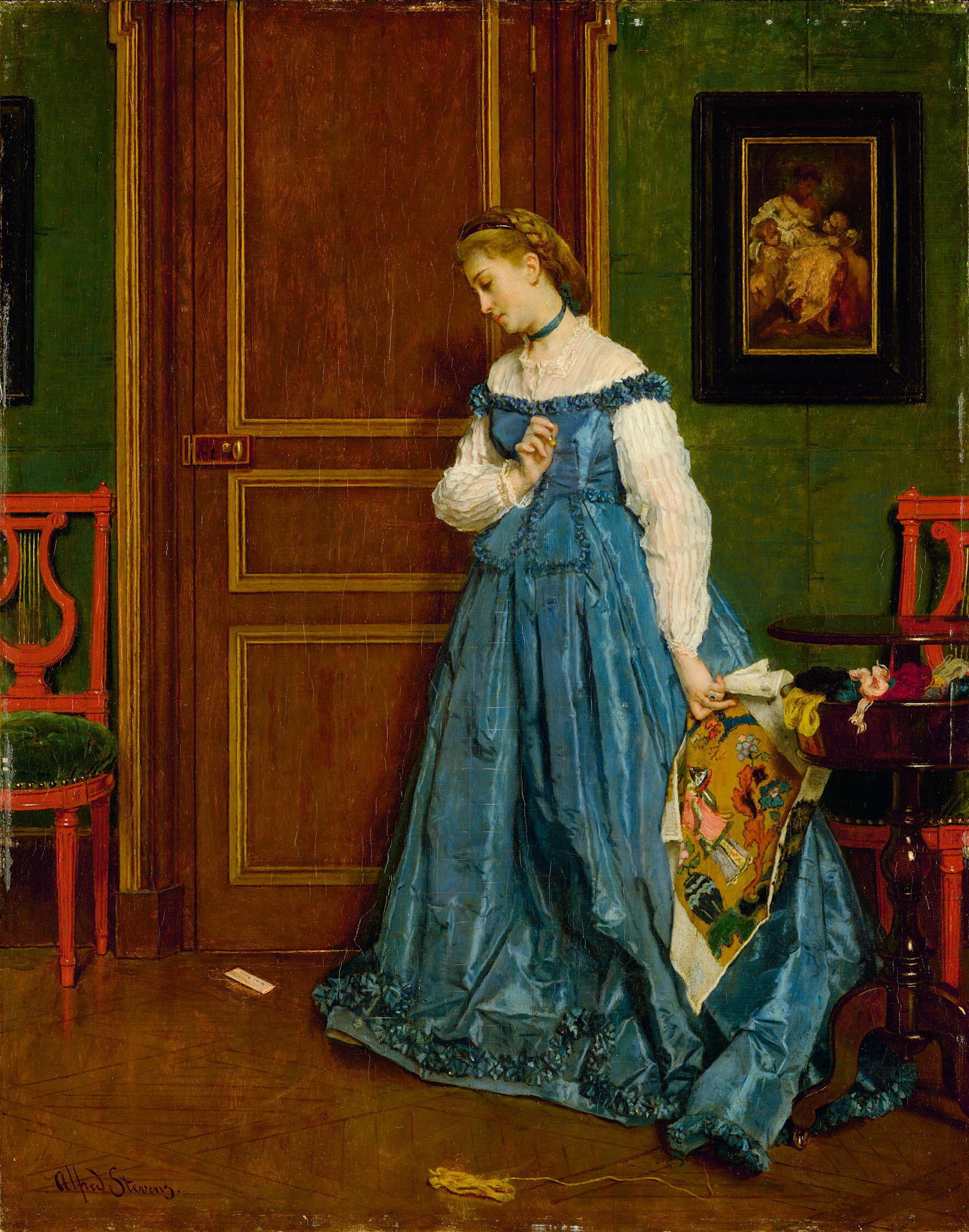
Alfred Stevens: Hesitation (Madame Monteaux?) (c. 1867)
" … obscured in utter ignorance.#
#
After receiving the fifth follow-up advice for fixing my hash mark difficulty, I engaged in StrategicHesitating. I rarely immediately follow up on any instruction. I ruminate on it first. I was not interested in a quick fix, for in my experience, quick fixes tend to encourage downward spirals where I end up in deeper and more mysterious trouble than I had before I'd asked for assistance. I need to circle the solution first. As I did in this instance, I will pretend to implement the fix, accessing the seemingly appropriate pages but not saving any adjustments. I wanted to determine what would happen if I saved the changes without exposing myself to the risk of actually changing them. I still didn't know what I was doing, but instead considered following essentially blind instructions. It's not that I didn't trust the advice, either, just that I was confident that I didn't understand the whole of it. I needed further orientation.
#
StragegicHesitating seems like a small investment.
ArrowingThrough
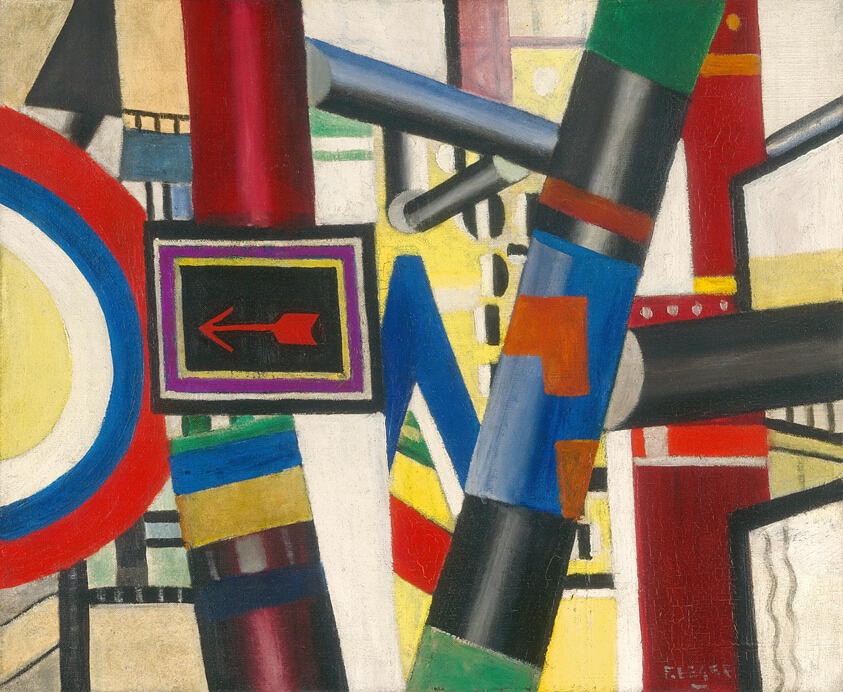
Fernand Léger:
The Railway Crossing (Sketch) (1919)
" … colleagues who don't quite understand why I don't quite understand."
Filled with the resolution of a new series, I chose to report what appeared to be a bug with my manuscripting system. I often work around shortcomings with software because I've been run around the block enough to understand that I'm probably misusing the system. Its keepers do not always warmly receive my reports. They often blame the messenger. Not that this messenger was ever necessarily blameless, mind you, but the interactions can feel abusive and are not always conducive to progress. Most of the systems I use feature areas where I, by experience or habit, refuse to go. I've learned that some functions work for others but not for me. I've grown to understand that I very likely misuse every system I employ, not just because they were seemingly designed backward, though most were. I cannot recall one I've used that was designed forward.
So, it was with circumspection that I reported this shortcoming.
WritingSummary 06/22/2023

Attributed to Elisabetta Sirani:
Young Woman Writing or Drawing
(n.d. - mid-17th Century)
Now Is The Time
There's nothing else like the enthusiasm accompanying a New Beginning. Old beginnings seem materially different because we've already traveled those routes before. The New Beginnings involve different paths and destinations, so not even our best imaginations can properly set expectations. I dream big then as if precedent were meaningless and everything might be different this time. There will be space to relearn that space and time remain relatively unchanged regardless of the charted path. We remain denizens of the same neighborhood regardless of where we travel. A new series, though, opens many doors. I already perceive my usual routine as different. I'm focusing on other things than I attended to when writing my Publishing Series. Honing might allow me to implement lasting improvements, which might even make my life a little easier. I've already created a little template that might allow me to avoid ten minutes of typing each morning. This after doing the alternative only about twenty-one hundred times. New Beginnings insist that now is the time, and so it is.
FineTuning
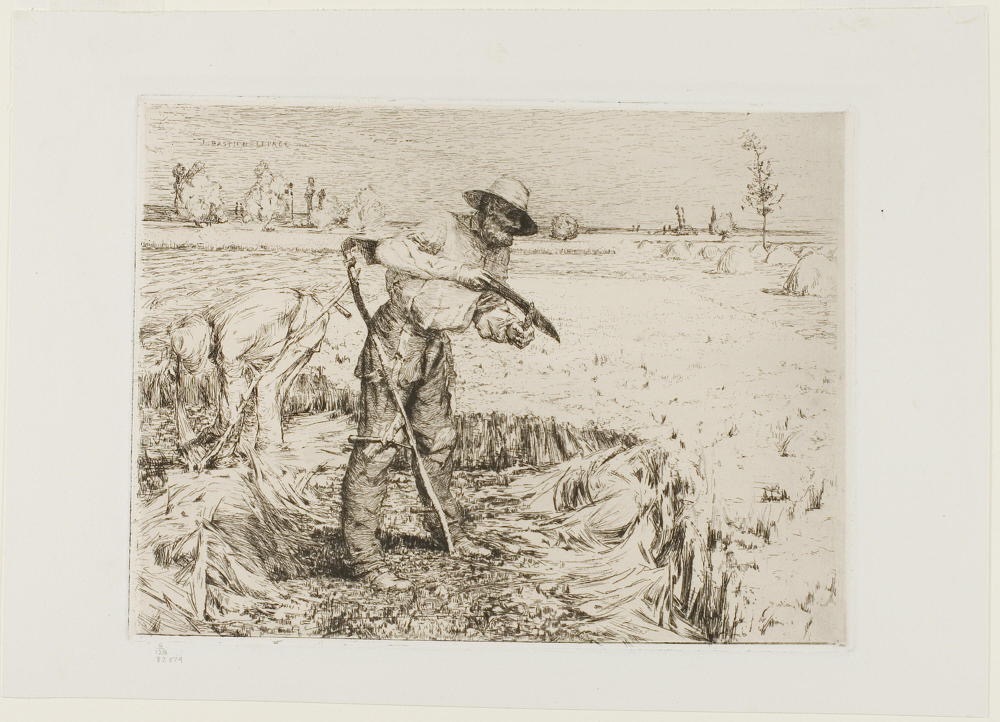
Jules Bastien-Lepage:
Mower Honing a Scythe (1878)
I woke feeling ill at ease on this first full day of Summer. I finished my Publishing series yesterday and finished reading the manuscript I'd created in the background of writing that series by midafternoon. I had yet to decide whether to continue creating a new series this morning or take an extended break to try my hand at something else for a change. The world seemed more disconnected than usual in the predawn darkness. The cats noticed that the rhythm of my morning routine had been broken. We ached together for its return. There was no more obvious cure than simply starting another series, but what topic?
I looked back at my last few series: Authoring, Reconning, Againing, SetTheory, Success, and Publishing, wondering what might serve as a natural next in the progression.
OverThinking

Edvard Munch: Attraction I (1896)
" … necessary for me to get begun and then get through anything to done."
I wonder if I OverThink as much as I think I do. It's true, I do often think my way through an anticipated action two, three, four, and often even many more times before I take action, and even then, I might opt to take no action at all (yet). I consider my scrutiny prudent, though not everyone would agree. How many thought experiments must a standard ketchup bottle survive before it's set aside as too complicated to open yet?
I seem to have been born to run on intuition, yet I blunt my native sort of 20/20 vision with dump truckloads of conflating cognition.


